









Catherine Haughney, editor of Reader’s Digest, welcomes you to the February issue
Tell us what you think of this issue: theeditor@readersdigest.co.uk


Like us on Facebook: facebook.com/readersdigestuk
Follow us on twitter: twitter.com/rdigest
february 2013 features

“A crystal ball in my 20s would have told me to invest in fine wine, a beach hut and a split-screen camper van,” says journalist Sarah Jagger. “But hopefully my smurf collection will pay off!”

“Some people talk about what they want in life, while others just do it,” observes writer Ruth Addicott “Adventurer Paula Reid is an inspiration.”

“Sales of perfume are more buoyant than ever,” claims socialaffairs commentator Lois Rogers. “And the idea of personalised scents to make us all irresistable is very exciting indeed.” samfrostphotos.com

The
1 february 2013 readersdigest.co.uk 32 Reasons to Be Cheerful, Part 27 James Brown embraces the conveniences of the modern world 36 The Nation’s Sweetheart Gold medallist and CBE Jessica Ennis on love, life and lazing about 42 Staying Creative for Life Why it’s never too late to make your mark 48 Best of British: Cheeses When it comes to the smelly stuff, we beat the French at their own game 56 In It Together How new types of communities are springing up all over Britain 64 Clare Balding: “I Remember” The presenter whose enthusiasm lit up our Olympics coverage reflects on failures and good fortune 70 Is a Pension Worth It? To find out, we put retirement funds head to head with eight other types of investment 76 A Life Less Ordinary: Kicking the Bucket List Got a secret list of things you want to do before you die? Just do them, says adventurer Paula Reid 84 Scents and Sensibility Lifting the lid on the weird and wonderful world of perfume 90 The Maverick: “Springsteen Has a Voice Like a Sea Lion” Our
of
identify a
cows ripe for slaying 94 Travel Special: My Best Holiday Ever Readers and well-known travellers share their
memories
panel
experts
few sacred
holiday
Stories featured on the cover are shown in red
close community of Springhill—see p56
WeLCOMe reGuLars

We’re really feeling the love this month. Firstly, with our cover star, the nation’s official sweetheart Jessica Ennis—not just because she was such an outstanding Olympian, but also because she’s proved to a whole generation of girls that being healthy and strong is much more attractive than being eating-disorder thin or fat.
Then, on p56, we investigate some inspiring communities that have sprung up around the shared love of anything from peaceful gardens to the Wild West.




And I’m sending out my own feel-good vibes, too, to thank the Digest team for all their fantastic support during my time as editor. I’m off to pastures new, so am handing over to our hugely able Managing Editor Catherine Haughney. I only hope you’ve enjoyed reading the magazine as much as I’ve enjoyed editing it!

2 READERSDIGEST.CO.UK FEBRUARY 2013
Reader’s Digest the World’s Biggest Magazine published in 50 editions in 21 languages On our cover: Jessica Ennis/ The Times/NI Syndication Gill Hudson theeditor@readersdigest.co.uk facebook.com/readersdigestuk twitter.com/rdigest CONSUMER MEDIA EDITOR OF THE YEAR 2011 WINNER OF THE MARK BOXER AWARD 2011 ...at the front 9 Over to You… 13 Radar: Your Guide to February 19 You Couldn’t Make It Up… 23 Word Power 26 In the Future… 28 Instant Expert 30 If I Ruled the World: Alex Polizzi ...at the back 104 1,001 Things Everyone Should Know 110 Medicine: Max Pemberton 112 Health: Susannah Hickling 116 Beauty: Alice Hart-Davis 118 Consumer: Donal MacIntyre 120 Money: Jasmine Birtles 124 Fast Food: Mark Greenaway 126 Drink: Nigel Barden 128 Gardening: Bob Flowerdew 130 Wildlife: Martin Hughes-Games 132 Online: Martha Lane Fox 134 Motoring: Conor McNicholas 136 Travel: Kate Pettifer 141 The Reader’s Digest— our recommended reads of the month 149 Books That Changed My Life: Maggie O’Farrell 152 Test-Your-Knowledge Crossword 153 Teatime Puzzles 154 Laugh! 158 Beat the Cartoonist








WRITE ON…
Send us your stories, jokes and letters—if we publish, we pay!
WE PAY
£50 for the star letter, £30 for regular letters and £15 for short extracts.
SMALL PRINT SUBSCRIBE!
Ensure submissions are not previously published. Include your name, email, address and daytime phone number with all correspondence. We may edit letters and use them in all print and electronic media. Contributions used become world copyright of Vivat Direct Ltd (t/a Reader’s Digest).
WE ALSO PAY SORRY!
Email readersletters@ readersdigest.co.uk or write to Readers’ Letters, Reader’s Digest, 157 Edgware Road, London W2 2HR £70 for the true stories, anecdotes, jokes in Laugh! and You Couldn’t Make It Up…, and contributions to end-of-article fillers, Travel and Gardening.
Email excerpts@ readersdigest.co.uk or write to Excerpts, Reader’s Digest, 157 Edgware Road, London W2 2HR
We cannot acknowledge or return unpublished items or unsolicited article-length manuscripts. Do not send SAEs. Article-length stories, poetry and cartoons are not requested.


Visit readersdigest.co.uk or write to Reader’s Digest, PO Box 444, Douglas, Isle of Man IM99 3ZF. UK: £42 a year. Republic of Ireland: €74.39 a year. Europe: £50 a year. Rest of the world: £60 a year. Prices include delivery. For Gift Subscriptions contact Customer Services below
CUSTOMER SERVICES
“They keep bringing out new ones with extra blades…”


Contact Customer Services for renewals, gifts, address changes, payments, account information and all other enquiries. Phone: 0871 351 1000 (Calls from a BT landline will cost 10p a minute. Call costs from other providers may vary.)


Email: customer_service@ readersdigest.co.uk
Minicom: 0870 600 1153.
TALKING MAGAZINES
Reader’s Digest is available in a talking edition for blind and partially sighted people for £16. For details, phone: 01435 866 102; email: info@tnauk.org.uk, website: tnauk.org.uk.
twitter.com/rdigest facebook.com/ readersdigestuk
4 READERSDIGEST.CO.UK FEBRUARY 2013



















Online this month…

IT’S NEVER TOO LATE
Do you love to tell a joke? Wind your mates up with mini-routines? Don’t confine your talents to the pub! We’re looking for a budding stand-up, aged 50 or over, to prove that it’s never too late to pursue a comedy career. To enter our competition, perform a short section (maximum two minutes) of your best material to video camera and upload your clip to YouTube. Send a link to your video to excerpts@ readersdigest.co.uk by Friday, February 22. The funniest entry will be awarded £250! For full terms and conditions, visit readersdigest.co.uk/ magazine



iBookstore and Kobo.
6 © 2012 Vivat Direct Ltd (t/a Reader’s Digest). British Reader’s Digest is published by Vivat Direct Ltd, 157 Edgware Road, London W2 2HR. All rights reserved throughout the world. Reproduction in any manner, in whole or part, in English or other languages, is prohibited. Reader’s Digest is a trademark owned and under license from The Reader’s Digest Association, Inc and is registered with the United States Patent and Trademark O ce. All rights reserved. Cover and advertising reproduction by FMG. Classified advertising by Madison Bell. Printed by Polestar Chantry, Polestar UK Print Ltd. Newstrade distribution by Advantage. PUBLISHED BY VIVAT DIRECT LTD (T/A READER’S DIGEST), 157 EDGWARE ROAD, LONDON W2 2HR PAPER FROM SUSTAINABLE FORESTS. PLEASE RECYCLE
APPS, TOO!
music
Google Play
Follow us at twitter.com/rdigest. Like us at facebook com/readersdigestuk THE READER’S DIGEST ASSOCIATION INC President and Chief Executive O cer ROBERT E GUTH Vice President, Chief Operating O cer, International BRIAN KENNEDY Editor-in-chief, International Magazines RAIMO MOYSA EDITORIAL Editor-in-Chief GILL HUDSON Managing Editor CATHERINE HAUGHNEY Design Director MARTIN COLYER Features Editor SIMON HEMELRYK Deputy Production Editor TOM BROWNE Assistant Features Editor ELLIE ROSE Art Editor HUGH KYLE Picture Researcher ROBERTA MITCHELL Contributing Editors SUSANNAH HICKLING (Health) CAROLINE HUTTON HARRY MOUNT JAMES WALTON LOLA BORG ADVERTISING Head of Advertising Sales ADRIAN MILNER Account Directors SIMON FULTON JIGS PANKHANIA Account Manager SUZANNE SMITH MARKETING Subscriptions Marketing Manager
GREENWOOD MANAGING DIRECTOR EDWARD KNIGHTON
@READERSDIGEST.CO.UK CHECK OUT OUR FABULOUS
Go to the iTunes
store,
Store and Amazon to download our magazine app. You’ll also find our ebooks in the
JAMES
£250!Win JUSTIN SULLIVAN/GETTY IMAGES














over to you...
emails, letters, tweets and facebook
£30 for EacH puBliSHED lEttEr, £15 for SHortEr ExtractS, £50 for tHE lEttEr of tHE montH!
SEE p4 for morE DEtailS
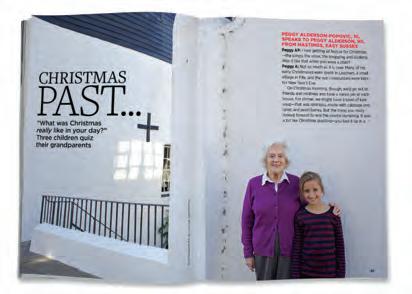
Letter of the Month
After reading “Christmas Past, Christmas Future”, in which three children interviewed their grandparents about childhood Christmases, I decided to do the same with the older generation of my family—I’ve always been interested in finding out about their early lives.
My mother was born and grew up in India. As a Christian family in a Hindu country, they only went to mass when they lived near enough to a church. Christmas Day was celebrated with family and friends, with duck curry for lunch and roast goose in the evening. They played games such as carom, draughts, and three, five, seven—a game that was a bit like bridge, but for three people. My mum’s first tree was made out of paper by one of her neighbours.
Other family members are chipping in with their memories of past Christmases, too. My children’s remaining great-grandmother is writing up the story of being evacuated during the war, and the rest of my extended family have also promised to make notes.
Susannah Harrison, Brighton
simon says…
I was delighted to read in “If I Ruled the World” that Simon Jenkins feels practical life skills such as public speaking should be part of the curriculum. I’d add that our children should be involved in this kind of confidence-building activity from an early age.
As a governor of our local first school, I volunteered to organise a debate for the Year 4 class of 8- to 9-year-olds. The children were given the motion “Homework is a good thing”, and their enthusiasm was truly amazing. Everybody wanted to contribute, and the class teacher was delighted that one or two kids who were normally shy in class joined in. Even better, the vote came out in favour of homework!
Eric Bevan, Dorset
Simon Jenkins says he’d stop building on green space. I agree with that, but there are exceptions. I applied for planning permission for a two-bedroom bungalow for my parents on my two-acre field, and was turned down because it was a “green belt” area. I accepted this, but at the same time—one mile down the road—a huge, ugly estate was built on green
►
9 february 2013 readersdigest.co.uk
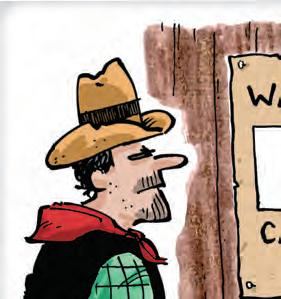

fields. To make matters worse, the buildings were demolished ten years later!
Stephan Bryn, liverpool
Traffic lights are an inefficient way of enabling road users to get around, according to Simon Jenkins. But he doesn’t offer an alternative. Surely he’s not suggesting that we should rely on common sense and courtesy? There doesn’t seem to be much of either on the roads I travel! Without traffic lights, there would be chaos. Plenty of people act as if the lights aren’t there anyway. I hope Simon isn’t one of them. tracy Davidson, Warwickshire
disney dreams
I really enjoyed “Whistle While You Work”, your article about Walt Disney. It brought back memories of the holidays we
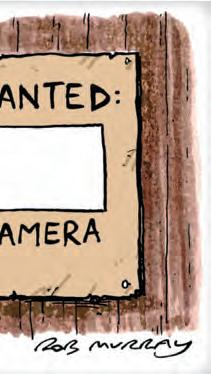

had in Disneyworld, Florida, when our daughter was young. It’s a magical place, which delights and enchants both children and adults in equal measure.
The overriding feeling when you leave is that this isn’t how the world is—but it’s how the world ought to be!
Valerie richards, Glasgow
stUdent daZe
Reading “Excess All Areas” in the Consumer section, I admit that Donal MacIntyre has a point about mobilephone insurance. He worked out that what he spent with the insurers and lost through excess on the policy amounted to the cost of a new phone. On the other hand, I have a student son who regularly loses his mobile—insurance is a godsend for people like him,

“CoMe again?”
● “…It’s a fact that survival of the fittest is more prominent in everyday life. The meek and the mild won’t survive. If you’re surplus to requirements, prepare to be erased…”
● “…I wonder if many readers do as I do when reading a book —start, continue for four or five chapters, turn to the back page to see the ending, then return to chapter five to continue and enjoy the story. I always do that…”
● “…If they possessed a sex, I feel sure that the bookmark would be female. I say this because the average bookmark seems to be at its most elusive when taken to bed…”
● “…Contained within a pack of lies/Lies nothing but the truth/ Industrial giant playpens/The catacombs of youth…” [That was the whole email]
● “…I jumped over and grabbed John Fountain and started to shout the words KILL KILL…”
10 readersdigest.co.uk february 2013
ILLUSTRATED BY SAM FALCONER
because they can claim more than once in a two-year period. anna Hammett, cheshire
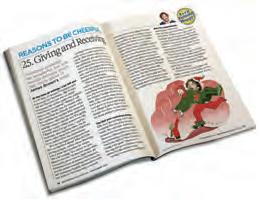
the joy of giving
Reader’s Digest is famous for printing useful and informative articles, but this time you’ve surpassed yourself!
I used to send Christmas cards to all my friends, and got none in return. I’d decided not to send any this time, until I read “Reasons to Be Cheerful, Part 25”—James Brown has persuaded me to give and not expect anything back.
Sukhdev Sandhu, Hampshire
oxalates in excess
Susannah Hickling says in her Health column that eating more oxalates will help prevent
a recurrence of kidney stones. But the “stones” are actually calcium oxalate crystals caused by excess blood calcium reacting with oxalic acid in foods such as strawberries, rhubarb and parsley. So recommending strawberries in the diet is surely wrong. peter nisbet, by email
RD: Apologies for this error. We meant to say that kidney stones were less likely to return if you eat more wholegrains and veg “and fewer oxalates”.
love rediscovered
On Valentine’s Day four years ago, I felt very low. Widowed after 47 years, I signed up for online dating, despite warnings. After ten or so non-productive dates, I met a lovely lady, also widowed. We talk, we walk, we laugh, we dance, and we play the Reader’s Digest Word Power game! We were married in August. My advice? Go for it! Life is for living at any age. Derry Jones, north Yorkshire
tweet of the month

peacelovenoise Bjorn Chua
Whoever comes out with the jokes in @rdigest, kudos to them! Very funny LOL.

you’re stiLL taLking about…
our “Keep Britain Happy” campaign, and your tips for feeling cheerful
● I keep a notebook in my handbag and jot down things that make me smile. It makes me more alert to spotting the good moments. pat metcalfe, Derbyshire
● My tip is to sing along to songs in the car. You feel great when you get to work!
Sylvia franklin, Staffordshire
● I try to stand up straight. Having good posture has made me feel far more confident when facing challenges. pauline carroll, aberdeen
● The days can be rather bleak at this time of year, but I like to see rain in a positive light—it’s what makes Britain such a beautiful and lush country!
Joanna reilly, lancashire
11 february 2013 readersdigest.co.uk




































































r a d ar your short, sharp guide to February
Film
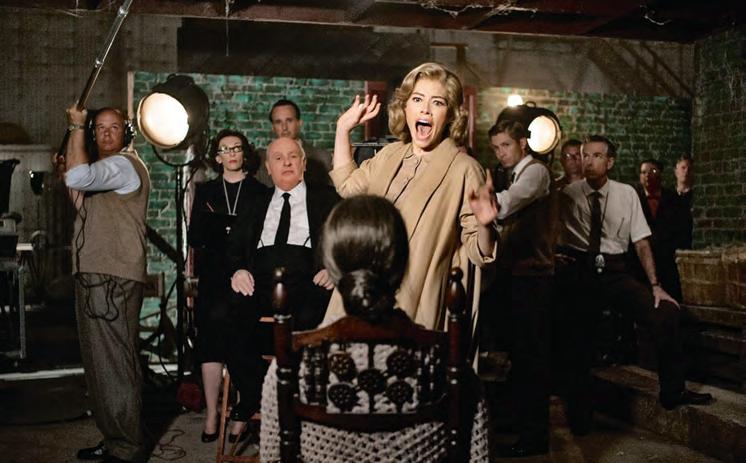

Author and BBC2 Review
Show critic Natalie Haynes on the new releases
in cinemas
Hitchcock When Alfred Hitchcock decided to make Psycho, the film of the Robert Bloch novel, no Hollywood studio would touch it. Horror movies weren’t taken seriously, and nor (as he believed in his darker moments) was Hitch.
This behind-the-scenes peek at the troubled production of one of the director’s great movies is a treat: funny and knowing. Taking on such an iconic figure
Janet Leigh (Scarlett Johansson) makes a nasty discovery in Psycho
is a big ask for most actors— but not Anthony Hopkins, who always plays real people (from Picasso to Nixon) so uncannily well. He captures Hitchcock’s voice and mannerisms
perfectly, while Helen Mirren is predictably great as Alma, his long-suffering wife.

A Liar’s Autobiography
Graham Chapman (far left) was probably my favourite Python, and certainly the best actor. Yet he was a complex
13
►
man: openly gay, but a closet alcoholic—drinking four pints of gin a day. Based on his book of the same name, this animated fairground ride is clever, scabrous, funny and moving. It covers Chapman’s life, but there’s also a hefty dash of Pythonesque lunacy and a superb array of guest stars. Who but the Pythons would ask Cameron Diaz to provide the voice of Sigmund Freud?

dVds
Ballroom Dancer
Get a Strictly fix with this doc about a former champion making a comeback.
Anna Karenina Lush adaptation reuniting Keira Knightley with Pride & Prejudice director Joe Wright.
gadgets

Fitbug Air, £24.99 (plus £2.99 monthly subscription)
Another year, another gym membership abandoned under boxes of wine and chocolate.

Technology expert and Answer Me This! podcaster Olly Mann reveals the latest must-haves
Sound familiar? Try Fitbug, a Bluetooth-connected fitness tracker that slips into your pocket and tots up your daily exercise tally, even when you’re just stumbling back from the pub. Syncing wirelessly with your iPhone or iPad (a Samsung version is promised soon), it “coaches” you towards realistic targets to make you well fit, innit.
Epson Workforce

DS-30, £126 In these days of social-media sharing and digital photography, big boxy scanners seem as relevant as floppy disk holders or fax machines. Yet there are still plenty of old photos about the house to digitise. This mobile scanner is narrower than a Coke can, a little wider than a sheet of A4, and weighs just 325g, yet has a resolution of 600dpi. When you’re done, just undock it and stick it in your desk drawer. Ace.



and cHecK OUT…
60SecondReviews. com, £4.99 a year High-quality video critiques delivered to your smartphone, featuring professional assessments of new films, books, wines and restaurants.
Blue Microphones Tiki, £60 The Fonz would no doubt dig this retro-styled noise-cancelling mic that connects to your netbook’s USB port for pin-sharp videocalls.

14
a d ar
r
◄ READERSDIGEST.CO.UK FEBRUARY 2013

Music


BBC 6 Music’s Stuart Maconie’s pick of the recent releases
Electric by Richard Thompson
Think the Neil Young of Merrie England. From his early work with Fairport Convention, through his dazzling 1970s albums with ex-wife Linda, to this vibrant new collection, Richard Thompson is the Don where folk rock is concerned. Although he lives in LA (where he coaches a junior football team), there’s something very British about his lyrical guitar style and the bucolic rasp in his voice. This is a record humming with vitality and edge, and shows his passion undimmed ahead of his first major UK tour for some time.
The Deserters by Rachel Zeffira
Michael Nyman. Zeffira is a classically trained Canadian musician, whose work in the duo Cat’s Eyes (with The Horrors’ Faris Badwan) and diaphanous sexiness have made her an NME pin-up. There’s a lot of this sort of stuff about—gauzy chamber pop from breathy young women —but what sets this apart is Zeffira’s class. Her music swirls in a mist of harps, strings and woodwind, but at its heart is a trenchant melodicism. Really rather gorgeous.

The Messenger by Johnny Marr

Think Florence, meet Enya; Enya, meet Kate Bush and ►
Think the Clapton of indie. Johnny Marr’s justly titanic reputation rests largely on the work done in his early 20s with The Smiths. Such was its brilliance and enduring glory that he’s probably the most significant guitarist of his generation. But since then he’s been an enigmatic, exasperating gun for hire. The Messenger is his first solo album under his own name. Initial listens reveal, as you’d imagine, that guitar is to the fore, with powerful songs possessed of a steeledged urban melancholy and sheen.
15 FEBRUARY 2013 READERSDIGEST.CO.UK

ICC Women’s World Cup cricket, India, February 1–17
In a universe riddled with uncertainty, Charlotte Edwards’ England defend their title in one of international sport’s most comfortingly predictable tournaments. England and Australia have won eight of the nine previous titles between them, and only twice has another team even reached the final. But the host nation will be looking to the world’s number one batswoman Mithali Raj to help break the Anglo-Antipodean hegemony.
Africa Cup of Nations final, Johannesburg, February 10
This culmination of a month of football has, on the last four occasions, produced a
England captain Charlotte Edwards hits out

Dawn Stewart, 43, dog groomer
WatChiNg: River City (BBC Scotland)



ESPNcricinfo cricket blogger, broadcaster and stand-up Andy Zaltzman previews the best of the month’s action

pulse-deadening total of two goals at a spine-detingling rate of one net-rippler every 210 minutes. Excluding injury time. So this will almost certainly be a grindingly tedious game.
However, Didier Drogba’s Ivory Coast are favourites to reach the final and land what would be a first title since Neil Kinnock still excitedly arranged his Alphabetti Spaghetti to spell the words “Future Prime Minister”. Atlantic Ocean fans will be rooting for Cape Verde, the tiny island nation that’s qualified for the first time. aLso
February 9–March 3 Brighton Science Festival. February 10 National Toy Collectors’ Fair, NEC, Birmingham. February 11–17 Random Acts of Kindness Week.
This soap, set in Glasgow, is much grittier and more realistic than the likes of Emmerdale.
ListeNiNg: American Soul, Mick Hucknall.
I’ve always loved him. His version of “That’s How Strong My Love Is” is great.
oNLiNe:
scotlandspeople. gov.uk An ancestral site where the content is free. I’ve traced my husband Norman’s family all the way to Ohio.
readiNg:
Hostage by Paul and Rachel Chandler. An account of the couple’s kidnap by Somali pirates. It’s a love story, really —they’d rather die than be apart. ■
16 READERSDIGEST.CO.UK FEBRUARY 2013
reader radar
oN our radar
sport
r a d ar GETTY IMAGES





YOU COULDN’T MAKE IT UP…
¶ While driving along a quiet road in the Scottish Highlands, my parents witnessed a motorcyclist crashing her bike. They rushed to investigate, and saw that the motorcyclist was a young lady. She was lying in the road, clutching her stomach and moaning.
My father, a medical man, realised that she might have abdominal injuries, so he ran over and unbuttoned her trousers to feel her stomach. Seeing the horrified look on the lady’s face, my mother said gently, “Iain, you’d better tell her you’re a doctor.”
Kirsty MacLaren, Glasgow
¶ My daughter and I were discussing arrangements for the christening of her baby son. She was claiming that, because she was an atheist, she didn’t mind in which denomination her son was brought up. God was “irrelevant”, she said.
Her other child had clearly been listening—on the day, she went up to the vicar and said, “Excuse me, but is God an elephant?”
John Williamson, Cheshire











¶ A FEW YEARS AGO, I WAS WORKING AS A MANAGER for a hotel in Brighton. Things were going very badly one particular breakfast time, and a number of agency sta hadn’t turned up. One waiter, slightly older than usual, did arrive at the restaurant about an hour before breakfast finished, looking slightly dishevelled.
This was the final straw. I grabbed him and propelled him to my o ce. “What time do you call this?” I shouted. “Look at you—your shirt’s not ironed, and you haven’t even shaved. You’re a disgrace!”
He visibly quivered and apologised, leaving hastily.
Twenty minutes later, he appeared at the entrance to the restaurant, having ironed his shirt and shaved. “Is it OK if I come in for my breakfast now?” he asked.
Needless to say, I avoided this particular guest for the rest of his stay! David Ritchie, Warwickshire
19 FEBRUARY 2013 READERSDIGEST.CO.UK
“There’s trouble at wind turbine”
¶ While packing for university, my niece put all the things she needed into cardboard boxes and placed them in the hallway. After popping out for some supplies, she returned to find all the boxes gone—her dad had taken them to the charity shop, thinking they contained all the things she didn’t want.
Sadly, despite a frenzied dash to the shop, they’d already sold most of her belongings. It cost her father dearly!
Mark Ainsworth, Bolton
¶ In her full-time job as a carer, my daughter had to take a lady of 88 for a cognitive ability test.
“Do you know when Christmas is?” the kindly doctor began.
“Oh, son, you’ve missed it— it was two months ago.”
He smothered a smile and carried on.
“Can you tell me the name of the prime minister?”
“Don’t bother with him—he’s useless and so are the others.”
¶ AS A NEWLY QUALIFIED foot-health practitioner o ering chiropody services, I tried to sound positive whenever answering the phone to patients.
One day, I was going




He tried again: “Would you mind counting backwards from 20 to one?”
“20, 19, 18, 17, 16…”
WIN £70 FOR
YOUR TRUE,
FUNNY STORIES. EMAIL excerpts@ readers digest.co.uk OR GO TO facebook. com/readers digestuk
At this point, the lady stopped, leaned over to my daughter and whispered, “Can we just go? I think this young man is a bit confused.”
Lizanne Boyle, Glasgow
¶ I was teaching a child how to tell the time. Having done some preliminary work on the o’clock times, I asked her, “What does the clock say?”
With a puzzled look, she replied, “Tick tock.”
Ann Humfrey, Hertfordshire
over everything with a lady caller—including my fees—and we made an appointment. We were just finishing the conversation when she said, “I hope you don’t mind, but I have
a rather strange question.”
“Yes, go ahead,” I replied.
“Well”, said the lady, “I was wondering if you o ered discounts because I only have one leg.”
Angela Rabess, Hampshire ■
20 READERSDIGEST.CO.UK FEBRUARY 2013
HERGE’S ADVENTURES OF TINNITUS
































Word poWer
Harry Mount gets a taste for americana

This month sees the 30th anniversary of the death of Mississippi-born Tennessee Williams, one of the greatest playwrights of all time. Take a journey to the American Deep South by answering A, B or C.
1 gumbo n A mouth guard B thick stew
C eclipse of the sun
2 Confederate n
A chest of drawers
B murder conspiracy
C Southern supporter in American Civil War
3 po’boy (poe-boy) n
A meat sandwich
B slave C railway boss
4 hogtie v A ride
bareback B tie legs together C bury
5 Jim Crow n
A hay rick B derogatory term for a black person
C arrogant fool
6 Creole n
A late-night tavern


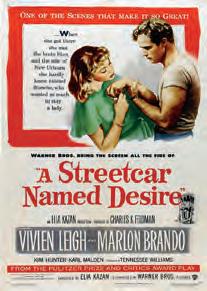

lawyer C finely ground maize
13 Cajun n A Louisiana native descended from Acadians B hot spring
B small owl C Louisiana native of French ancestry
7 moonshine n
A painting easel B illegal spirit C small spanner
8 paddy wagon n
A police van B beer glass
C private taxi
9 duds n A old pen
B clothes C fake laugh
10 commissary n
A general’s assistant
B philosopher
C military food shop
11 Cooter Brown n
A military leader
B simile for inebriation
C native of Texas
12 hominy grits n
A icy road B prosecuting
C mountain cabin
14 redneck n
A holidaymaker B term for rural southerner
C person with road rage
15 chitlins n
A pig intestines B crisps
C small nails
A word is born: Faitheist ►
An atheist who goes to religious services or respects the rights of others to have religious beliefs.
RD Rating
Useful? 8/10
Likeable? 6/10
23 february 2013 readersdigest.co.uk
9–11 getting there
1 gumbo B
thick stew. “Gumbo is popular in New Orleans.”
Louisiana French gombo.
Word poWer ansWers →
12–13 impressive 14–15 word-power wizard!
Why marshal?
2 Confederate C Southern supporter in American Civil War. “The Confederates lost the war.” Latin com (together) and foedus (treaty).
3 po’boy A meat sandwich. “Po’boys make for a substantial lunch.” From “poor boy”.
4 hogtie—B
tie legs together. “We had to hogtie the wild horse.”
5 Jim Crow B
derogatory term for a black person. “The Jim Crow laws discriminated against the black population.” From a song by the 19th-century entertainer Thomas Rice.
6 Creole C
Louisiana native of French ancestry. “Creoles speak a kind of French dialect.” Latin creare (create).
7 moonshine B illegal spirit. “Moonshine can be very strong whisky.”
8 paddy wagon A police van. “After my stag night, they put me in the paddy wagon.” Short for patrol wagon.
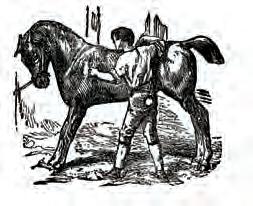
Marshal originally comes from the two Old High German words—marah (horse) and scalc (servant), meaning a groom. The word was adopted in English to mean an officer of the royal family or the court, particularly when speaking of a knight marshal. More recently, it’s been used in the armed forces to mean an officer of the highest rank, as in a Field marshal.
9 duds B clothes. “I just wore my old duds to the church.”
10 commissary C military food shop. “The commissary was packed with soldiers.” Latin committere (to entrust).
11 Cooter Brown B simile for inebriation. “I’m as drunk as Cooter Brown.” Derived from a man who supposedly avoided being drafted by staying drunk throughout the Civil War.
Play WP online: go to readersdigest. co.uk/wordpower

12 hominy grits C finely ground maize. “Hominy grits are boiled in milk or water.” From Native American Algonquian.
13 Cajun A Louisiana native descended from Acadians. “Cajuns play enchanting music.” Derived from “Acadian”.
14 redneck B term for rural southerner. “Rednecks can be found in the south-west.” From the burning effect of the sun.
15 chitlins A pig intestines. “Chitlins are nicer than they sound.” Middle High German kutel
24 readersdigest.co.uk february 2013
n

IN THE FUTURE…
...photographs will go 3D, says Gary Rimmer



Eat your heart out, Kate Moss: we can all be models now


Your partner in your pocket
Why give your beloved a photo of yourself on Valentine’s Day when you could give them a 3D figurine instead? 3D-printer “photo booths” are springing up on high streets from Tokyo to Madrid—there could be one on yours by 2015. How big your avatar might be is limited only by the size of the printer and the price: for now, a four-inch model could cost you upwards of £80.
To fabricate this replica, you’d probably be scanned by a technician with a 3D-hand scanner, but software exists that can interpret a 2D photo in 3D. You could even recreate your partner’s worst-ever photo as a surprise! OK, maybe not such a perfect Valentine’s gift after all...
Letting o steam
Steam is essential to industry, but it’s expensive to produce —boiling water requires lots of energy. But sunlightabsorbing nanoparticles developed by researchers in Texas can generate steam from water without boiling: each nanoparticle turns the water molecules directly
Policeless policing
Routine police work, patrols and even pursuits are tasks ripe for automation. At least, so think companies such as Honda, Mercedes and BMW, which recently exhibited vehicle concepts under the banner Highway Patrol 2025
These included mobile command-and-control centres embedded in tra c—ready to deploy robotic outriders to pursue suspect drivers—and aerial drones to watch over city streets. Such robotic deputies could slash costs, freeing o cers for publicfacing duties where a machine isn’t feasible.

surrounding it into steam while barely warming the other molecules. The chemistry is still unclear, but these particles even work on near-freezing water.

The implications are exciting—by 2020, we might see big improvements in solarenergy production that can bring cheap water sterilisation to remote villages. ■
26 READERSDIGEST.CO.UK FEBRUARY 2013
A robotic police pursuit unit





INStaNt expert
Harry Mount reveals the facts behind the news
Hard economic times mean more iconic British buildings are being sold. But at what cost to the country?
Why are so many public buildings up for sale?
As part of their austerity drive, local and national government are selling some of their prestige properties that aren’t bringing in enough money, or are surplus to requirements. They have also made cuts to budgets for public bodies such as the police, who in turn are selling off some of their property portfolio. Other high-profile properties are being sold off by companies, too—either for purely commercial reasons or because their fortunes have been squeezed by the recession.
Which ones in particular?
Admiralty Arch, the 1912 building at the other end of the Mall from Buckingham Palace, has just been sold by the Government (on a 99year lease) to a hotel group for £60m. Under the deal, the arch—designed as a monument to Edward VII, and once home to John Prescott— will be converted into a five-star hotel.
Are there any other landmark buildings on offer?
Yes. Last year, the Metropolitan Police said they were selling off their iconic New Scotland Yard headquarters near Victoria, London, as part of a drive to save £500m demanded by the office of the mayor of London, Boris Johnson. In order to make the savings, they say they’ll have to sell off a third of their property portfolio, which includes police stations, garages and patrol bases.
The Met bought New Scotland Yard for £124.5m in 2008, and spends £11m a year in running costs. The plan is to move to a smaller building in Whitehall. Metropolitan Police stations in Willesden Green, Norwood, Richmond, Highbury Vale and Walthamstow are also for sale.
Admiralty Arch, soon to be a rather glamorous (and exclusive) hotel
DAVID ILIFF/ LI cen c e: cc -BY -SA 3.0

The Great British Sell-O


Where does the money go?



£1 trillion
The UK national debt, which it’s hoped this sale of British property will help to reduce
What effect has the recession had?

sales—as in the case
In the case of government sales, the money is paid into a central pot to help relieve the national debt. In indirect sales—as in the case of the Metropolitan Police—the money made is reflected in a lower bill presented by the organisation to the Government.
What high-profile private properties have been sold?
In 2011, the last British-owned ports were sold off to a conglomerate of financial companies. The £754m package included
Some rich property tycoons have had to sell their assets. The bestknown examples are the Irish developers Paddy McKillen and Derek Quinlan, who bought the Savoy Group of hotels in 2004. They sold the Savoy soon after for around £250m to the Saudi Arabian businessman Al-Waleed bin Talal. After the collapse of the Irish property market, the remaining hotels in the group— Claridge’s, the Connaught and the Berkeley—look likely to go to the Barclay brothers, who already own the Ritz in London.
Tilbury Docks in London, Grangemouth container port, and Leith port in Edinburgh. Five years earlier, another 21 —including Plymouth, Hull, Cardiff and Southampton—were sold by Associated British Ports for £2.8bn.
How much are all the residential buildings in Britain worth?
At a rough estimate, around £5.5 trillion in total—which includes social housing as well as private flats and houses—according to a study last year by data-analysis company Hometrack. London is worth £1.36 trillion, almost ten times more than the next most valuable city, Birmingham, valued at £143.7bn. Manchester was valued at £117.7bn, and Glasgow was Britain’s fourth most valuable city at £61.3bn. ■

Manchester: worth £117.7bn (in terms of property, that is)
JASOn HAWKeS/IMAGe BAnK/GeTTY IMAGeS
Alex Polizzi IF I RULED THE WORLD
Alex Polizzi is a television presenter, businesswoman and third-generation hotelier of the internationally renowned Forte family dynasty. She presents The Hotel Inspector for Channel 5 and Alex Polizzi: The Fixer for BBC Two, which returns for a second series at the end of January.
I’d legalise prostitution. i was listening to a rather worthy women’s group recently on the radio who claimed that we’ll never live in an equal society until prostitution disappeared completely. but that’s never going to happen. instead, we should look at ways to ensure it is a much safer profession with excellent healthcare provision. i’m sure prostitution isn’t a career that many choose without financial need but, as it’s a commodity that’s desired and that people are prepared to pay for, i’d make sure that sex workers were looked after properly and that income was taxed like any other business. it’s wrong to drive anything underground—prostitutes should be able to go to the police if they’ve suffered violence without fear of recrimination.





I’d abolish inheritance tax. i’m very happy to be a higherrate taxpayer, and i believe that it’s my duty to give more because i earn more. but it drives me mad that, after being taxed on our earnings and savings, a chunk of what we do manage to squirrel away is taken when we die. inheritance tax is the most iniquitous levy because it comes from money that’s already been taxed. leave what’s left for my children to enjoy!
I’d ban battery chicken farms. they’re obscene. We get all worked up about milkfed veal, yet we continue to allow chickens to live out their lives in the most appalling conditions. i’m not a vegetarian, but i do want the things that i eat to have had a decent life first.
I’d encourage people to do vocational training and to see this as an alternative to university. i work with people who come from colleges that allegedly teach hospitality for the hotel industry, but who’ve learned nothing. and there are universities that offer useless
30 readersdigest.co.uk february 2012
degrees. students get into debt and think it’ll be alright when they graduate and get a job—but it’s hard out there. i’d like more people to embrace getting their hands dirty while learning a trade, and to look at jobs that don’t involve sitting in an office.
I’d impose enormous penalties for rudeness. then everyone would be more polite to each other. When i call a utility company, i find it disconcerting to be called alex, as though we’re friends. Professional distance can be a good thing— the most successful businesses i see are those with a strong boss at the top. my brother-in-law is ceo of next and, while he’s very correct and polite, ultimately his word is law and i like that. Hierarchies can be good things.

‘‘ ’’
Most of my friends return to work for the dignity it affords rather than for monetary gain
Childcare would be paid for out of untaxed income. Women are encouraged to go back to work, but not really told how they’re expected to manage it financially. most of my friends return to work for the dignity it affords them rather than for monetary gain.
i’d do a root-and-branch transformation of our childcare arrangements, more in line with scandanavian models. they have a high provision of public daycare centres, and in denmark, for instance, municipalities provide subsidies to help cover costs of childcare at home.
I’d make sure people were looked after respectfully into their old age. We need to show a lot more compassion for those who are no longer able to look after themselves. i’d have fantastic care homes and wonderful food, and i’d pay carers well. and i’d allow people to stay in their own homes if that’s where they felt safe. no one should have to sell their house to pay for their dotage.
I’d insist on good spelling, grammar and punctuation. i can’t believe teachers are told to ignore these, in case correcting them stultifies children’s imaginations. i think that not being able to write things down properly limits your world a lot more. lynne truss, with her zero-tolerance approach to bad punctuation, is one of my greatest heroines! As told to Caroline Hutton
The Fixer is back on bbc two now
I’d drink vodka and eat caviar every day. i’m all about a good life and a good death. ■
31 february 2012 readersdigest.co.uk
illustrated by sam falconer
reasons to be cheerful
27. Life on demand
Britain is now a place where choice is king —and James Brown is loving it!
There was a time when doing certain things was a pain in the backside— like hiring a van, finding the right film to watch, or riding someone else’s bike (especially riding someone else’s bike).
But now, thanks to the “on-demand” society, Britain has become unusually helpful. You can get so many things instantly, and just pay for the time you actually use, that I’ve unexpectedly become a flag-waver for van hire— among other things.
If you had the misfortune to know me personally over the last few months, you would have endured such classic opening lines to conversations as, “I took a TV down to the council dump in a Zipvan today…”. This theme might vary slightly to include objects like “some bushes” or “some boxes”, and such destinations as “the recycling plant” or “the lock-up”.
As my enthusiasm for short-term localised van hire increased, I could see my friends’ interest in what I had to say disappearing in the opposite direction. I think “glazed” is the word for it. But let me explain.
When I used to hang around with a lot of small bands, hiring the van late on a Saturday often meant getting the one that had already been returned from that morning’s fish delivery. It would cost a fortune, have nothing but a wheel arch to sit on, and invariably be cold. If it didn’t smell of fish it might have soil in it or sharp splinters sticking out from the wood between the back of the van and the driver’s seat.
I spent a good part of my life travelling in these things between 1984 and 1994. They were uncomfortable, slow and expensive, and nothing had ever prompted me to consider hiring one for myself.
Recently, however, I had to move a whole hedge and half a tree from the front of my house, and I decided to investigate hiring a Zipvan. A year ago I was sitting in a traffic jam looking at the car club parking spaces and cars that are dotted around London, and sarcastically asked the Australian guy I was with, “Who the hell rents those cars?” To which he replied, “I do,” and he spent the rest of the traffic jam explaining the benefits—and, to be fair, they did seem to make


32 readersdigest.co.uk february 2013
sense: no insurance, no parking permits, no running costs.
I thought of this when I needed a van, and set about researching it online. I was stunned. For about £9 an hour, I got to drive around in my own van. There was one the size I needed two streets away, and another four within a mile’s walk. I didn’t have to pay for the petrol—it had a card that did that. And it only took a few minutes to sign up.





From that point on, I was an apostle. If you saw a curly-haired bloke driving round north London shouting, “I love these vans!”, that was me. I loved the ease with which you could just get them from the end of your street and return them there. No rip-off petrol charges like when you hire a car abroad. No long journey back from the hire centre without wheels. No weekend-long fees when I only needed it for two hours.
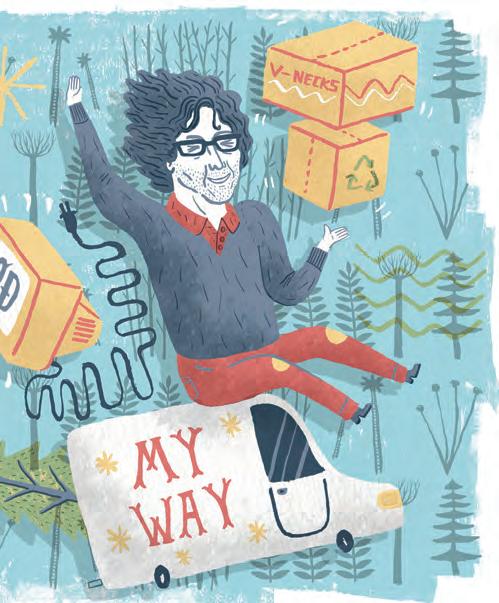
When I wasn’t driving the van, I was riding the “Boris Bikes” we have in London. I keep reading articles by people who definitely don’t cycle slagging them off— but they’re wrong. For a city with a slower traffic speed than in Victorian times, they’re a great short-term help. For £10 I can use as many bikes as I want in a week for no further charge, as long as my journey takes under 30 minutes. And if you can’t cycle from one place to the other in under 30 minutes, you’ll probably use the tube anyway. For years, it was “that’s the way it is”—but in the bigger cities that’s changing. New ideas are seeping out. I used to enjoy Sky Movies, but now I’m getting rid of Sky because the was ►
33 feBruary 2013 readersdigest.co.uk ILLUSTRATED BY ED J BROWN
I’m getting rid of Sky because the choice is so bad—if there’s a good film on, you usually tune in 15 minutes after it’s started
choice is so bad (if there’s a good film on, you usually tune in 15 minutes after it’s started). In the last couple of months, I’ve watched two of the worst films I’ve ever seen: Basic with John Travolta (so terrible it was funny); and Haywire (some no-plot affair with a kickboxing heroine).
I’ve decided there’s just no more time to watch rubbish, so I have a solution. I’ve gone through a list of the best films of all time, written 20 down I’ve never seen and—thanks to
’’
LoveFilm, Netflix and a cable linking the computer to the flat-screen—I can watch what I want, when I want.
At times, there’s so much choice you feel like you’re back in a video shop. But, because of my list, I’m controlling my own viewing time. And I like that. I like choice. I like time control. n
James, founder of Loaded magazine, now edits Sabotage Times—an online magazine with the motto: “We can’t concentrate, why should you?” You can follow James on Twitter @jamesjamesbrown.
budding authors, take a bow growing up
This pastoral life cycle was one of thousands of tales submitted to last year’s 100-word-story contest. We’ll be featuring a commended story in the magazine every month. Visit readersdigest. co.uk/magazine for details of this year’s contest.

submitted by alastair Vere nicoll, London
On turning 70, Josephine asked Grandpa to tell his life story in so many words.
“I was once a little sapling. I yearned to touch the sky, to be higher than the other trees, and I grew narrow. But the cold blue sky was empty and I was alone. I looked down and the ground was rich with life. So I spread my red leaves broader. And now, knotted and gnarled, small animals play in my shade and the young trees multiply ten-fold around me.
“Your turn,” he told the seven-year-old.
“I want to grow up like you.”
alastair says: “Given the challenge was to limit the story to 100 words, I wanted to use the idea of word limitation in each part of the story. So the grandfather uses one word to describe each year of his life—exactly 70 words. The girl, being seven, uses seven words to describe the hopes for his life. And the acorn in the image will grow “ten-fold”—from seven to 70.”
alastair will receive a cheque for £70
34 readersdigest.co.uk fe B ru ary 2013
‘‘
◄

Jess ennis opens her heart to rd about love, life—and her favourite stressbusters!
The Nation’s Sweetheart
By aLISON kERvIN
It was just before midnight, and a handful of journalists and I were enjoying a post-awards-dinner drink at London’s Hilton Hotel when Jessica Ennis walked in.
Dressed in a beautiful floor-length black gown, and armin-arm with former 110-metre hurdle world champion Colin Jackson, she slipped past the press throng and headed for the bar, ordering two glasses of orange juice while Jackson chatted to members of the public gathering around him.
“Hi, I’m Jessica,” she said, as she joined his group.
“Sorry,” said Colin. “I should have introduced you. Everyone, this is Jessica Ennis. Give her a few years and you’ll all know her name.”
“What do you do?” one of the men asked Jess, more out of politeness than interest.
“Oh, I’m just a heptathlete,” she said, modestly, smiling the smile that would go on to beguile a nation.
“No, not just,” said Colin, assertively. “She’s going to be the best. The best ever, aren’t you, Jess?”
Colin’s prediction almost six years ago came true on a warm evening last summer, when Jess became the 2012
►
36 readersdigest.co.uk february 2013 COLIN BELL/CORBIS OUTLINE

Olympic champion. Her victory made her the nation’s darling, not just because of her astonishing athletic performance, but also because of her warm personality, and the same modesty she’d shown all those years before in the London bar.
And when we meet for our interview, several months after her Games triumph, she’s still that down-to-earth girl with her mind on everyday things, despite the newfound fame and wealth. Today, she’s focused on her impending wedding to childhood sweetheart Andy Hill.
“He proposed on Christmas Eve two years ago. It sounds like a mad amount of time to wait to get married, but everything was on hold because of the Olympics. Since then, I’ve been in weddingplanning mode. Of course, it’s me doing most of the work: he’s a typical man.”
She’s known Andy, a constructionsite manager, since they were at school together (he was three years her senior at King Ecgbert School, Sheffield).
after him, but that’s just not true. I knew him because he’d been out with a friend of a friend, then we met in a nightclub and exchanged numbers. I must admit it was me that texted him—on a night out with the girls—rather than the other way round. But that’s all I did. I didn’t run around after him!
“I really liked him straight away, though. I know it’s easy to say these things looking back, but I guess I always knew he was the one. I knew from the start that I was going to fall head over heels in love with him. I loved the fact that he wasn’t into athletics, had his own life and allowed me to get on with mine.”
Andy’s proposal came completely out of the blue. “We were planning to go out for an Italian meal, and he called me into the front room of our house and said he wanted to talk to me. He said how much I meant to him, then he got down on one knee. It turned out that he’d asked my dad whether he could marry me and was all prepared. I said yes immediately.”
“He always laughs about us meeting, and says that I did all the running around
and says that I did all the running around


Jess holds her time with Andy away from the spotlight very dear, so won’t


“It’s much better to have a healthy, fit body than a skinny, undernourished one ”


◄
2012 ADIDAS/GETTY IMAGES
The boy and girl next door: Jess and her fiancé Andy (with dog Myla) are “very normal”

reveal much about their nuptials. “After last year—which was wonderful but very public—I want the wedding to be just close friends and family. It’s nothing to do with the Olympics, so I’m hoping that we’ll be able to keep it to ourselves.
“I enjoy what I do, but I like to have a break. The best thing is being at home with Andy and with family and friends, or lazing around doing nothing. I’m not sure what we’ll do for Valentine’s Day. Probably go out for a meal somewhere— something very normal. We really are no different from everyone else! I feel like Andy understands me. He’s been next to me through all of this, and knew me a long time before I was famous.”
Another big love in Jess’s life is her labrador Myla.
“She’s been amazing for me—a great
distraction when I felt under pressure before the Games. Chell [Toni Minchiello, her coach] didn’t want me to get a pet because he wanted me to focus on athletics, and not be worrying about who was looking after her. But it turned out that worrying about Myla was a great way to relax. I love walking her, it’s so peaceful, and I love coming back to the house and knowing she’s there. She’s a real handful but means the world.”
Jess makes a quiet home life sound far more appealing than the falling-out-ofnightclubs antics of other celebrity role models. Since the Olympics, she’s also become a pin-up for boys and a great example of an attractive, strong physique for girls. Does she think the new prominence of female athletes like her will finally end teenagers’ obsession with being a size zero?
“Yes, but it’ll take time—and we need sportswomen to stay high-profile for it to happen. I think what stops girls doing sport, partly, is worrying about how they look while doing it, and that they’re going to get muscles. But there were lots of good-looking girls in the Games, and I hope it started people thinking about who their role models are. It’s much better to have a healthy, fit body than a skinny, undernourished one.”
What’s also been refreshing about Jess becoming a national icon is that her
►
39 february 2013 readersdigest.co.uk
TILLENDOvE.COM
mixed-race heritage—so common now among young Britons—has barely been mentioned, particularly by Jess.
“I haven’t spoken about it because it hasn’t caused me problems. Racism’s a horrible thing, but I haven’t suffered from it. I think the country’s moved on since my dad arrived from Jamaica in the 1960s, thank goodness. Once, when he went to buy a house, the owner decided he didn’t want to sell it to a black man. But, even then, that’s the only racist incident that happened to him that Dad’s mentioned.”
Jess has a big year ahead of her, with the wedding and the World Athletics Championships in August. But what about the long-term future—does she plan to inspire a generation of her very own sometime soon?
good. Anyway, I think it would be hard enough for a child of mine—they’ll always be judged against my achievements.”
But having just turned 27 and been appointed CBE, and with her family life settling down, has she thought much about what she’ll do after sport?
“The country’s moved on since my dad arrived from Jamaica in the 1960 s ”
“One of the problems with being an athlete is that you have to be very focused on what you’re doing in the minute, so I haven’t had too much time to consider [retirement]. I enjoy the bits I do in the media, so maybe that’s the direction I’ll go in. But I’m hoping that I won’t have to answer that question for a good few years!
“I’d like to have children one day—not quite yet. People often ask whether I want them to be sporty. The truth is that I would, because I think it gives you confidence, fitness, and the chance to travel and meet new people. But I wouldn’t want to put any pressure on them. I was very lucky growing up; my mum and dad were very supportive and keen for me to do the things I wanted to do, but I never felt any massive pressure to be
“If I hadn’t been an athlete, I’m not quite sure what I’d have done. Psychology is a real interest of mine—I studied it at Sheffield University—so I suppose the answer would be, perhaps, a sports psychologist. But I haven’t had much luck with jobs. I was a waitress once and tipped gravy over one of the diners. It’s probably lucky I was good at athletics…
“But you never know what’s going to happen in the future. You can get injured and it’s all over; someone can come along, younger than you, and start beating your times. All you can do is enjoy the moment —and I know I’m doing that.” n
fun fact/ the beautiful sound of mouse-song
New research suggests that tiny noises made by mice actually sound like birds singing. Much like our feathered friends, it seems, male mice “sing” to woo females. Don’t bother listening for it, though—it’s well out of our hearing range.
40 readersdigest.co.uk february 2013
◄
Dramatic rise of sophisticated fraud targeting credit and debit card holders
A telephone-based banking scam, which largely targets older people and tricks them into sharing their PINs and then their debit or credit cards, is on a dramatic rise. Between January and August 2012, more than £7.5m was lost – ten times the amount stolen through the scam in the whole of 2011.
The scam involves a person being called by a criminal posing as someone from their bank, or even the police. The caller tells the victim that their credit or debit card needs collecting and replacing, saying there has been fraud on their account. The criminal caller often reassures the victim that the call is genuine by getting them to hang up and call the bank’s number for confirmation. However, the criminal stays on the line, tricking the victim into believing they are on a new call and that the person at the end of the line is from their bank.
The criminal will then either ask the person for their PIN or ask them to key their PIN into the telephone keypad before sending a courier to collect the card. The victim is told that the card is going to the bank, but it’s actually delivered to the fraudster along with the PIN obtained during the scam.



Bank customers are being advised to follow three simple rules to prevent themselves becoming victims:
1. Never hand over your card: Your bank or the police will never ring you to tell you they are coming to your home to pick up your card.
2. Never share your PIN: Your bank will never ask you to authorise anything by entering your PIN into the telephone. Never share your PIN with anyone.
3. Always speak to the bank securely: Before calling your bank, make sure you can hear the dial tone.
DCI Dave Carter, Head of the Dedicated Cheque and Plastic Crime Unit (DCPCU), said:
“The only people who will ever ask you for your PIN are criminals. If someone on the phone asks for it, hang up immediately. If you believe you have had one of these calls, or know someone who has, get in contact with your bank.”

For more information visit: www.financialfraudaction.org.uk or www.ukcards.org.uk
Advertisement Feature
Who says your best years are behind you by the time you reach middle age?
Staying Creative
bY jO CARLOwE

“A person who has not yet made his great contribution to science before the age of 30 will never do so,” said Albert Einstein. He was just 26 when he published his theory of relativity. Engineer Isambard Kingdom Brunel was 24 when he designed the Clifton Suspension Bridge, and it’s often said that Picasso produced his finest work in his twenties.
But are we—as still often seems to be received wisdom in the workplace— really over the hill creatively speaking by the time we hit 30?
It’s a question that academics have been pondering for years. And, happily, their answer is a near-universal no.
Historiometric research, for instance,
a body of work carried out mostly by European and American occupational psychologists, has attempted to measure how creative people are at different ages, by tracking the amount and quality of work they produce. And, based on its data, many experts believe that our peak of creativity is less to do with our age than with our profession. Musicians and artists, for example, seem to do their best work in their 30s and 40s, and lyrical poets between 26 and 31, while novelists tend to peak between 40 and 44, humanity scholars in their 60s, and scientists between the ages of 40 and 70.
Different careers require different amounts of experience and knowledge ►
42 PHOTOALTO/ERIC AUDRAS/GETTY IMAGES

for Life
before potential can be put into practice, explains University of California psychology professor Dean Keith Simonton. “Somebody can learn most of what they need to know about mathematics at a very young age, and begin making significant contributions in the field,” he says. But a scientist might require years of research and collaboration before a basic theory can be realised. “It took Charles Darwin years to master and organise what he needed to know to write The Origin of Species.”
Similarly, says Professor Simonton, a lyrical poet can jot down his thoughts instantly, but the more complex techniques and greater life experience needed to write a novel may take decades to acquire.
Other experts offer different theories
on why creativity needn’t stop in your younger years. Professor David Galenson, of the department of economics at the University of Chicago, believes geniuses—whether in art, architecture or even business—come in two different forms: conceptual and experimental innovators.
Conceptualists do their breakthrough work early, regardless of their field, because they somehow know in advance what they hope to achieve. Picasso, for instance, thought through his work carefully before putting brush to paper, so his early art is treasured for its invention, but his later—and less fresh—work isn’t quite so well regarded.
Nineteenth-century French painter Paul Cézanne, however, was an experimentalist who worked by trial and error
STAY CREATIVE AT ANY AGE
These expert tips will help keep your mind fresh at every stage of life
20- TO 40YEAR-OLDS
1. If you’re building a career or family, creativity often gets put on the back burner. Schedule a time in your diary—an hour before bed, say—for something like singing, drawing or writing.
If you can, join a writing group, knitting circle or choir, contribute to online forums, or start your own blog. Bouncing ideas
o others who give you supportive feedback fuels the creative process.
2. At this age, you may still believe that ideas only come in a flash of genius, rather than through years of hard work. This task gives you a sense of how developing winning concepts can involve risk and making several failed attempts.

Divide a paper into four. Label one row “normal and ordinary ideas” and the other “original risk and making the other “original
and breakthrough ideas”. Label one column “highly feasible and useful” and the other “di cult and of unclear use”. Put your ideas into these quadrants —this will help you work out which ones are best.


READERSDIGEST.CO.UK FEBRUARY 2013 44
◄
without a clear goal, gradually improved his technique, and produced his best work when he was in his 40s.
Your circumstances may also play a big role in your creativity. Novelist Marina Lewycka was 59 when her best-selling debut novel A Short History of Tractors in Ukrainian was published.



“In my 50s, I finally had time to myself,” she says. “I was working part-time, my family didn’t need much attention, and I could spend my spare hours doing something I really loved.”
Inventor Trevor Baylis thinks creativity is not about age, but about seizing the moment. He was in his mid-50s when he created the wind-up radio in 1991.
“I could have been watching Come
►

40- TO 50-YEAR-OLDS
1. Avoid your brain slipping into tried-and-tested ways of thinking by dabbling in something you know nothing about—be it car maintenance or Sufi mysticism. Read articles, go to conferences and do courses. Talk to people who are new or upcoming in your field, and work on projects that teach you something. Networking and keeping up to date is a way of staying motivated, and will help you find innovative ways of working.

50- TO 70YEAR-OLDS
1. By this time of life you could be an expert in your field, but it may have made your thinking rigid. This exercise gets you into the habit of bending your mind’s most stable concepts.
Select one of these objects and draw what it might look like: a piece of furniture that’s also a fruit; a vehicle that’s a fish; a computer that’s a teacup; a lampshade that’s a book.
2. Take a stack of magazines, cut out photographs (connected to a particular work problem, for example), make them into a collage and pin it on the wall next to your desk. Study it, then let your mind wander to get a new perspective. Switching focus like this can stimulate areas of your brain that weren’t previously working on the issue and trigger winning ideas. ►
2. Our brains shrink and become less e cient as we age. The hippocampus,
45 FEBRUARY 2013 READERSDIGEST.CO.UK
GL PORTRAIT/ALAMY
Novelist Marina Lewycka wrote her first novel at 59
Dancing, but there was a report about the spread of Aids and how the radio was the best way of getting the publichealth message across,” says Baylis, now 75. “I had a flash of inspiration, and that can happen at any age.”
The research does suggest, however, that our creativity will often peter out as we age, if we start relying too much on existing knowledge and tried-and-tested strategies, rather than experimenting and innovating.

Psychologist Dr Keith Sawyer, author of Explaining Creativity (£26), says we
need to counter this throughout our lives by “learning new stuff, observing unusual situations, and reading. You need to fill your mind with a variety of fresh information, concepts and knowledge. That’s the raw material of creativity.”
associated with memory, loses 5% of its nerve cells each decade. Physical exercise is essential for maintaining blood flow to the brain, and may stimulate cell growth and slow cognitive decline. Exercise (a fast walk is fine) for a minimum of 30–60 minutes, at least three times a week.
3. The old “use it or lose it” adage becomes more important as we get older. Spend ten minutes doodling with your wrong hand. This forces your brain to work extra hard, and experts believe this sort of exercise causes new synapses—the connections between brain cells—to form. The more synapses we have, the faster we can think.
» Last two exercises from Age-Proof Your Brain by Tony Buzan (£13)

70+ YEAR-OLDS
1. In later life, your brain’s processing slows down, so ideas come less frequently. This exercise helps you continue to generate lots of rapid thoughts and allows you to keep going when you feel stumped.
Roll a six-sided die to select one of the following questions:

How


if you had two thumbs
How would the world be di erent if you had two thumbs on each hand?
● How ●
●

How would the world be di erent if everyone lived forever?


THOMAS jACKSON/STONE/GETTY IMAGES; RAY RObERTS/ALAMY
◄
Trevor Baylis invented the wind-up radio later in life
◄
People who have rebooted their minds like this include Mark Gould, 52, a former city trader and journalist, who took up furniture making two years ago.
“After 25 years in the media, I was becoming too two-dimensional and needed to have a change. Making things with your hands is really satisfying, and your mind clears of all the nonsense, politics and stress.”
Professor Simonton has had a similar experience. “When I entered my 50s, I started wondering whether my creativity was drying up. Some of my research ideas seemed to reach a natural end point. So I moved into a new area [film] and began working on cinematic creativity and aesthetics, culminating in two books—a new lease on my creative life.”
He adds that, although age may in the
end make your mind less productive and unable to generate as many ideas, the quality of those you do have can be as good or better than before. And experience and expertise will enable you to implement them quicker. At 64, he produces papers in far less time than his graduate students.
So age, it seems, need not be a major barrier to a productive, ideas-filled life. Michelangelo worked on St Peter’s Basilica, Rome, into his 80s, 75-year-old Sir Ridley Scott remains a prolific filmmaker, and Thomas Edison, inventor of the electric light bulb, was said to create one patentable idea every two weeks right up until his death at 84.
Keep exercising your brain and, if you’re doing great things now, there’s no reason why you won’t be doing so well into your dotage. ■

How would the world be di erent if there were five sexes?





How would the world be di erent if gravity stopped for one second each day?



How would the world be di erent if people no longer needed sleep?


How would the world be di erent if both sexes could have babies?


List as many facts about this alternative universe as you can; don’t slow down by thinking too hard.
2. As your short-termmemory capacity declines, you can’t juggle so many
things in your head at the same time. Write good ideas down or use aidesmemoires so they’re not lost forever, advises psychologist Dr Kamal Birdi of the University of She eld.
3. You should also be prepared to move into other aspects of your
personal creative field, adds Dr Birdi. You may not be able to dance like you used to, but you could start teaching others how to.
» All advice, unless otherwise stated, is from Zig Zag by Professor Keith Sawyer (£17.99), published next month
47 FEBRUARY 2013 READERSDIGEST.CO.UK
PHOTOVIDEOSTOCK/E+/GETTY IMAGES ● ● ● ● ● ● ● ● ● ● ● ● ● ● ● ● ● ●

Best of Brıtısh


Cheeses


When it comes to creativity with milk curd, we knock our continental neighbours into the proverbial cocked hat. and who’d ever have imagined that?
BY LOLA BORG
Charles de Gaulle’s famous quote about the French was that he couldn’t govern a nation that had 246 cheeses. If only he could see Britain today!
Until about 20 years ago, there were basically nine regional cheeses: Cheddar, Cheshire, Caerphilly, Derby, Wensleydale, Gloucester, Leicester, Lancashire and Stilton, mostly factory-produced in massive blocks. But that’s all changed—we now have over 900 British options, and that’s if you count the big cheeses (excuse the pun) such as Cheddar or Stilton as just one variety! Specialist shops and local farmers’ markets, in particular, have really boosted the smaller, artisan offerings.
So here’s our selection of some rising stars—and a few classics, too.

48 readersdigest.co.uk february 2013 BIM PHOTOGRAPHY
►



For the happy couple who want a wedding cake that’s a bit different. OK, a lot different. From thecheeseshed.com


STINKING BISHOP

Named after a 19th-century farmer in Gloucestershire notorious for his drunken antics, Stinking Bishop is made with rind bathed in pear cider, which gives both a distinctive browny-pink colour and a ripened smell that’s been compared to “a rugby-club changing room”.
TUNWORTH
The classic cheeseboard combo consists of a Stilton, a Cheddar and a Brie or Camembert. “But within that now is an enormous variety,” says Sue Cloke of specialists Cheese at Leadenhall. “You can have a fantastic cheeseboard with British cheeses.”
She’s not kidding. In the UK, around 15 years ago, we started cheekily to make our own Brie and Camembert-style cheeses, and have rather smugly beaten the French at their own game. Take the award–winning Tunworth —it looks and tastes like a Camembert (“cabbagy”), but it comes from Hampshire. Made since 2005 by two mothers with five children between them who met at the school gates, Tunworth has had wine and food
This cheese was languishing in obscurity until 2005, when it became a best-seller overnight. The reason? A critical role in Wallace & Gromit: The Curse of the Were-Rabbit, where Gromit uses Stinking Bishop to revive Wallace.
Made by old hippy (his words) Charles Martell since 1972—using milk from what was originally a handful of almostextinct local Gloucestershire cows— it’s more than just a snappy name: it’s been cited by Juliet Harbutt, founder of the British Cheese Awards, as one of the classic modern British cheeses. Who would argue?
Made in Dymock, Gloucestershire (stinkingbishop.co.uk)
writers throwing superlatives around— Raymond Blanc, for example, calls it “the finest Camembert in the world”. Is it really that good? Oh yes! This runny and pungent offering is an impressive addition to any cheeseboard.
Made by Hampshire Cheeses (hampshirecheeses.co.uk)

50
readersdigest.co.uk february 2013 ALL CHEESE PHOTOGRAPHED BY FABF O ODPIX. COM; BARRY BATCHELOR/PA ARCHIVE/PRESS ASSOCIATION IMAGES
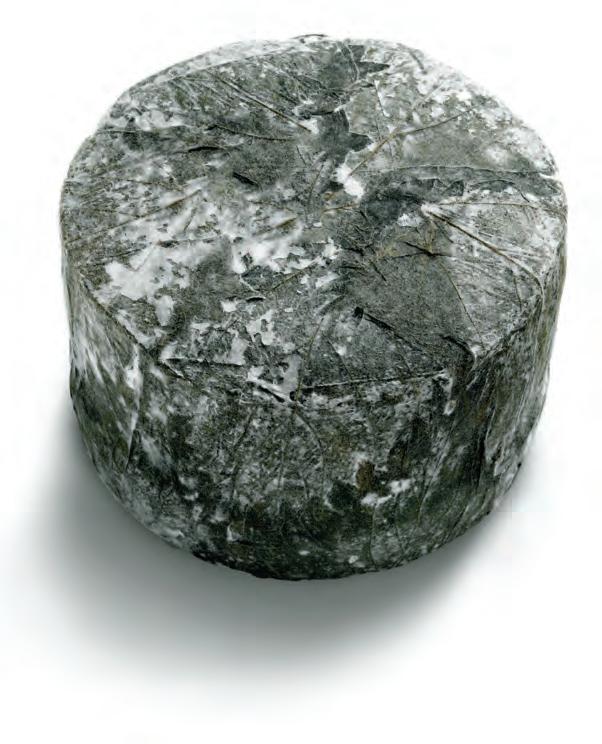
CORNISH YARG
Fresh, tangy, salty and slightly crumbly—Cornish Yarg tastes of seaside holidays, and is always good for those who don’t want a strong cheese, says Sue Cloke. It was made to a 17th-century recipe found in a farmhouse attic (well, this is how the story goes) by a Cornish couple on the edge of Bodmin who reversed the letters of their surname—Gray—for their cheese.
A spraying of mould gives the unusual look and flavour, but what makes Yarg distinctive (and very handsome) is the deep-green wrapping of wild Cornish nettle leaves. It also comes in wild garlic leaves and, for romantics, a whole heartshaped truckle.
Made by Lynher Dairies, Truro, Cornwall (lynherdairies.co.uk)

readersdigest.co.uk 51 february 2013 ►

CHeddAR
It originated in the village of Cheddar, of course, and at one time had to be made within 30 miles of Wells Cathedral. But, as Cheddar is a generic name, any fool can make a poor approximation—although there are strict conditions for using the name “West Country Farmhouse Cheddar” (such as hand “cheddaring”, for example).
Like many of our great cheeses, it’s a story of survival against the odds. Or, in Cheddar’s case, the war, rationing and the dreaded Milk Marketing Board (who decreed all surplus milk went into making one uniformly bland cheddar). There are now a squillion varieties and a world of difference between an indifferent rubbery mass and one of our greats, such as Quickes or Montgomery’s. Or these ones—sweet Godminster organic truckles, in a distinctive burgundy wax, made with milk from their own herd.
Godminster Organic unpasteurised vintage Cheddar is made in Bruton, Somerset (godminster.com)
52 readersdigest.co.uk february 2013
Sandy and Andy Rose show off their blue cheese

BARKHAM BLUe
For Sandy Rose, making cheese started out as a hobby a decade ago. A farmer’s daughter and ex-hairdresser, she had a smallholding of rare-breed cattle and goats. “I always liked blue cheese, but
LANCASHIRe BOMB
found continental versions too strong,” she says. Using milk from Guernsey cows, she made a sweet, mellow cheese that “is almost spreadable, like a blue butter”.
Within six months, Barkham Blue had scooped a Best New Cheese Award, and Sandy now has a sideboard groaning with awards, including Supreme Champion at the British Cheese Awards. The entire family works in the business, named Two Hoots Cheese after their rescued barn owls. “And we still can’t make enough of the stuff,” says Sandy. Made in Barkham, Wokingham, Berkshire (twohootscheese.co.uk)
Maybe it wouldn’t be quite as big a hit if it didn’t have such an appealing name. Andrew Shorrocks was born into a family of cheese makers, and he made the first bomb as a leaving present for a pub landlady in the village of Goosnargh. Twenty years later, he doesn’t know how many he shifts a year, despite never advertising.
A rich, creamy cheese wrapped in black wax, Andrew puts its appeal down to the fact it’s different (you slice off the top and scoop out to eat). In a rich Lancaster accent, he says, “Most cheeses are a bland lump of rubbish when you get in there, but this isn’t.” Quite. It can be stored for up to two years, which makes it good present material—it flies out of the shops at Christmas. And it now comes in several varieties (the Red Onion Bomb is very tasty with a ploughman’s lunch, according to British Fine Foods), but the original—matured for two years and very tangy—is the best-seller. Made in Goosnargh, Lancashire (lancashirebombs.co.uk)
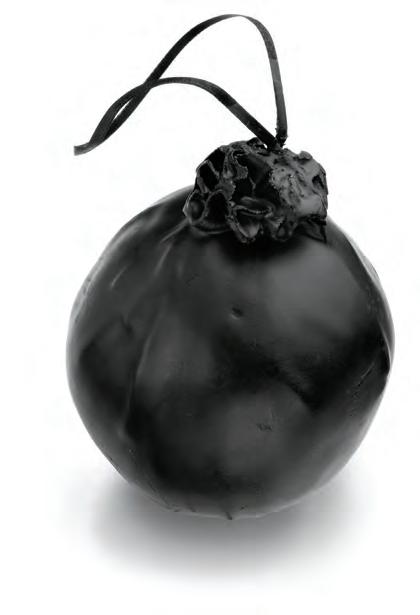
readersdigest.co.uk 53 february 2013 ►
GORWYdd CAeRPHILLY

A cheese with a Welsh name that can be made outside of Wales (confusingly), Caerphilly has a recipe similar to other crumbly cheeses—Cheshire, Lancashire and Wensleydale. The story goes that its salty texture was just the thing for miners to replace all the salt lost sweating on the coalface. Caerphilly production died
INNeS BUTTONS
out totally during the war (it was banned by the Ministry of Food), as did that of most British cheeses, bar a few massproduced varieties.
There were traditionally two different ways of making it: some was eaten young and fresh (and used as a cheap alternative to Cheddar); others ripened into a harder version. This one, from Trethowan’s Dairy, “a little farmhouse in Wales”, is the latter type, made the way cheese-maker Todd Trethowan’s grandmother used to do it, and is a true artisan Caerphilly—in other words, nothing like umpteen tasteless versions. Gorwydd has two textures: a ripening under the grey, molten-looking rind; and the traditional salty, lemony centre.
Made by Trethowan Dairy Gorwydd Farm, Tregaron, Ceredigio (trethowansdairy.wordpress.com)
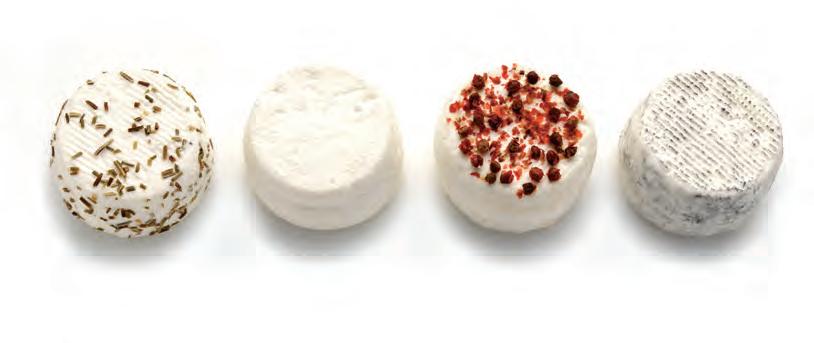
For those who don’t like goat’s cheese to be too “goaty”, this is a mousse-like fresh cheese that really is as cute as its name. Best eaten as fresh as you can find it, an Innes Button (roughly the same size as a milk-bottle top) is made by Stella Bennett and her son Joe with milk from their 350 goats on a farm in rural Staffordshire.
The secret to the clean taste, she says, is that the cheese is made first thing in the morning with milk that’s still warm. Yum! It’s available as natural, or prettily coated with rosemary, pink pepper or ash.
Made by Highfields Farm Dairy in Tamworth, Staffordshire (innescheese. co.uk)
54 readersdigest.co.uk february 2013
Maugan Trethowan (right, with wife Kim) runs the dairy with his brother Todd
CRIFFEL
A Camembert-like cheese, pungent when ripe and with a sticky rind, Cri el is named after the hill that can be seen from the dairy where it’s made, in beautiful countryside seven miles west of Dumfries. But what makes Cri el di erent is the way it’s produced.
The Loch Arthur Creamery is part of a community whose purpose is to find “meaningful work” for those with learning disabilities and special needs. The dairy (where Michael, with Down’s Syndrome, has worked since 1985) originated as a job for a wheelchair-bound person who could still churn butter. They now make several cheeses and also have a shop, a new cafe and two farms. They’ve won awards for their cheese, and last year, after scooping a coveted BBC Radio 4 Food and Farming Award, they actually ran out of supplies! This has now been rectified.

With thanks to: Juliet Harbutt, founder of The British Cheese Awards; Nigel White of the British Cheese Board; Sue Cloke from Cheese at Leadenhall; Pam Dyer at British Fine Foods; and food writer and blogger Debora Robertson (lickedspoon. blogspot.com)
If you have a cheesy delight that’s escaped our attention, why not let us know? Send us an email—with a picture if possible—to theeditor @readersdigest.co.uk
Made by the Loch Arthur Creamery in Beeswing, Dumfries (locharthur.org.uk)
BOILIE GOAT’S CHEESE
It has to have the worst name ever, though the nice people at the creamery where it’s made (a co-operative of 65 farms in rainy Fermanagh) tell us it’s pronounced “bow-lee”, which means “the milking place” in Gaelic.

This award-winning goat’s cheese is made from a 1920s local-farm recipe. Traditionally, cheese making was the job of the farmer’s wife (to use surplus milk), which is why many cheeses are a size that fits comfortably into a female palm. Boilie is hand-rolled into tiny balls and put into jars of (not terribly Irish) garlic-infused sunflower oil. Eat on crackers, or put straight onto pasta or in salads along with the flavoured oil. Made in Fivemiletown, Tyrone, County Fermanagh (fivemiletown.com/shop) ■

NEXT MONTH: FILM LOCATIONS
55 FEBRUARY 2013 READERSDIGEST.CO.UK

In It Together

SAMFROSTPHOTOS.COM
by ChRiSTOpheR miDDLeTON
We track down Britain’s quirkiest, most inspiring community organisations, where anything from flowers to filthy old coal mines can bring people together


When neighbours make good friends
If you move house again, wouldn’t it be nice to go to a place where everyone in your street instantly invites you around for a meal, or volunteers for a bit of babysitting, or helps you fix your plumbing?
That’s what it’s like on the Springhill estate in Stroud, Gloucestershire. Its 35 timbercovered houses and flats have 75 residents— including young adults, babies and pensioners —who have three communal meals a week and are expected to carry out 20 hours of community work a year, ranging from tending the vegetable plot to repairing buildings. They also have their own singing group, and yoga and Pilates sessions. People routinely check on older residents, and there are numerous informal get-togethers in the shared grounds, with cars parked on the edge of the estate to ensure a safe environment for kids.
You’d think that Springhill is generations old, but it was only completed in 2004—a self-build project by the original residents. Springhill homeowners are now free to sell their property to whoever they like, though they’re encouraged to invite the would-be purchasers to come and meet the other residents beforehand, just so they know what they’re getting themselves into.
“It’d be untrue to say we’re all best friends,” says Jo Rowbotham, a freelance education consultant and Springhill resident. “But there’s a lot of mutual support. If someone puts out a request for help, it’s answered unquestioningly by everyone here.”
Neighbours from heaven: residents of the Springhill housing scheme in Stroud share a joke ►
Springhill is the largest of around a dozen similar communities in the UK. “Co-housing is nothing to be scared of,” stresses Jo. “It’s not a religion—it’s just a plan to be neighbourly.” Visit cohousing.org.uk
57 readersdigest.co.uk february 2013
Getting connected
Fed up with hearing telecom firms say it’s too expensive to get broadband to remote areas, a group of people in northern Lancashire have decided to go it alone.
Broadband for the Rural North (B4RN) was set up by a collective of country-dwelling residents with the aim of installing fast broadband in more than 2,000 homes. An investment scheme was launched early last year, and 200 people have bought shares totalling some £400,000.
“A lot of people have opted for £1,500, which qualifies you for free connection and 12 months’ subscription,” says B4RN management-team member Christine Conder, a hill farmer from Wray. “You also get £1.50 worth of free shares for every yard of trench you dig—it saves us paying contractors to do the job.”
The group’s members are also laying fibre-optic cable, thanks to training from their suppliers Emtelle. So far, 15 miles have been installed, with 30 homes connected to the network. By the summer, it’s hoped to increase that to 30 miles, with around 1,000 houses wired up.
IT consultant Martyn Dews has an OK internet service in his part of the Lune Valley, but is still involved with B4RN. “Without broadband, people will move away from the area and it’ll die,” he says. “It’s also brought together people who thought they had nothing in common, like farmers and doctors, helping to break down people’s isolation.” Visit b4rn.org.uk
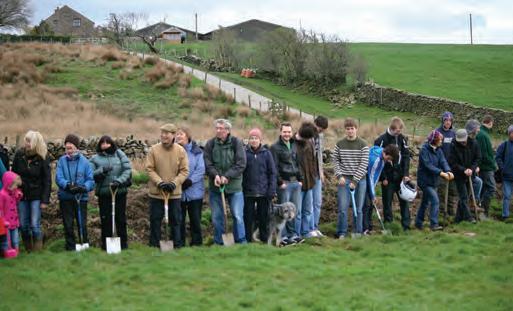
Flowers to the people
Numerous homeowners across Britain and the world are giving people a break from the busy modern world—by letting them sit in their gardens.
The Quiet Garden Movement, which has more than 250 sites in the UK and another 50 or so everywhere from Uganda to Australia and India, was set up in 1992 by Philip Roderick, an Anglican priest based in Oxford.
“My initial vision was for just one garden [the first was at a house in Stoke Poges, Buckinghamshire], but it’s grown and grown,” he says. “It’s all about the application of stillness and beauty, combined with the homeowner’s hospitality. We want people to refuel, reflect and replenish, at low cost and on a local level. We’re so sound-soaked these days, it’s become hard to find a place to sit and listen to quiet.”
The gardens, which attract anything from a couple of dozen visitors a year to more than a thousand, are found at rural English hideaways, exotic South African retreats, and in ultra-urban areas—such
58 readersdigest.co.uk february 2013 mike pye
Residents at the inaugural broadband dig at Quernmore, Lancaster
A

as the priest’s garden at St Joseph’s Church off Bunhill Row in London. The homeowners come from a variety of backgrounds, from retired GPs to estate agents, but all are united by wanting to share the joy of nature with others.
“People who come here write, draw, read poems or wander round admiring the beauty of the flowers,” says former teacher Penny Lovelock, who, with the
help of her friend Jan Ingle, opens up her tithe-barn home and grounds in the middle of Newbury, Berkshire, four times a year. She says that the 40 or so visitors she gets “have an hour or two of very friendly, warm silence, and it’s amazing how many solve huge worries or see things in a far broader perspective than when they arrived”.
“The gardens don’t have to be immaculate
or beautifully kept, either,” says Pepi Hughes, a housewife from Shaftesbury, Dorset, who’s been allowing the public onto her property since not long after the movement started. “I always say that the nettles are as good as [anything]. They’re all part of the natural world, and can release whatever blocks and barriers people are experiencing.”
Visit quietgarden.org ►
COURT e Sy OF pe NN y LOV e LOC k
quiet moment in Sudeley Castle’s Tithe Barn Garden in the Cotswolds
59 readersdigest.co.uk february 2013
The Wild West comes to Kent: Laredo is a fullsize reproduction of a Texas town circa 1860
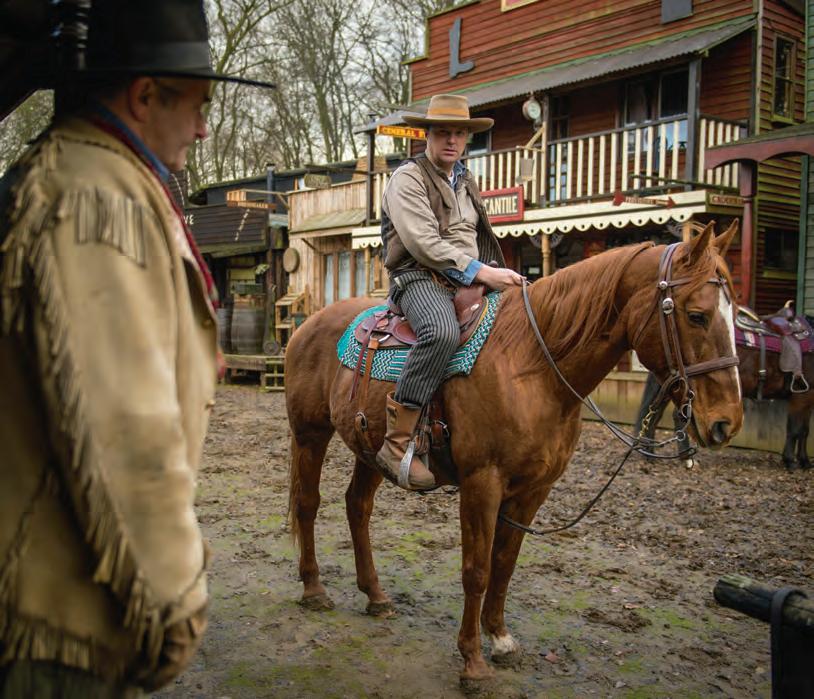
The mild bunch
If you’re an Apache warrior planning to book a mini-break in southern England, you might want to avoid Kent. Every weekend, some 40 Wild West enthusiasts dress up in cowboy costumes and come to stay in Laredo, a full-size reproduction of a Texas town circa 1860.
The 24-building settlement was founded by local pig farmer John Truder 40 years ago, and now has a school house, an undertaker’s, a gunsmith’s, a general store, and—of course—a marshall’s office
and jail (the Garden of England can be a lawless place). Most of these are only for show, with Laredo’s citizens mainly drinking in the saloon and playing pool and poker. But residents pay for the town’s upkeep partly by staging Wild West demonstrations, such as bank robberies and gunfights, for specially invited visitors, or at other fetes and fundraising events. Laredo is also used for advertising and film shoots. Stars who’ve walked up Main Street include Dawn French and Jennifer
60 readersdigest.co.uk february 2013 ph OTOS by ALASTA i R p ULL e N
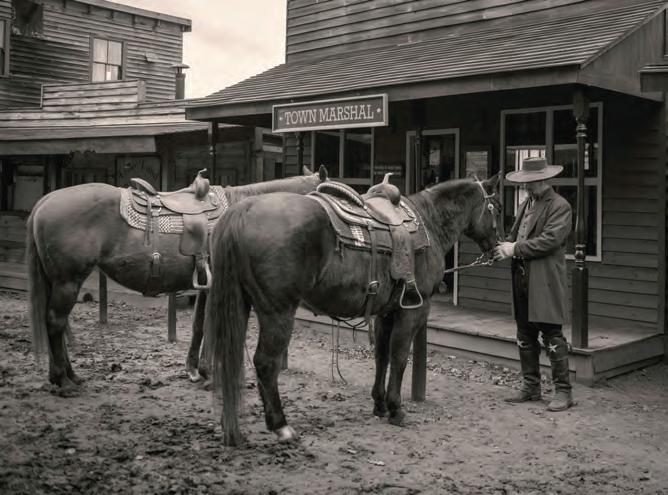




Saunders, Johnny Depp (for Finding Neverland), and the cast of Red Dwarf Membership is limited. “There’s a three-month probation period,” says Cole Winter, a builder from Tonbridge who’s been coming to the town for 24 years. “We’re looking for family-orientated folks who can help out with town maintenance. Most of the time, we don’t use electricity; that’s the beauty of coming here—no TVs, no computers. We get by with candles and oil lamps for lighting, and wood-burning stoves for cooking, just like in the old days. That said, we make an exception when repair work needs doing. We fetch out
the power tools and plug them straight in. There are electricity points in Laredo, but you need to know where they are!”



Like many of his fellow residents, who come from all walks of life, Cole got his love for the Wild West from a childhood watching cowboy films. He later took part in cowboy re-enactment groups before deciding to commit even more of his time to living the frontier dream at Laredo. “I used to play football for Maidstone United, but gave it up for this,” he says.
And where exactly is Laredo? Ah, now that would be telling, wouldn’t it? The good townsfolk don’t want a bunch of outlaws coming to call. See laredo.org.uk town maintenance. Most where they are!” the watching He later took part in to commit even more frontier dream at Laredo. “I used to play football for Maidstone United, but gave it
61 february 2013 readersdigest.co.uk
►
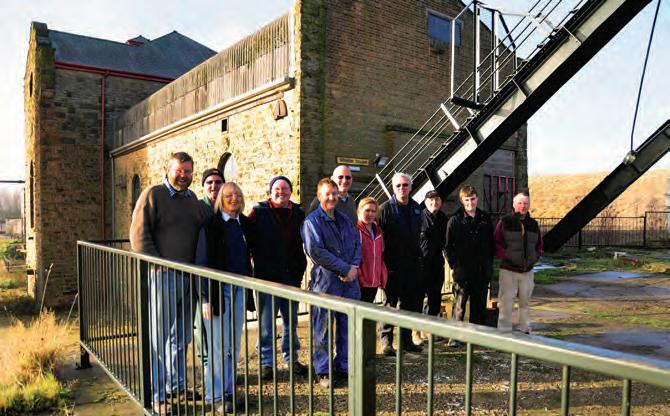
Up from the depths
For a century, Pleasley Colliery in north Derbyshire provided work for more than 1,000 people. Then, in 1983, it closed and fell into decay and disrepair.
The locals were upset, but that turned to anger a few years later when proposals emerged to flatten the site for landfill. That was rejected on environmental grounds, but residents realised they’d have to do something to preserve the mine if it wasn’t going to be lost to a future development. So, in 1996, a group of 20 people formed Friends of Pleasley Pit, which would try to restore the site.
The group of former miners, agriculture workers and even a hairdresser began clearing weeds, repairing roofs and restoring machinery. They funded their work by selling scrap metal, getting assistance from heritage bodies, and even selling tea and buns at local events.
The mine site is so big that their work continues to this day. “It’s been backbreaking and sometimes soul-destroying,” says Robert Metcalfe, a former mine
surveyor and a founder member of the group. “Everything’s on such a huge scale —some of the spanners are four feet long, and take two people to lift. And it’s pretty grimy and filthy, too, scraping layers of grease and paint off old machines.”
Yet Pleasley, near Mansfield, is no longer a village with a rusting eyesore at it’s heart, but a lovingly restored heritage site, open daily to the public.
You can’t go down the shafts—they’re filled with stone to be safe—but one of the winding engines is back in full working order, and many of the old buildings and chimneys are almost as good as new. English Heritage recently recognised the Friends with one of their Angel Awards.
“This pit meant a lot to people in this area,” says Robert. “Everyone had a father, son or brother working here. We didn’t want future generations to forget their mining heritage, so we’ve pulled together and got on with restoring it. And I’ve never heard anyone say it wasn’t worth it.”
Visit pleasley-colliery.org.uk n
62 readersdigest.co.uk february 2013
MARTIN
From mine to museum: the Friends of Pleasley Pit outside the Engine House
STUBBS
Now it’s easy to find your way around the internet

There are billions of websites out there, with new ones added every day. So how do you find the ones that are safest, most reliable, most useful and most popular?
That’s where kadaza.co.uk comes in. It’s a visual homepage that gives you a clear display of the most reliable and popular websites, grouped into themes such as shopping, news or finance.
Research has shown that only a very small fraction of the websites out there are used frequently. So by carefully selecting the most popular online resources, Kadaza makes using the internet much easier.
Make Kadaza your homepage
Just go to kadaza.co.uk and click on ‘set as homepage’
You can personalise Kadaza by changing the logos on your homepage. For example, if you prefer The Telegraph to The Guardian, then you can replace the Guardian’s logo with the Telegraph’s.
Kadaza uses logos and eye-catching colours, so you can see instantly what you’re looking for.
All the sites that interest you are on one page. So if you like travel, you’ll find booking sites, price comparison sites and holiday sites all together.
One click takes you straight to where you want to be; no more chasing around through bookmarks and links.
Every site on Kadaza has been researched, so you can be sure you’re surfing the most reliable websites.
Kadaza is FREE. Just go to kadaza.co.uk – you don’t need to register.
With Kadaza as your homepage, you’ll save time, and find using the internet easier, safer, better.

Advertisement Feature
you FREE NO REGISTRATION REQUIRED
Making the web easier for
Clare Balding ‘‘I remember...’’
...candy, my mother’s BoXer. I remember all the creases in her face. She was a very sturdy dog, and I learned to walk on her (I know most people used a stroller; I used a dog). I used to pull myself up on her rolls of fat and waddle behind.
...mUm was always there, whereas dad wasn’t so mUch. She was sensible and gave me very solid advice. She told me, “If you think boxers have a lovely face, the world will be a beautiful place.”
My father [horse trainer Ian Balding] always worked hard and imbued in me a strong work ethic. My mum was always keen on good manners—her reaction to me winning an award recently was to text me saying, “Please don’t swear.” She would always say, “You should write to say thank you to people.”
I was outspoken and insecure—which is weird, but I think you can be both— and very concerned with fitting in. I was curious, interested in life and in knowledge, and I adored animals. I was riding every day—that was my freedom.
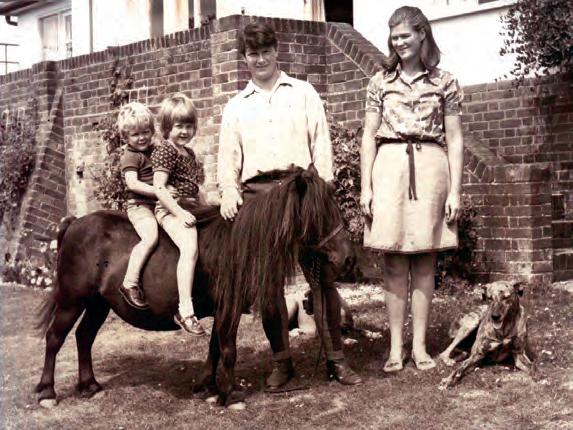
and I adored animals. I was riding riding. it




so it probably happened
...late-night horse riding. On the longest day each summer, my parents would organise a midnight ride (it wasn’t really midnight, but they told us it was, so it probably happened at about eight o’clock!). So we rode up to the ►
So we rode up to the

Clare with brother Andrew on Valkyrie, and their parents
Emma and Ian

Sound as a hound!
Even at three, Clare loved dogs
[Hampshire] Downs [near Kingsclere, where Clare grew up], jumping all the way up, and we’d have a big picnic. I took Frank, my favourite pony, a few times. It was a proper adventure.
...giving oUr dogs
Birthday parties. When my dog Flossy turned six, and I was seven or eight, Mum made this amazing cake out of Bonio biscuits, vegetables and dog food. It had candles on it and everything. We had a bay window and a bench table, and there was Flossy sitting in state at the end of the table as I blew out the candles.

Clare and Andrew were keen on sport, to say the least

...going off to Boarding school. I was ten. I missed the dogs terribly, and wrote to them.
I remember, on the first weekend, changing into my flares and my jumper that grandma had knitted. Everyone else was wearing drainpipe jeans and ankle boots. I looked different—and not in a good way! Instinctively, I wanted to be part of “the gang”, but did some silly things to get in it, such as shoplifting— not clever, and I got caught.
I wonder if there’s anyone who says, “Yeah, I fitted in—I was fine, and it was all brilliant!” Maybe this is just the journey we all go on together. But I think that’s the thing I would try and change, not for
myself (I can’t), but for other children. I’d say, “Be confident enough to be yourself. Don’t adapt.” It’s something that can hit you at any stage of life—in your teens or at 20, 30, 40. We still, to a large extent, feel the need to fit in. But actually, we’re much more interesting when we’re different.
...loving BooKs. I remember reading
Shirley Conran’s Lace—oh, my word!
“Which one of you b*****s is my mother?” Great line! I met her recently at a literary event in Shoreditch and she was fantastic.
I also loved the Brontës, particularly Wuthering Heights, which I first read at 15—a great age to read it, and I re-read it recently. It’s about being an outsider,
66 readersdigest.co.uk February 2013
◄ PERSONAL PHOTOGRAPHS COURTESY OF CLARE BALDING
You learn from it, because God, bloody hell, what’s the point going through it if you’re not going to learn?
basically, and what’s more important: who you love, how you love them, or who they are in society?
...not getting a place to read law at camBridge. I got turned down by Bristol and Exeter, too. Awful! When things happen to you at that age, it’s such a big deal, because you are your whole world; you’re not in a relationship, you’re still at home, you’re in your teens.
I went riding for two hours to give myself time to think, What am I going to do? This is what I’ve aimed for, and I’ve failed.
It’s interesting—take [Olympic rower] Katherine Grainger. She couldn’t try again to win the Olympic gold the next year [after getting silver in Sydney 2000]; she had to wait four years. But she tried again
and again, and eventually she got her gold. So all I did was try again immediately —I went to a grammar and got my history A level up to an A.
I still only had two As and a C, which is not great. But Newnham College [at Cambridge, where Clare then studied English] values having an emotional intelligence, possibly more than academic qualifications. Cambridge is a beautiful place and I just loved it.
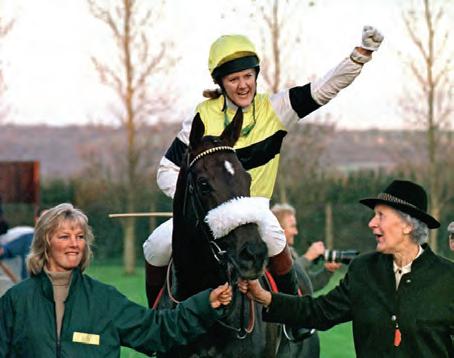

...my amateUr riding career. I rode the most from age 17 to 19. The high point was winning the Lady Riders’ Championship in 1990—and my weight in champagne. That was great—result! I was heavier than the other jockeys at the time; the girl I was riding against the most barely weighed eight stone. I struggled to do ten stone. So I cost them quite a lot in champagne! The low, though, came the year before. I thought I was going to win the championship, but got beaten in the last race.




I think it hits you quite hard, but you learn to set yourself a new goal—that’s very important. And you learn from it, because God, bloody hell, what’s the point in going through it if you’re not going to learn? My new goal was go back, try again, win it; and going to win the championship, you learn to set yourself a new
you learn from it, because God, bloody point win ►
67 readersdigest.co.uk February 2013
BARRY BATCHELOR/PA ARCHIVE/PRESS ASSOCIATION IMAGES
Clare wins the K J Pike & Sons Celebrity Charity Flat Race at Wincanton



street. It was a very people’s passion for This really matters atlanta in 1996. ended up doing the mountain biking, too, ◄
get into Cambridge. So in each of those I’d been knocked back and thought, No, I’ll go back and try a different approach to the same target.
...Joining the BBc. I wanted to change the way people think—to have an impact. Then I met [BBC horse riding correspondent] Cornelius Lysaght and he said, “Would you like to come for a voice test for radio?” I’d done a lot of debating, but I hadn’t thought of radio as a medium for me, and there weren’t many women in sports broadcasting at the time. But I was very naïve. I’m not sure I even realised that I was doing something unusual.
I freelanced for Cornelius for what was Radio 5 then. It became 5 Live on April 1, 1994, and I started as a trainee that day. They were looking to make a new kind of sports reporter to suit 5 Live, so they put me on the traineeship to try and achieve that; I don’t know whether they succeeded! They got me presenting football, rugby—everything.
My first broadcast was from Highbury; Arsenal were parading in 1994 when they won the Winners Cup. I did vox pops in the
street. It was a very alien environment for me; I didn’t know much about football or Arsenal. But I loved people’s passion for the club. I thought, This really matters to people.
...my first olympics in atlanta in 1996. I went out to do the equestrian events but ended up doing the mountain biking, too, because it came through the horse park. I didn’t know anything about it! But I stood myself next to the British coach and got him to explain everything.
...the wonderfUl reaction of Bert le clos to his son chad’s victory against michael phelps. It was probably my favourite moment of London 2012—I think a lot of people really connected with it.
My intention throughout presenting London 2012 was to make you feel like you were sitting right there with me. I guess what you didn’t share (because you couldn’t) was going to Westfield after the games finished—me, the pundits, the swimming team, and my researcher Jonathan—to have dinner. And, two nights after Bert’s interview, I bumped into him in Westfield. He said, “Oh, my darling, come here! We have gone viral, you and me!”
...Being happy. I was lucky enough to be born with a positive outlook on life and I’m good at dealing with things that annoy me; I put them to one side. I’ve learned to
68 readersdigest.co.uk February 2013
Clare and Bert le Clos in the interview that defined the summer
deal with pressure. I still get frustrated if I get stuck in a traffic jam, but I tend to displace my stress so that it doesn’t consume me. I think, Why wouldn’t I be happy? I live the most amazing life—a life I wouldn’t have even dared to dream of.
Alice [Arnold, Clare’s civil partner] and I have been together for ten years and it’s made me a better person, because she’s calm and wise. I can be quite easily impressed by people and events, and Alice isn’t. I’m glad the reaction last summer happened to me now and not ten years ago, when I think I’d have been a bit over-impressed by it.
When you get told you have cancer, it’s hard to smile and say, “Oh, whoopee”
after the Grand National, and I need to be back for the [Epsom] Derby. So can you make sure you don’t damage my throat when you cut into it?”
For me, that was the way it worked best—and it hasn’t done me any harm, because I’m here today. I just don’t think about it now.
...coping with thyroid cancer. Of course, when you get told you have cancer [Clare was diagnosed in 2009], it’s hard to smile and say, “Oh, whoopee.” You’re dealing with shock and fear, and those are really difficult things to compute. So it’s very important for anyone to know that other people have been there and got through it; it can be treated successfully.
I was pretty positive and carried on working—I gave myself goals. I fitted the treatment into the racing calendar and said, “I’ll have my first operation two days
...finding people with passion the most interesting. Sport is full of people with passions. But I met some taxidermists a couple of months ago for [BBC Radio 4’s] Ramblings, and they were really passionate about what they did—something I know nothing about. They know tons. If they picked up a feather they wouldn’t just know it was an owl’s feather, they’d know what type of owl and what condition the bird was in when it lost it. People’s passion drives me on. If you’re eternally curious, you’ll never be bored. ■
As told to Ellie Rose
» Clare fronts npower’s campaign
“Remember How We Used To”, which celebrates the effect labour-saving devices have had on women’s lives.
See historypin.com/rememberhow
reader spot/ off-road vehicles
I do think this sign near my home—with a sheer drop on the other side—is very useful.
I hope the authorised vehicles take note, too.
Submitted by Sandy Nordbruch, Isle of Wight

69 readersdigest.co.uk February 2013
Is a Pension Worth It

or are you better off sinking your money into wine, gold or fast cars? We examine how eight very different investments of £20,000 would have performed over the last 20 years
by sarah jagger
70 readersdigest.co.uk february 2013
ferrari 365 GTS4 dayTona: 1992 waS £200k. now

ClassiC Cars
As with antiques, buying the right vehicle to reap future rewards requires a lot of know-how. According to Dietrich Hatlapa, founder of Historic Automobile Group International, which tracks prices, “rare classics”—where 1,000 or less were made—have gone up by as much as 367% in the last 20 years. You could have laid your hands on a 1960s Jaguar XKE (E Type) Roadster in 1992 for £20,000, or bought a share in a more expensive car, such as a Ferrari 365 GTS4 Daytona, one of which recently sold for £595,000—up £395,000 on its 1992 value. Cars escape capital-gains tax, as they usually have a working life of less than 50 years.
l How much would your £20,000 be worth now?
£90,000+ for a well-chosen car.
l Where should you invest your £20,000 for the next 20 years?
Your £20k could buy an MG Midget, Alfa Romeo GTV or early 1970s Porsche 911T. “These cars were produced in large numbers, but are unlikely to lose value. You’re not guaranteed to make money from them, but you’re guaranteed the fun factor.”
l Find out more: read specialist magazines and join an owner’s club; historicautogroup.com ►
71 february 2013 readersdigest.co.uk
Peter Dazeley/getty images (left)
£595k
Gold
The price of gold has gone through the roof since the recession took hold in 2008. “Gold is viewed as a safe-haven option in times of economic turbulence,” explains Philip Pearson at independent financial advisors P&P Invest. However, between 1992 and 2002 the price dropped by 30% following Gordon Brown’s decision to sell the majority of the Bank of England’s gold reserve. Overall, though, an ounce of gold has risen to historic highs of $1,788 from around $380 in 1992.
l How much would your £20,000 be worth now? £82,588 (after capital-gains tax).
l Where should you invest your £20,000 for the next 20 years? You can buy gold sovereigns or bars through specialist traders such as bullionvault. com or goldline.co.uk, or invest in a fund that tracks the price of gold through an index. But, warns Philip, “the price will rise further only if financial markets experience significant setbacks or inflation takes off ”.
l Find out more: investgold.org; pandpinvest.com
Wine





wine-and-spirit merchants Berry Bros



If you’d sunk your money into hundreds of bottles of supermarket plonk back in the early 1990s, your returns might not be very exciting. But, says Sara Guiducci of London wine-and-spirit merchants Berry Bros & Rudd, a carefully selected portfolio of top wines could have brought a phenomenal return.


Brion, say, bought for £324 in 1992, £1,800 case of Le Pin Bordeaux

A case of 1990 Château HautBrion, say, bought for £324 in 1992, would now be worth £4,895. A £1,800 case of Le Pin Bordeaux wine would now go for £42,000.
l How much would your £20,000 be worth now? £381,118 (and wine avoids capital-gains tax) for a portfolio of 46 crates of ten types of expertchosen wine.
l Where should you invest your £20,000 for the next 20 years? The wine trade is unregulated, so it’s a good idea to buy through trusted merchants who’ll tailor a portfolio for you. You have to pay to store your wine “in bond”, and the merchant takes a commission when you decide to sell the wine. The last two decades were particularly good for wine, though, cautions Sara, so don’t expect quite such spectacular returns.

caSe of 1990 chÂTeau hauT-Brion: 1992 waS £324. now £4,895


l Find out more: bbr.com; influential wine critic Robert Parker at erobertparker.com



72 readersdigest.co.uk february 2013
ProPertY
House prices in the UK have risen 214% over the past 20 years, according to Nationwide, with London the strongest performer at 326% and north-west England at just 146%. If you rented out your property at an annual rate of around 5% of its value, you’d have also earned—less maintenance, tax and insurance—around an extra £28,000, though this figure differs widely from area to area. Buy-to-let property is subject to capital-gains tax— usually 18% of your profit, with the first £10,600 tax-free.
Pension
l How much would your £20,000 be worth now?
£79,964, adding rent, but subtracting capital-gains tax and assuming you never have a mortgage.
l Where should you invest your £20,000 for the next 20 years? Property values are already very high and are likely to flat-line over the next few years. But Ray Boulger of mortgage broker Charcol recommends acquiring buy-tolet property and investing in two new residential-property funds that “can accept investments of a minimum of £1,000 through [tax-reducing] SIPPs or ISAs”.
The T M Hearthstone residential-property fund aims to produce a capital return as close as possible to house-price growth, as well as paying dividends from net rental receipts. Castle Trust HouSAs offers three-, five- and ten-year bonds, the returns on which aim to track ahead of the Halifax House Price index.

“The pensions industry has seen many changes since 1992,” says Francis Klonowski of financialplanning firm Klonowski & Co, “including the phasing out of final-salary pensions and the new automatic-enrolment scheme NEST.”
But he believes a pension is still one of the best ways of saving for retirement: “Tax relief on contributions means an immediate boost to your investment. You also get tax-free growth (apart from the tax credit on UK dividends) and 25% tax-free cash at retirement. Annuities may be much maligned, but using your pension fund in this way does at least guarantee an income for life.”
l Find out more: hearthstone. co.uk; castle trust.co.uk; charcol.co.uk
l How much would your £20,000 be worth now? £83,411, based on an Association of British Insurers average, taking tax relief into account.
l Where should you invest your £20,000 for the next 20 years? Invest £15k of it into a pension, but boost it with a £5k stocks-and-shares ISA to add capital, reckons Francis.
l Find out more: annuitybureau. co.uk; klonowski.advisernet.co.uk; dwp.gov.uk/thepensionservice
73 february 2013 readersdigest.co.uk Dan kitWooD/getty images
►

antiques
Investing in antiques without expert knowledge is something of a lottery—and even those in the know can’t predict the future with any great certainty.
“Fashion dictates an item’s value,” explains Judith Miller, Antiques Roadshow expert and creator of Miller’s Antiques Handbook & Price Guide (£30). “For instance, brown furniture hasn’t performed well over the past 20 years as most of my daughters’ generation want something from IKEA.”
But Chinese porcelain, particularly imperial ware, has boomed: “Chinese billionaires who grew up under Chairman Mao’s rule didn’t know such exquisite porcelain existed, so are now buying it up. In 1992, I sold two pieces for £3,500 to pay for my daughters’ school fees. Today, these pieces would be worth over £250k. I’ve held it against them ever since!”

18ThcenTury yonGzhenG
vaSe:
1992 waS £20k. now £2.6m
l How much would your £20,000 be worth now?
£250,000 to £400,000, if invested in 16th-century Chinese porcelain. Up to £1m for Kangxi imperial ware and £20m for Yuan dynasty items. Brown furniture?
Less than £10,000.
l Where should you invest your £20,000 for the next 20 years?
Judith expects investors to move on to Chinese export porcelain and anything Russian—particularly enamels—as rich former Soviets are now also buying back their heritage.
l Find out more: millersonline. com; From Trash to Treasure by Judith Miller (Reader’s Digest, £27.99).
74 readersdigest.co.uk february 2013
courtesy of tennants.co.uk/millersonline.com
Premium bonds

Premium Bonds are the most popular savings product in Britain—more than a third of us have them. You can invest from £100 to £30,000. Rather than earning interest, you gamble the money accrued each month in the hope of scooping a prize of up to £1m tax-free—but your original lump sum is safe.
“There have been 42 Premium Bond millionaires with a holding of £20,000,” says Chris Dowsett at National Savings and Investments, the state-owned organisation that runs the scheme.
Woodland
“In the last five years, woodland values have doubled in the UK, but you can still pick them up from £3,000 to £10,000 an acre,” says Chris Colley at woodlands.co.uk. Most people buy a wood to get close to nature, but you can invest in commercial forests, too—making an average of 5% of your investment per annum.
“While demand for timber in the West has fallen since 2008, demand in the developing world has been increasing, particularly in China,” says Anthony Crosbie Dawson of Forestry & Renewable Energy Investment Management.
l How much would your £20,000 be worth now?
£34,040.80—your average winnings over 20 years would be just over £14,000.
l Where should you invest your £20,000 for the next 20 years? Your odds of scooping £1m at some point are currently around one in 9,000.
l Find out more: nsandi.com

l How much would your £20,000 be worth now? £81,340 (plus around £50,000 in earnings from commercial woodland).
l Where should you invest your £20,000 for the next 20 years? “Worldwide timber shortages mean that prices are likely to increase,” says Anthony, whose firm offers “forest fund” investment schemes. The majority of income from the investment is tax-free, including captial gains.
l Find out more: woodlands.co.uk; fimltd.co.uk n
75 february 2013 readersdigest.co.uk

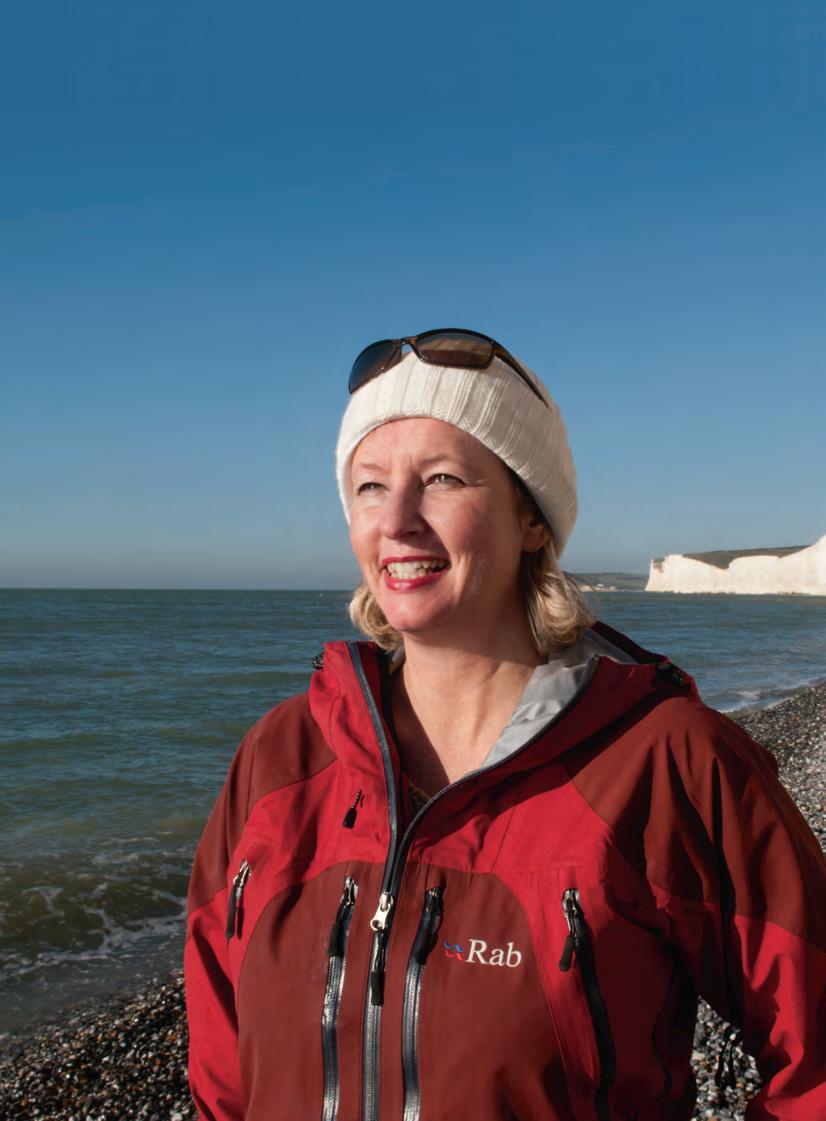

Kicking the Bucket List



A LIFE LESS ORDINARY

always wanted to visit the North Pole, be a rally driver or write a novel? then just do it, reckons Paula reid—her life’s been one long adventure to prove it
A South Atlantic wave crashed over Paula Reid’s head, knocking her off her feet and rolling her yacht onto its side. The vessel didn’t right properly, and water started coming into the cabin through the vents. Disorientated and terrified, Paula clung to a winch. She was clipped onto the deck by a harness, but knew that she could be swept overboard at any moment. Her crew mates on the submerged side of the boat were up to their chests in water. The 30-foot spinnaker pole had snapped in two, and the sail was ripped and dragging in the water.
Paula—then a 37-year-old internal communications worker from Clapham, London—only had two months’
by ruth aDDicott
PhotoGraPheD
by
lionel DeriMais
77
►
◄ sailing experience, yet here she was, deep in trouble, just 16 days into Team Stelmar’s attempt at the 2004–5 Global Challenge round-the-world yacht race. Eventually the boat righted, the sail was repaired, and Team Stelmar reached the race’s finish at Portsmouth in a respectable sixth place. But that was nine very tough months later. So why had yachting novice Paula let herself in for such a gruelling, terrifying ordeal?
“Moments like that [the boat turning over] is when the adrenalin kicks in and I feel alive,” she says. “That’s when I know I’m living life to the full.”
For the last 28 years, Paula has dedicated much of her life to completing 99 of an ever-expanding list of 130 adventures and lifetime ambitions that she started compiling as a teenager. So far, she’s climbed a Javan volcano, travelled in a hot-air balloon, kayaked the length of the Thames, dived with sharks, swum with dolphins, been to Kathmandu and Las Vegas, and climbed the Alps.
In person, Paula, 45, is quietly spoken and doesn’t look like your usual adventurer. But she talks passionately about her extraordinary and sometimes inexplicable need to take in as many new experiences as possible. “It’s just an internal drive,” she says.
Paula grew up in the solidly normal village of Copthorne, West Sussex. But, even as a small child, her inherent need for thrills was apparent—she had a fascination for wandering into fields where there were bulls, for instance. And her love of adventure began in earnest when she was 15.
“I went on a school trip to an Indian
►
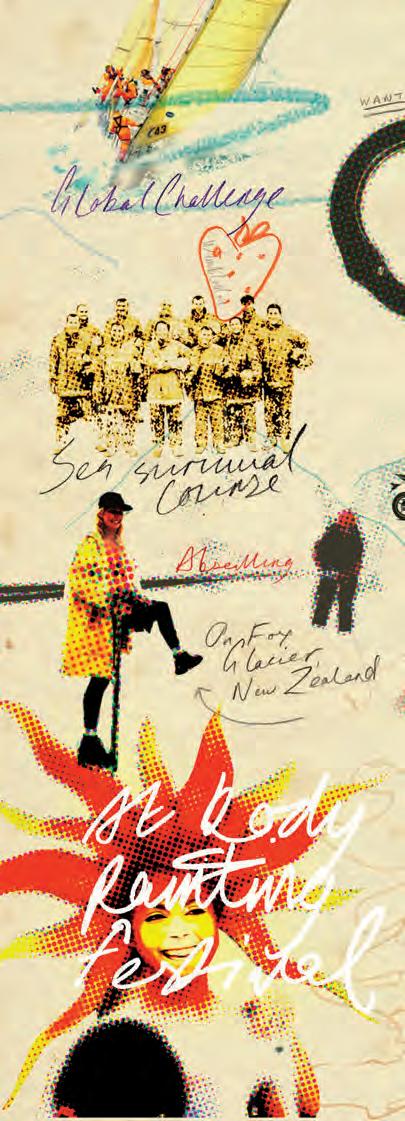
78
illustration by
cheryl taylor
So much to do, S o little time…
As well as the ones we’ve pictured, Paula’s exploits so far include:
► Climbing a 95-foot mast
► Touring the Grand Canyon in a helicopter
► Visiting Hiroshima
► Having a poem published
► Stroking a cheetah
► Going to Wimbledon
► Attending five Grand Prix
► Visiting the Great Barrier Reef
► Seeing an opera in Sydney and Prague
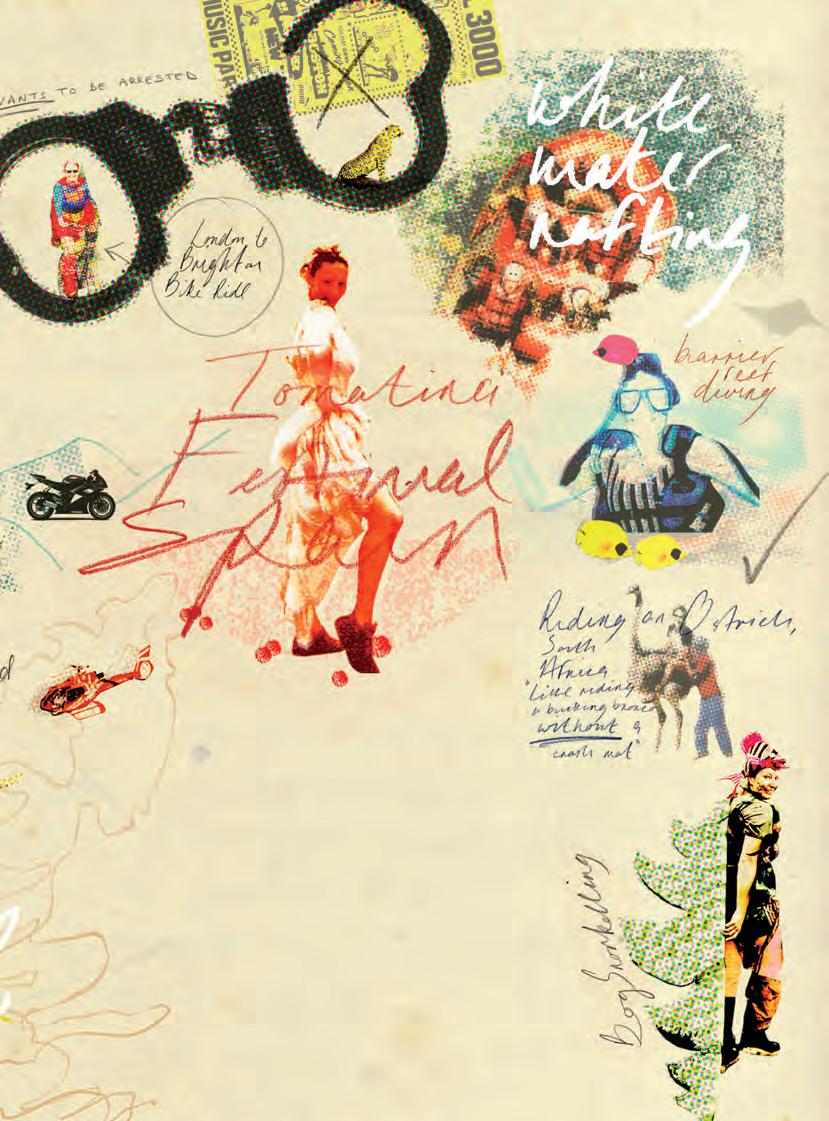
And on Paula’s to-do list:
► Take part in the Gumball 3000 Rally
► Go storm chasing
► Learn to whistle
► Pass her motorbike test
► Go on a TV show
► Ride a manta ray
► Follow the Silk Route
► Take part in a flash mob
► Stay in the Ice Hotel, Sweden
For the full bucket list, visit paulareid.com/bucket-list.php
village to renovate an old well and build a community centre,” she recalls. “It was a huge experience at that age. We slept in tents, and were woken up one night to be told that there were tigers close by and to keep an ear out. I remember thinking, This is so exciting!”
She began her bucket list when she was 17 and, after leaving school, took every job she could lay her hands on— chambermaid, landscape gardener and travel agent—to try to fund some of her ambitions. By February 1990 she was in Malaysia fighting a cobra. This hadn’t been the first thing on the 23-year-old’s list—it happened during a nine-month trip around the world—but the sixfoot snake had been spotted outside a guest house and the owners were scared to kill it in case it contained “spirits”. Attempts to pull it to the nearest temple simply resulted in the cobra getting angry and spitting a venom that can cause blindness, so Paula grabbed a kitchen knife and dispatched it.

“I’ve got to live life to the full,” says Paula Reid

“I was mortified,” she says. “It was such a beautiful creature. But it was the best I could do in the circumstances. And I’d set out to collect experiences, so this was just added to the list.”
Paula spent most of the next four years doing a teacher-training course, but then took more temporary jobs to fund fresh adventures, including a skydive in August 1996 and riding a death slide
down a New Zealand mountain the following year.
One of Paula’s philosophies is “do what the locals do”. So when she found people swimming in the piranha-infested waters of the Amazon during a trek up Peru’s Inca Trail in late 1999, she jumped in, too. “The piranhas looked like they do on TV, with big teeth,” she says. “They’re not dangerous…as long as you’re not bleeding.”
She was somewhat less nonchalant during a dive into the 400-foot Great Blue Hole off the coast of Belize. She got a nose bleed, and surfaced to find bull sharks circling and people shouting at her to get back in the boat.
80 ◄ readersdigest.co.uk february 2013
◄
After ticking off the Tomatina Tomato Throwing Festival in Buñol, Spain (wearing a white wedding dress), and paddling the Mekong River in Cambodia in a dugout canoe, by 2004 Paula was looking for an even bigger challenge.
By now, Paula was in her permanent internal communications job—which she loved—but she was stuck in a rut. So that’s when she decided to enter the 35,000-mile Global Challenge, which began that October, with Team Stelmar even though her only previous sailing experience was a trip with her uncle when she was ten that made her seasick.
“It was the size and scale of it that appealed,” she says. “That feeling of racing and performing 24 hours a day, every day, for ten months.
a force-ten gale and had a man overboard just ten hours after leaving Portsmouth. Two weeks later came the storm that almost sank the yacht, while the frigid Southern Ocean brought 70-foot waves and broken ribs and arms for her crew members.
“It was the toughest thing I’ve done, but also the most amazing. When you’re on the peak of a wave with albatrosses above and the Milky Way lighting up the sky, it’s just incredible.”

“Don’t limit yourself. If you give yourself labels, you’ll live by them”
She had to fund the £27,000 cost of entering and training for the event— which allowed ordinary people to join one of the 12 crews—by borrowing money from her parents and remortgaging her flat. And, three weeks before she was due to leave, she nearly pulled out.
“I was really scared and dreaded making a mistake. Then my father took me aside and said my mother was really worried and wasn’t sleeping. The whole thing was a huge decision. My mum is important to me, I love her, but I knew if I didn’t do it, I’d regret it for the rest of my life.”
Paula was seasick as soon as the race started, but that was the least of the crew’s worries. Team Stelmar encountered
For a few months after returning, Paula found curling up with a cup of tea was bliss. She wrote a corporateadvice book, Boat to Boardroom (£24.99), and started doing motivational talks. But it wasn’t long before her bucket list came calling. In 2007, she entered the World Bodypainting Festival, and was an extra in The Bourne Ultimatum. In 2008, she climbed Mont Blanc and, in 2009, did the 191-mile Coast to Coast Walk in northern England and spent Christmas in Lapland.
By July 2011 Paula had been to 50 countries, but had a hankering to go to the remote jungles of West Papua, New Guinea. She organised the trip herself, and her ad hoc guide was a tribesman— wearing nothing but a penis gourd—who she met on a mountain path.
At the end of this adventure, Paula contracted a tropical sore and had to go to hospital. “I was put in a bed next to a woman with an axe in her head—still alive,” she says.
Paula is now preparing to do a wing
81 february 2013 readersdigest.co.uk
►
walk, recently stayed in the Beachy Head lighthouse, and is trekking to the North Pole next year.
Paula admits that much of what she does is purely for self-satisfaction, but her bucket list has also included volunteering for Trinity, a local hospice, and the RNLI. She’s raised thousands of pounds for charity. As an author, motivational speaker and leadership coach, she’s also used her experiences to inspire workers at companies such as RBS, Barclays and Unilever.
She encourages everyone to write a list of things they want to do before they die—however modest.
“It could be sleeping under the stars or reuniting with your long-lost father.
As long as you want it, anything goes. Don’t limit yourself with labels: ‘I’m not good in the mornings’; ‘I’m not ambitious’; ‘I’m not very sporty’; ‘I can’t sail’. So? Learn! If you give yourself labels, you’ll live by them.
“I’ve learned I can cope in some very tough, unusual situations. I think we’re much more capable, strong and resilient than everyday life allows us to be.”
She’s never married or had kids, but says, “I love my life as it is. I don’t have a surround-sound stereo, quality jewellery or furnishings, but I do have incredible memories. When I’m drawing my last breath, it’ll be with no regrets.” ■
» World’s Most Dangerous Jobs by Paula Reid (£9.99) is out now.
THE OBSESSIONS OF THE RICH AND FAMOUS
The recent news that US rapper Snoop Dogg is weighing up an investment in Celtic Football Club may have raised a few eyebrows, but it’s far from being the least likely celebrity sideline
Veteran film critic Barry Norman never intended to share his delicious home-made pickled onions with the general public, but a marketing friend apparently persuaded him otherwise. You can find out more at the, erm, Pickleodeon website.

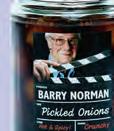

Many Hollywood stars have decent houses, but Kim Basinger purchased the entire town of Braselton in Georgia, with the intention of turning it into a tourist attraction. It wasn’t the smartest investment—she eventually sold it at a huge loss and filed for bankruptcy.
Much like Heidi Klum and her “Fruit Flirtations”, tennis pro Maria Sharapova launched her own line of sweets called Sugarpova. A terrible pun, of course, and not exactly the first product you associate with a grand-slam champion.
MC Hammer, of “U Can’t Touch This” fame, is now planning to take on Google with his new “deep search” engine



WireDoo. “If you want to swing
. “If you want to swing the bat, why not swing for the fences?” is his answer to charges of insane ambition.

82 readersdigest.co.uk february 2013
◄
Things used to be simpler.

Remember when you only had one bin.
Life may feel more complicated than ever, but with Reader’s Digest home insurance all you have to do is pick up the phone to one of our UK based advisors to get all the cover you need. The times have changed, but we haven’t forgotten that simple is sometimes better.
Advising our customers on an ever changing world for decades. Home Insurance 0800
Vivat Finance (trading as Reader’s Digest Financial Services) is an Introducer Appointed Representative of Commercial Vehicle Direct Insurance Services Limited for general insurance products. Reader’s Digest Financial Services is registered in England No. 07205138. Registered Office: 157 Edgware Road, London W2 2HR. Car Insurance is provided and administered by Commercial Vehicle Direct Insurance Services Limited. Authorised and Regulated by the Financial Services Authority (Number 302216). 3297RD/0213
022 3822

scents and sensibility
by lois rogers
84
It’s the classic Valentine’s gift—but what really lies behind that bottle of perfectly packaged fragrance?

What are Perfumes made Of?
They get their fragrance from essential oils extracted from aromatic plants—rose, jasmine and lily are industry favourites—or laboratory-created molecules that mimic a single natural odour, or combination of odours. Synthetic smells are usually cheaper to produce than natural ones. Less than ten per cent of the world’s vanilla fragrance—found in everything from Britney Spears’s Hidden Fantasy to Avon perfumes—comes from plants, for instance.
Perfumes also contain natural or synthetic fixatives to slow down the fragrance’s rate of evaporation on the skin and stop it going off. But the main ingredient in your average high-street bottle is solvent solution— usually a mixture of alcohol and water. In general, the more expensive the perfume, the greater the strength and volume of its fragrance ingredients, and the longer it lasts on the skin. An expensive make may be 30 per cent rare and exotic fragrances. An eau de toilette may be as little as four per cent synthetic molecules, and an aftershave just two per cent. ►
hOW dO YOu
InVent a scent?
Perfumers often work to little more than obtuse briefs spawned by marketing brainstormings at global luxury brands— “Create a fragrance that evokes a tropical rainforest,” say, or, “We need the scent of an Atlantic beach.”
Although the precise inspiration for a scent is usually a secret, perfumer Lisa Hipgrave, UK director of the International Fragrance Association, says it often comes from background trends and even hit films. “Movies like Moulin Rouge were all about big, heavy red-and-purple flowers, and heavy voluptuous smells. Titanic was about romance and Edwardian floral imagery with cold marine notes.”
Inspiration can also come from music, paintings or fashion. Amarige, launched by the Paris fashion house Givenchy in 1991, with its intense, sweet tuberose (a waxy, white Mexican flower) signature, was said to be inspired by an organza blouse created for Bettina Graziella, Givenchy’s star model in the Sixties.
Perfumer Azzi Glasser, who’s designed fragrances for Agent Provocateur, Nicole Farhi and Kylie Minogue, often tries to base a fragrance on the character of the person or company she’s designing for. For instance, she recently created Kiss, a fragrance for bouncy boy band JLS, which has “energising” loganberry and “cheeky” cassis notes to match their personalities. About 100,000 bottles of the scent were sold within two hours of its launch.
Some free-spirited perfumers are reluctant to work to anything other than their own tastes and whims, shunning the focus groups and briefs of big companies.
“[Briefs] are stifling, the antithesis of creativity,” says Roja Dove, creator
What’s In famOus Perfumes?
Chanel No 5

Created: 1921 Rose, jasmine and aliphatic aldehydes (aroma molecules found in flowers and all organic materials).

Rive Gauche by Yves Saint Laurent
Created: 1969 Rose, citrus fruits and vetiver —a fragrant Asian grass.
of Aoud, one of Harrods’ best-selling perfumes. “That’s the reason I don’t work for anybody, and I create my own scents that reflect my sense of aesthetic.”
Although experts concede that roses smell nice to almost everyone, decisions about what to put in perfumes are inevitably subjective, because no two noses are quite the same.
“Each of us smells a different world,” says Tristram Wyatt, a senior researcher at Oxford University’s zoology department.
86
i mage s ource/g etty i mages (opening spread)




Jicky by Guerlain
Joy by Jean Patou
Created: 1930 Rose, jasmine and ylang-ylang. Some 10,000 jasmine flowers and more than 300 roses were reputedly originally required to create 30ml.

Created: 1889
Lavender, vanilla, synthetic vanillin, thyme and civet— a musky compound originally obtained from the glandular secretions of a catlike mammal of the same name.
Top-selling five female perfumes in the UK
CHANEL NO 5
CHANEL COCO MADEMOISELLE
PACO RABANNE LADY MILLION
MARC JACOBS DAISY
JIMMY CHOO*

Top five UK male fragrances
PACO RABANNE
1 MILLION
HUGO BOSS
JOOP! HOMME
DAVIDOFF
COOL WATER
HUGO BOSS
BOTTLED NIGHT*
“Humans have about 400 smell receptors, and we all have different ones switched on and different mutations. Some people find a certain odour overpowering—others don’t smell it at all.”
Eau Sauvage by Dior
Created: 1966
Pine needles, rosemary and hedione (less romantically known as methyl dihydrojasmonate).
Angel by Thierry Mugler
Created: 1992
Praline, chocolate, patchouli, ethylmaltol (mimics candyfloss) and neocaspirene (mimics blackcurrant).

a love-them-or-hate-them quality. Christian Dior’s Poison was banned from many restaurants in the 1980s because its strong scent put diners off their food.
But an experienced nose such as Sell’s can tell that certain smells will work well in combination. One of his party tricks is to ask people to guess the result of mixing fatty smells with the faecal odours of indole and skatole, which are produced by all organic material. The answer—jasmine —always produces astonishment. ► * Top five lists source: Kantar
Specialist fragrance chemist Charles Sell, of Swiss fragrance company Givaudan, says androstenone (a male pheromone used in aphrodisiac sprays) is lovely to some, horrid to others (it reminds many people of flowers; others think it smells like urine). Even expensive perfumes can have
87 feBruarY 2013 readersdIgest.cO.uk
Worldpanel
Where dO the IngredIents cOme frOm?
Western explorers have scoured the natural world for new scents over the last few centuries— and nowhere has been off-limits. The hay-scented tonka bean, for instance— which is found in perfumes such as Giorgio Armani’s La Femme Nacre—comes from the fruit of a flowering tree, and was used in cooking by primitive societies in the Orinoco region of South America. It now costs £500 a kilo.
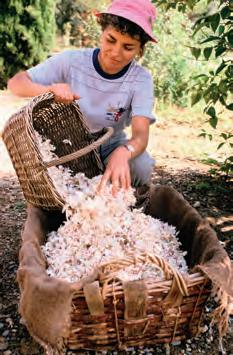
Ambergris, a secretion from whales’ bile ducts, was burned by the ancient Egyptians as incense, and is still valued
hOW dO YOu BecOme a Perfumer?

for its musk fragrance. The vanilla bean was traditionally used by the Aztecs to flavour chocolate. And, on a biblical note, frankincense and myrrh—both of which are resins from Middle Eastern trees—still crop up in numerous perfumes.
Although no one claims that every natural scent in the world has been discovered, scientists don’t expect to find more any time soon. Thanks to synthesising and the ability to manipulate the chemical structures of odour molecules, however, the possibilities for new smells are infinite—and the human nose is thought to only recognise about 10,000 different odours anyway.
There are only about 500 top perfumers in the world, and though some of the big perfume companies offer training courses, entry is very limited. Many perfumers have followed in a parent’s footsteps, while others have had to work their way up from the bottom of fragrance firms, building expertise as they go. Azzi Glasser (left)—who fell in love with perfume after sniffing her mother’s bottles as a child—got an admin job in a mineral company, worked on scented pumice stone, helped secure contracts to supply Boots and The Body Shop, then set up her own perfume company.

But perfumers tend to bracket themselves with writers, painters and playwrights. So creative flair and huge dedication to building up an ultra-sensitive nose are essential. “You have to memorise about 3,000 ingredients,” says Azzi. “I often smell things before I see them and smell people after they’ve gone.”
r oger Hutc H ings/ a lamy (2)
Jasmine flowers being harvested in France
WhO makes Perfumes?

Just a handful of perfumers work independently. The vast majority of new fragrances are produced by some half a dozen multinational fragrance companies, often on behalf of fashion houses or chain stores. As well as Givaudan, there’s Firmenich in Switzerland, Takasago in Japan, Symrise in Germany, International Flavors & Fragrances in New York, and Robertet in Grasse, France.
Between them, they control a global industry worth close to £20bn, and deal with everything from the creation of perfumes costing £500 for a tiny bottle, to the basic fragrances selected for washing powders and air fresheners.
dO Perfumes eVer flOP?
Oh, yes. Hundreds of fragrances are launched every year, then disappear when they fail to capture a market. The most famous flop was Christian Lacroix’s C’est La Vie, launched in 1990 with an alleged £30m worth of backing. It’s not clear whether customers objected to its particular blend of patchouli, peach and raspberry, or the bottle with its blood-vessel-like cap. But they didn’t buy it, and it was quietly withdrawn (though you can still get old stock on the internet, if you really want to).

the future Of fragrance
Personalised perfumes—playing up to the fact that we all experience smells in a different way—are not far off. “We’ve [created] molecules designed to activate specific smell receptors,” says Charles Sell of Givaudan. “And we can see whether or not individuals have these receptors and whether or not they’re activated.”
Cardiff University’s Professor Tim Jacob, an expert on the science of smell, reckons that we could see the 1980s fantasy of Hai Karate aftershave—which supposedly drove women so wild that it came with self-defence instructions—brought to life.
“We know that, for reproductive reasons, people are attracted to the scent of those with different immune systems,” he says. “If we personalise scent, people could use it to enhance their allure to the right members of the opposite sex.” n
89 fe B ru ar Y 20 13 readersd I ges t.c O .uk H emis/ a lam y ; caro/ alamy
THE MAVERICK “springsteen has a voice like a sea lion”
Experts from the arts and philosophy slay a few sacred cows

literAture
James Walton, Reader’s Digest books editor and host of BBC Radio 4’s The Write Stuff
overrated: ian m CeWan
The 1983 Granta magazine of the 20 best young British novelists features a host of names, such as Martin Amis and Pat Barker, who dominate the literary world of today. But, among them, Ian McEwan is the one who now gets most of the attention, prizes and sales. In years to come, I wonder if it’ll be a bit of a mystery as to why.
Amsterdam, his tale of friendship gone bad that won the 1998 Booker Prize, supposedly hinges around a terrific twist, but I didn’t really get it. And the muchraved-about Saturday is essentially the story, focusing on one day, of a rather smug, successful middle-class brain surgeon having a nice life. At the climax, his daughter reads “Dover Beach” to a violent maniac who has broken into the house, and the guy is so moved by the Victorian poetry that he backs off. He’s then knocked out during a scuffle, and the surgeon ends up operating on him. It’s all a bit pat.
McEwan does a perfectly solid job, but his writing lacks the killer punch. Competent, yes. The best novelist we have? Surely not.
Underrated: loUis de berniÈres
Birds Without Wings was the long-awaited follow-up


90 READERSDIGEST.CO.UK FEBRUARY 2013
►
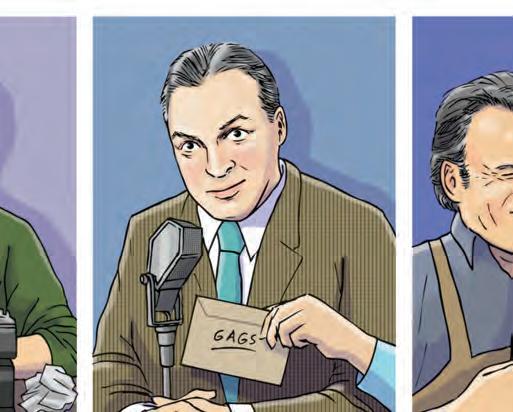



91 FEBRUARY 2013 READERSDIGEST.CO.UK
ILLUSTRATED BY DANIEL MITCHELL
Thinking differently!
to Captain Corelli’s Mandolin , yet never made the same impact. But it’s bigger and more brilliant.

Comedy
Bruce Dessau, London Evening Standard comedy critic
overrated: bob hope
Comedy is the ultimate meritocracy. You simply don’t become a star unless you can make people laugh. But Bob Hope rarely tweaked my funny bone. The trouble is that he didn’t write his own material—he relied on umpteen gagsmiths—and, for me, the best humour has to be self-penned.
U nderrated: m rs brown’s boys I seem to be one of the few critics who has anything nice to say about this BBC1 sitcom. I can’t help laughing at Brendan O’Carroll’s cartoon performance as the eponymous Dublin matriarch, and silly slapstick will always be funny.

m usi C
David Quantick, music critic and comedy writer. His new ebook Sparks is out now
overrated: b r U ce s pr ingsteen
He dresses like a man who works in a DIY superstore, but he’s very, very rich. He pretends to be a man of the people, but he once allegedly fined two staff members for breaking one of his canoes. And he apparently got annoyed when people interpreted Born in the USA as a patriotic American fist-pumping anthem, saying that it was a criticism of the US, when it features the fistpumping chorus, “BORN in the USA!”
So he was having his cake and eating it.
Most of all, I don’t like Bruce Springsteen because his songs are awful. The early ones have terrible poetic images, too, like a bad Bob Dylan—all about “go-cart Mozarts” and “gypsy angels” being “blinded by the light”. Also, he has a silly voice, like a sea lion.
Underrated: the d istractions
A New Wave band who wrote great fast love songs. The story goes that they were signed by Island Records on the same day in 1979 as U2, who then got all the label’s attention. The Distractions fell apart and vanished for 30 years, though they recently made a new record: The End of the Pier. They’re older and wiser, but still very good.

Film
Danny Leigh, co-presenter of BBC1’s Film 2013
overrated: chr istopher n olan He’s a gifted director, but not as gifted as most of the world thinks. The Dark Knight Rises (2012) was very dull, and I found it strange that people talked about Inception (2010) as this mind-expanding experience when, in fact, it was a variation of, “And then I woke up and it was all just a dream.” Although The Dark Knight (2008) was great, there are long, fairly tedious passages even in Nolan’s best films.
Sometimes, people watch a movie, don’t quite get it, and call it pretentious. With Christopher Nolan, people conclude he must be working on some higher plane. I’m just not always sure there’s anything there.
92 readersdigest.co.uk february 2013
◄
Underrated: h en ri- g eo rges
clo Uzot (director)
Le Corbeau (1943), about a poison-penletter-writing campaign in a French village, is one of the most sinister films I’ve ever seen. Quai des Orfèvres (1947) is one of my favourite cop dramas.

PhilosoPh y
A C Grayling, author of The God Argument (£16.99), out next month
overrated: p ostmodernism
This modern movement—whose members have included Jacques Derrida and Michel Foucault—argues that there’s no single “right way” to think about things, and that challenging ideas is an end in itself.
But it’s made people lose sight of the idea that some things might be better than others. That fighting for women’s rights in developing countries, say, is preferable to lazily thinking, Well, their culture is their culture—who are we to criticise? It talks of plurality and diversity, but not commonality, and allows China and some Islamic nations to ignore much of the 1948 UN Universal Declaration of Human Rights.
Underrated: b ertrand rUss ell’s
The PrinciPles of maThe maTic s
It was an introduction to his later work on how logic rests on mathematics, and was a sketch of what became central to modern analytic philosophy.

Art
Sarah Kent, art critic for the theartsdesk.com
overrated: g erhard r i chter
Do you know a sacred cow that needs slaying? Join the debate at facebook.com/ readersdigestuk or email readersletters @readersdigest. co.uk
He’s the top-selling living artist—his “Abstraktes Bild” went for £21m last year—and paints portraits from photos, or does pictures and smears paint over them to produce abstract patterns. His work is liked, I think, because it’s easy to grasp, and you get a lot of verbiage out of the relationship between abstraction and figuration. But it doesn’t challenge you, so, in my opinion, it’s meaningless and banal.
Underrated: s helagh Wakely
A British sculptor, who died in 2011. She was very interested in the passage of time, and made a series of sculptures with cherries placed in wire casings— when the fruit rotted away, only the metal structure remained. Exquisite. n As told to Ellie Rose
reaD er spot/ taking all precautions
While working for Grampian Fire and Rescue Service, I overheard the following exchange: “We must make sure, in the interests of safety, that all cycle paths are clearly marked.” “Shouldn’t we just lock them up?” “Who?” “The psychopaths that you’re talking about.” Submitted by Brian Whyte, Perthshire
93 february 2013 readersdigest.co.uk
My Best Holiday Ever
Travel Special
Readers and well-known travellers share their surprising, spectacular and funny holiday memories by kate
Pettife R
A welcome from A nother world
Josceline Dimbleby, cookery writer
The things I find most inspiring when travelling are unexpected new experiences. Two years ago, my friend Johnny and I came across a Lisu tribe
New Year festival while trekking in northern Burma. There were thousands of Lisus, many of whom had trekked for days from distant mountain villages, and we were the only foreigners. But they greeted us with their traditional greeting, which sounds like “Hwa Hwa”, followed by warm handshakes.
Part of the celebrations involved hundreds of the Lisu dressing in bright costumes and dancing in ►


94 readersdigest.co.uk february 2013


 Young girl in Lisu headdress; (below left) New Year celebrations; and climbing the knife ladder
Young girl in Lisu headdress; (below left) New Year celebrations; and climbing the knife ladder

unison in long, circular lines. Elsewhere, families watched in awe as men scaled high, vertical ladders made of sharp knives in memory of the Ming Dynasty military leader Wang Ji, who trained the Lisu into a physically strong people.
The little girls were the prettiest I have ever seen. One took my hand affectionately while we were watching the climbers—a moment I shall be enriched by forever.
» Orchards in the Oasis: Recipes, Travels & Memories by Josceline Dimbleby is published by Quadrille (£25).
power of nature
Joanna Lee Miller, 33, a full-time mother from Kingston, south-west London
I’ve been lucky enough to have watched the sun rise over the snowy peaks of the Himalayas and the sweeping dunes of the Namibian desert. I’ve admired Zimbabwe’s Victoria Falls, Arizona’s Grand Canyon and Ecuador’s Galápagos Islands. But nothing—nothing—comes close to the mesmerising Iguazú Falls, which I visited in 2006. Straddling the border between Brazil and Argentina, this natural wonder boasts a staggering 250-plus separate cascades, strung out along the Iguazú River for more than a mile. The most impressive of them all is the Garganta del Diablo (Devil’s Throat), best seen from the Argentinian side, where one of the viewing platforms allows you to stand almost on the edge and gaze in awe as a mammoth 1,800 cubic metres of water per second roar over a vast semi-circle of cliff and plunge into the canyon below. Spellbinding.

96
TravelSpecial HARALD SUND/PHOTOGRAPER’S CHOICE/GETTY IMAGES
 Natural wonder of the world: the Iguazú Falls on the Argentina–Brazil border
Natural wonder of the world: the Iguazú Falls on the Argentina–Brazil border
workout with a warrior
Victoria Woodhall, yoga teacher and author
Last winter, I was staying at Sasaab Lodge, a remote hotel in the Samburu region of Kenya, and the staff had organised a “Samburu Olympics”. A group of local warriors had come to challenge us to a bit of spear throwing and club tossing. We Westerners were, of course, painfully unable to match their prowess, so I decided to issue a challenge of my own. How would they fare at the Warrior II yoga pose [a low crouch with both arms and one leg outstretched], which requires considerable strength and stamina?
Samuel, our spotter on a game drive, was a natural. But fellow warrior Onesmas refused to bend his knee. Why? I asked him. “My kikoi [sarong] keeps riding up,” he explained. “I don’t want to show you what’s underneath.”
Vanity may have proved the better part of valour, but the Warrior poses are some of my favourite yoga moves—and when in normal life do you get the opportunity to test them on an actual warrior?
» Everyone Try Yoga (£18.99) by Victoria Woodhall with Jonathan Sattin.

98
TravelSpecial
Under African skies: Victoria and one of the warriors do the Tree pose
PHOTO BY VICTORIA WOODHALL

the subtle souVenir


Lesley Jones, 44, a writer from east London
I have a string of stones, beaded like a necklace on an old shoelace. It isn’t the prettiest piece of jewellery in my collection, but it makes me smile and think of my beloved Aldeburgh. I live in London, so the Suffolk beach is the place I escape to with my husband, Simon and my two children, Hector, 13, and Florrie, nine.
Exactly 99 miles from our front door to the shingle, it’s a place for fun—for cricket and picnics and summer swimming. But more than anything, it’s a place for me and my family to sit happily together, chatting and idly sorting through the pebbles. A stone with a hole through it is the ultimate prize and my children have spent hours in the hunt, with an obsession and focus that not even a PlayStation could inspire.
So I look at my stone necklace and think of the best a British holiday can offer—sunny days, an ice cream from the little kiosk by the boating pond and the sound of happy children.
99 FEBRUARY 2013 READERSDIGEST.CO.UK ►
Beach babes: Hector and Florrie


the humble cooker
Michaela Strachan, Springwatch presenter
My favourite holiday accessory is a cob—a mini cooker that you can barbecue on, as well as use to fry, grill, roast and bake. Not only has it been on a few camping holidays, it’s also been on a road trip to Lesotho in April 2011.
My partner Nick, five-year-old son Ollie and I did this trip through remote areas, so had to take enough food for ten days. We had a travel freezer in the back of the car and the cob came into its own for heating frozen meals and making stir-fries and risottos. On my birthday, we stayed in rondavels (small round huts, pictured above) at Mount Moorosi, surrounded by stunning mountains and little waterfalls. After a walk and a dip in some nearby streams, we came back and baked birthday biscuits. We ate them while watching the glorious sunset!
» Michaela Strachan’s Really Wild Adventures children’s show is on tour from this month. See michaelastrachan.co.uk.
missed opportunity
Christine Armstrong, 38, an advertising executive from York
I’d always wanted to learn to dive, so when I booked a trip to the jungles and islands of Belize, Central America, in February 2004, I took my chance to venture beneath the waves.
When I’d qualified, I signed up to take part in a group dive at the Glover’s Reef atoll. It was heart-soaring. I was transfixed by
little fish and slightly bigger fish, and a turtle I managed to track for a while. I surfaced full of triumph and joined in the hubbub of chatter about what an amazing dive it was. I noticed that even the dive instructor was excited, which struck me as a bit surprising.
It took me a while to realise that we’d had an extraordinary experience.

100
TravelSpecial
R ENE P AUL G O SSELIN (MOUNT MOORO SI)


secret be Aut y spot
Samantha Warwick, 43, a chalet host from Morzine, france
A graveyard isn’t a place you’d normally find me. But there’s a bench in the immaculate, flower-festooned grounds of Grindelwald church in Switzerland that I could sit on for hours on end.
When I say “we”, I mean everyone else. Because while I was mooning over Nemo and his mates on the reef, the others had been looking into the deep. At a whale shark. Whale sharks are the size of a bus, but I’d completely failed to spot it. Still, it’s sometimes what you don’t see that creates the memories.

Divers’ paradise: Glover’s Reef in Belize
The atmosphere is serene, not creepy, even at night when candlelight flickers among the lovingly tended blooms and tombs. Winter snow creates an even quieter, deeper peace.
As for the view…wow! To the right, the Eiger threatens to engulf the chocolate-box village; to the left, the Wetterhorn towers up, with swathes of emerald pasture peppered with cows and goats, their bells tinkling, beneath.
The gravestones tell a story of fearless climbers and guides who lived and died on those mountains. Such is the beauty of that landscape, always changing with the seasons, that I never leave feeling sad, but with my soul restored. ►
101 feb R u a R y 2013 R ea D e RSD ige S t. C o.uk
GLENN VAN DER KNIJFF/LONELY PLANTET/GETTY IMAGES
the dependA ble motor
Charley boorman, co-star, with ewan Mcgregor, of motorcycle documentary Long Way Round
When I’m overseas, my bike—a BMW R 1200 GS Adventurer—is so much more than a means of transport: it’s my home; my freedom. It carries my sleeping bag, tent and all my equipment.
I was a reluctant camper before Long Way Round, but an overnight stop in central Mongolia was a memorable turning point. We’d pitched our tent beside a lake. As the sun set, the lake was turning ten shades of pink and, on the far side of the water, there were 30 wild horses. It was stunningly beautiful, yet we were so far from anywhere, I can’t even tell you where we were. Travelling by bike offers such an incredible sense of freedom. With a full tank of fuel, you can go for 300 miles, wherever the road takes you.

» Charley Boorman’s South African Adventure is on Channel 5 now.
the delicious tr A in journey
Miranda Chada, 38, a research consultant from Marlborough, Wiltshire
The railway guard blew his whistle and we were off, rattling through the tea plantations of Sri Lanka, while sitting down to dinner on a screeching vintage train. It was 2004 and I was on my honeymoon, doing my best not to spill my cocktail or spicy soup over my new husband, Bobby.

The gorgeously restored carriage, which would have previously been used to transport tea from


the cool hilltop plantations down to the hot plains, was all gleaming brass and teak inside. Immaculately suited waiters emerged with course after course, the eclectic menu mixing local curries with European dishes and wines, which seemed appropriate for the train’s colonial heritage.
102
TravelSpecial
All aboard! The Railway Carriage Restaurant, Sri Lanka

Finally, we groaned to halt after delicious sorbets—and the train came to its final stop, too. We hopped off to find ourselves conveniently outside our hotel, the Heritance Tea Factory, near Nuwara

the movement and sound effects, the train is stationary—it sits
served.
secret stash
Aba Eccles, 45, a teacher from Broughton, Hampshire
My husband Simon and I bought a ruined farmhouse near Briançon in the French Alps in 2003, so, with our sons Kit and Robbie, we’ve since found ourselves often leaving Grenoble airport at noon for the two-and-a-half hour drive to spend school holidays at our new home/building project.
Preferring to save our euros for beams of local larch wood and endless tons of lime mortar, we generally brought lunch with us from home, needing to buy only the quintessential crusty baguette in France to complete our mountain picnic. We bought a very un-airport-friendly bread knife from the bakery and then left it hidden up a tree beside our favourite picnic spot. Imagine how smug we felt when, travelling hand-luggage-only the following half term, we discovered that the knife had survived the harsh alpine winter and was waiting to slice our picnic baguettes. Being joyfully reunited with our trusty blade—and I won’t drop even a hint as to where it is—has become an integral part of our family holidays for the last four years...and counting. n

103 february 2013 readersdigest.co.uk
Eliya. But then that’s where we started. Despite
outside the tea factory it once
Free agent: Charley at Port St Johns in South Africa
Yvonne Hamilton (bike)
hOW
tO…
BY LinDA gRAY

1,001 THINGS
EVERYOnE shOULD KnOW
Welcome to the pages that help make life simpler, easier and—we hope—more fun!
How to tell a JoKe

LET’S GET OFF TO A CRACKING START with the funniest joke in the world, voted top of 40,000 entries in a project for the British Science Association. “Two hunters are out in the woods when one of them collapses. He doesn’t seem to be breathing and his eyes are glazed. The other guy whips out his phone and calls the emergency services. He gasps, ‘My friend is dead! What can I do?’ The operator says, ‘Calm down, I can help. First, let’s make sure he’s dead.’ There’s silence, then a shot rings out. Back on the phone, the guy says, ‘OK, now what?’ ”


If your friends aren’t chortling when you tell it, it can’t be the joke—which contains the three vital elements needed for humour, says psychologist Richard Wiseman: it surprises us with a twist; it makes us feel superior; and it relieves anxiety about subjects such as sex or death. So what’s gone wrong?





104
cOMStOcK/GEttY IMAGES readersdigest.co.uk february 2013
You could be trying too hard. “Although you’re giving a performance, it needs to come over as conversation,” says stand-up comedian and lecturer Olly Double, author of Britain Had Talent (£17.99), a history of variety. A hesitant delivery is equally offputting. “If you’re in control, you’ll take the audience with you, even if you pause for effect,” says Double.
Picking the right moment is even more crucial. “There are few situations where jokes are totally inappropriate, but you need to tune your laughter radar or the joke will fall flat,” he warns.
That’s also likely if the audience has heard it all before—a danger with every joke, from shaggy-dog stories to one-liners such as, “Who gives kids a bad name?”*, top of last year’s Edinburgh Fringe. Better to make up your own when inspiration strikes. “Some of the funniest jokes come from the immediate situation, because the people around you are involved and it has meaning for them,” says Double. Then take a tip from Jack Dee and deliver it deadpan, so you won’t lose face if no one laughs.
» If you’re over 50 and fancy yourself as a stand-up, see our competition on p6

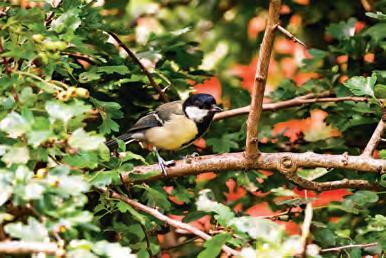
How to plant a BirdFriendly HedGe
HERE’S ONE VALENTINE that’s strictly for the birds
—National Nest Box Week, which starts on February 14. But why not go one better?
By planting a hedgerow in your garden (and now is the perfect time to do it), you’ll provide nesting space, shelter and food for the birds. In return, you’ll have birdsong and flowers all summer, plus a boundary that’s way more attractive than a fence.
It won’t cost much. For £1 each at ashridge trees.co.uk, you can buy 50 RSPB-approved plants, including hawthorn and blackthorn, cherry plum, wild rose, hazel, crab apple and spindleberry. They’ll thrive in almost any soil, and although they’re kind to birds, the thorns deter cats and burglars.
You won’t have to dig deep in the garden, either. Soak the shrubs in a bucket of water while you turn over the soil, then plant them a spade’s head deep, 18 inches apart, in a staggered row. Keep the top of the root slightly proud of the soil, and heel the plants in firmly. Finish with compost to suppress weeds, or plant the hedging in slits through mulch fabric. And that’s it, apart from watering the hedge in the first year and trimming it in winter. Just keep pruning light and leave the look on the wild side, to allow berries and birds to flourish.
Hawthorn will attract Great Tits (pictured) among other birds ►
105 february 2013 readersdigest.co.uk
IDp WILDLIfE cOLLEctION/ALAMY
*Posh and
Becks
How to picK a love toKen
How to deal witH deBt


wHAT’S A CASHSTRAPPED LOVER to do when a dozen roses can cost £50? One perfect rose is a cop-out, as writer Dorothy Parker noted (her preference? One perfect limousine), but for under £50 you can buy a silver bracelet, ring, or pendant with a secret. Buckles, arrows, ivy and snakes are all love symbols, as is a Claddagh ring (two hands and a heart— see left). But if only flowers will do, get a flower dictionary. Most red ones convey love, as do forget-me-nots and pinks, says the Flowers and Plants Association. Or combine with calla lilies (magnificent beauty) or ranunculus (you’re rich in attractions). Skint? Pass up freesias (for friendship) and daffodils (whose tepid meaning is regard) in favour of snowdrops (hope). Then hand your loved one a guide to the language of flowers, so they get the message.

IF THE CHANCELLOR
can’t get to grips with the deficit, what hope is there for rest of us? Quite a lot actually, thanks to debt-advice charities such as StepChange (step change.org; 0800 138 1111).
First, deal with letters, however scary, and keep copies of replies. Then draw up a budget (see moneysavingexpert.com) listing income and all expenditure to see how deeply in the red you are.
l Red hot Maxed-out credit cards show your finances are overheating. Move the balance to a card with a 12-month-plus 0% interest deal, if you can. Otherwise, pay the current minimum charge every month to clear the debt faster, or you could be paying for years. Set up a standing order to avoid trashing your credit-rating if you forget.
l Red flag Avoid payday loans (at 2,000% interest)
and unauthorised overdrafts, which cost even more. Credit rating intact? Ask your bank about short-term overdrafts or bank loans to consolidate debts. If not, approach a credit union that lends at low interest.
l Red card Don’t borrow your way out of a crisis such as unemployment. Ask StepChange about debt-management plans, where you agree a sum to pay and an adviser doles it out to your creditors.
l Red light Stop debt collectors wearing you down: sign up for caller ID, select maximum privacy on Facebook, and reply by letter, not email. Debts to prioritise are council tax, court fines, child maintenance, or the TV licence fee, which could land you in jail.
l Red rag Bailiffs at the door? Hide your car, shut the windows and don’t let them in—they can only force entry for eviction orders, court fines and taxes, says StepChange.
106 readersdigest.co.uk february 2013
GSO IMAGES/GEttY IMAGES 1,001 things

THAT MISLEADING ROBOTIC VOICE
accounts for much of the £203m of accident damage attributed to satnavs each year, according to confused.com.
How to tame a satnav
Outdated maps head the list—even if your satnav is new, roads may have changed since the unit was built, so upload the free update as soon as you can.
brain in gear, and beware attention overload—features such as live traffic news and spoken lane direction can flummox you if the satnav barks out too many instructions at once.
JIM HOLDEN/ALAMY
Satnav needs expensive new maps? Consider a phone or tablet app, which updates automatically for as little as £25. Or stick with what you’ve got because knowing you’re following old guidance can make you more vigilant, says Andrew Howard of the AA.
Then drive by eye rather than by satnav. “It won’t always choose the best route for the conditions,” warns Howard. Keep your
Advertisement

“When drivers had to remember two directions, we noticed a difference in their ability,” says psychologist Polly Dalton of Royal Holloway, University of London, in a recent study.
That won’t happen if the satnav loses signal—check out the map of GPS black spots on confused.com before leaving (especially if heading for High Wycombe, which tops the charts), and take an atlas. Oh, and steer clear of Aberystwyth—threequarters of drivers lose their tempers there, making it the capital of satnav rage.
Did you know that a crocodile’s face is ten times more sensitive than a human’s fingertips?
Find out more amazing facts at the OU Tree of Knowledge readersdigest.co.uk/open-university/ou

107 february 2013 readersdigest.co.uk
►

How to dial a Human
“PRESS HAND TO FOREHEAD AND wEEP” is not an option offered by automated switchboards, though it’s a point many of us reach. As little is more frustrating than being given the runaround by a recording, try these shortcuts next time you’re stuck in a loop.
l Say nothing, do nothing. If you’re lucky, an operator will intervene, but if not, pressing 0, * or # repeatedly may do the trick.
l Google “corporate” plus the company name, or click on gethuman.com/uk to find direct lines for businesses.
l If there’s a number for advertising or sales, ring it—there’s almost always a human at the other end. Then ask to be put through to the department you’re after.
l Swear. Some switchboards (Apple’s is apparently one) are programmed to react to signs of distress such as curses or tears by directing calls to an operator.
l See if there’s an alternative on sayno to0870.com if all you can find is an expensive premium number. That way, at least all you’ll waste is time.
wHat your relationsHip counsellor won’t tell you
l You like to think it’s not about the sex. Everyone tells me that honesty and commitment are more important. But I happen to know that two-thirds of people have either had an affair or been tempted to stray.
l Spoiler alert! EastEnders could drive you apart, because watching TV programmes you don’t like—especially soaps—is a major cause of tension in relationships. As most couples want to relax together, the answer isn’t to leave the room but to compromise—or even switch off the TV and talk.
l wake up early on Thursdays. Thursday morning is the best time of the week to have sex, because it’s when cortisol levels, which stimulate sex hormones, peak.
SOurcES: rELAtE; LONDON ScHOOL Of EcONOMIcS; tHE GOttMAN INStItutE; ScIENtIStS AND pSYcHOLOGIStS IN bOtH tHE uS AND uK
l An affair needn’t lead to divorce. 98% of counsellors know that, with goodwill on both sides, marriages can survive. And, five years on, couples who stay together can be as
108 readersdigest.co.uk february 2013
1,001 things
DON b AYLEY/E+/GE tt Y IMAGES
happy as those who’ve never had problems. l ...but there’s always a payback. If you’re unfaithful, you need to win back trust by giving your spouse your password, your mobile, and more attention than you gave your lover. So if you took your ex for a weekend in Paris, you’ll need to treat your partner to a week in New York.
l A sexual drought can become a desert. Almost one in ten couples aged 45–54 no longer has sex, and often they’re not intimate emotionally either. Spending time together, talking and being affectionate is as important as Viagra.
l Ban “yes, dear”. Not listening is the fault most likely to drive your partner wild, and not in a good way. Snoring is the second most common moan, and—note to women—men complain about it, too.
l Argue politely. Treat your partner like a colleague by listening without interrupting, respecting their views, controlling your
feelings—and agreeing to compromise.
l If you roll your eyes, make up for it. It’s a sign of contempt that can wreck a relationship. Aim for five positive actions, such as hugging or smiling for every grimace, tut, or critical remark.
l Emotional infidelity is often an affair interrupted. Secrecy and attraction are the hallmarks of all affairs, even those that take place online. And, in many cases, it’s only fear of discovery that stops an emotional affair becoming physical.
l Find a soulmate. To connect with a woman, chat face to face. To connect with a man, share an activity and talk side by side, because men may find eye contact challenging.
l Beware the 27-yearitch, because it’s the over-55s who are most tempted to stray.
l The one question to ask after an affair is not what happened but why it happened. Understanding that will help you mend the marriage, or build future relationships if you decide to part.

l Constant rows mean one of four things. (1) Your lives are moving in totally different directions. (2) Addiction is poisoning your relationship. (3) One of you is having an affair. (4) One of you has fallen out of love and is planning to leave.
l Most men have a porn habit. 70% admit to looking at it online. But 50% of women use a vibrator— and one in six has read Fifty Shades of Grey n
109
NED fr ISK/ b LEND IMAGES/GE tt Y IMAGES
MEDICINE WITH MAX PEMBERTON

Playing for time
Sometimes even the most sympathetic doctors have to be cruel to be kind
“It’s Brahms,” Ian said, staring at me intently. I couldn’t hear anything. “What do you mean it’s Brahms?” I asked. Ian doesn’t reply, but instead stares at the floor. “It’s Brahms’ fault. He stops me taking my medication,” he blurted out. “Right,” I said, confused. “And how does he do that? Does he tell you not to take it?” I ventured. Ian looks up, perplexed. “Of course not, he’s been dead since 1897.”
Ian is 28. He’s had schizophrenia since he was 19, and over that period he’s spent nearly as much time in hospital as out. His admissions followed a predictable course: he started on medication; he improved; his symptoms resolved and he was no longer psychotic; he was discharged and within a few weeks he’d stopped taking his medication. Then it was just a countdown until he was readmitted to hospital. “Keep taking the medication and you won’t need to come back,” I said, trying to convince him. “I know, doctor,” he said slowly.
When he played his cello, he lost himself in his own world and forgot his illness


Since qualifying as a doctor i’ve realised that things are rarely black and white. It’s comforting to think that for every ailment there’s a cure, but sadly there’s no magic bullet. It transpired that it was Brahms that was stopping Ian taking his medication. Or rather, his love of Brahms. Ian adored

playing the cello. His brother was a music teacher and his sister a professional musician. Reading through his notes, it was clear that from a young age Ian showed a stunning gift for music. But just after he’d begun his degree in music he was hit by the first symptoms of his illness. He didn’t complete his degree, although he never stopped playing the cello. Until now.
No medication is without potential side effects and, tragically for Ian, the antipsychotic medication that treated the symptoms of his schizophrenia gave him an adverse effect called akathisia. Put simply, this is severe restlessness, and with Ian it manifests itself in a constant,
110 readersdigest.co.uk February 2013
imaGe source/ Getty imaGes
crippling inability to keep his legs still.
When he played his cello, he lost himself in his own world and forgot his illness. It gave him a connection with the rest of his family and a meaning to his life. But the medication meant he couldn’t play the cello any more. That was why he never took it after he was discharged from hospital.
Ian eventually gave in and agreed to take the drugs. He knew it was for the best. But as I signed the prescription, all I could think was that I was taking away the only thing he really loved. It felt like a painfully hollow victory. “I will take them this time. It’s pointless trying to resist,” he said. This should have been music to my ears—but somehow it wasn’t.
max Pemberton
know your medication anti-diabetic drugs
What do they do?
Help the body regulate its blood-sugar level.
hoW do they Work?
They either replace the body’s insulin, or make the cells of the body more sensitive to the insulin the body’s already producing (this group of drugs is called “oral hypoglycaemics”).
Insulin tells the cells to take sugar from the blood to keep the blood-sugar level stable. With diabetes, the pancreas is either not producing enough insulin (Type 1 diabetes) or the body’s cells no longer respond properly to the insulin being made (Type 2).

would normally be released by the pancreas. Insulin is taken via an injection (it’s a protein, so if it were in a tablet, the stomach would digest it and it wouldn’t work). Oral hypoglycaemics come in tablet form. Diabetics often also check their blood-sugar level by pricking their finger and testing the blood with a monitoring device.
hoW do you take them?
It’s very important to take diabetic medications as prescribed. They’re usually taken just before a meal because just after a meal, blood sugar is at its highest and this is when insulin
Side effectS? Taken at the correct dose, insulin has very few side effects. The site of injections can become hard, so people are advised to change regularly where they inject. Oral hypoglycaemics can make people feel sick, dizzy or constipated. This usually improves with time.
common tyPeS
Insulin, metformin, gliclazide. ■
next month: HRT
111 February 2013 readersdigest.co.uk
illustrated
by davidhumphries.com
the year 2010
is a hospital doctor, and the mind Journalist of
HEALTH WITH SUSANNAH HICKLING

food of lurve
Tweaking your diet could be all it takes to give your libido a lift

trY seduCtIve sAffroN. Food scientist and aphrodisiac sceptic Massimo Marcone from the University of Guelph in Canada was shocked to discover that studies maintaining that saffron makes you sexy actually held up to scrutiny. “Not only does saffron appear to have aphrodisiac properties both for men and for women,” he says, “but it also helps with anxiety, insomnia, PMS and insulin resistance.” The spice contains several antioxidants believed to increase sexual desire, which might explain why Cleopatra bathed in it before meeting her lovers, and Romans sprinkled it on newlyweds’ beds.

found that coffee, especially if you don’t drink it regularly, can stimulate the parts of the brain that regulate sexual arousal.
fANCY A Coffee? If you do, it could give you more than a caffeine hit. A 2005 study from Southwestern University, Texas,
BROKen hEART?
Doctors have shown that the condition actually exists. People who’ve had a severe emotional trauma, such as losing a loved one, sometimes develop stress cardiomyopathy, or broken-heart syndrome. It causes a ventricle—or cavity—in the heart to expand, causing chest pain and breathlessness like a heart attack. It mostly a ects women over 50 and, fortunately, nearly always resolves itself. But do get checked out if you have heart symptoms at a time of stress.
WoNders of WAterMeloN. Who would have thought that the eight per cent of watermelon that isn’t water contains a substance that could send you racing to the bedroom? According to research from the University of Texas A&M University, it contains the phytonutrient citrulline, which converts to an amino acid that relaxes blood vessels. So it may help improve blood flow to erectile tissue.
seXY seAfood. The power of oysters to turn you on is almost a cliché. but there’s no
112 readersdigest.co.uk february 2013
STOCKBYTE/GETTY IMAGES
doubt they’re high in zinc, which can trigger a surge in sex hormones, plus they contain two rare amino acids.
Joint AmericanItalian research found that giving these amino acids to rats increased testosterone in the males and progesterone in the females—both hormones are associated with greater sexual activity.
Yes to Yogurt.
Researchers from Massachusetts Institute of Technology found that male mice fed yogurt with probiotics had—if this isn’t too much information—larger testicles. They also produced more offspring, while yogurt-eating females had bigger litters. So by all means slurp yogurt if you want some action on Valentine’s Day, but be careful if your family’s big enough already!
Myth #1 I’m slim everywhere else, so my belly’s not a big deal. I’m afraid that unless you’re very tall or big-boned, if you wear trousers with a waist size over 40 inches, you’ve got double the risk for heart disease of a man the same age with a smaller waist. Fat round the midriff has been tied to high blood pressure, high cholesterol and insulin resistance. These problems together are called metabolic syndrome, which can lead to diabetes.
Myth #2 It’s caused by beer. Not directly. A German study published in 2009 looked at more than 20,000 men and women and found that while knocking back beer made men put on weight, it had no relationship to a big gut. The real cause is a mix of poor eating habits (too much high-fat, highsugar food, and not enough lean proteins and fruit and veg), too little exercise, age and genetics. So it follows that the guy who sits around a lot
quaffing beer and munching snacks is at risk of a beer gut.
Myth #3 We guys are not selfconscious about our tummies. Oh yes you are! A survey from the University of the West of England found that 80 per cent of men talk about their bodies—mostly negative talk about their big gut—and 35 per cent would trade a year of their life for a more streamlined, muscular shape.

Myth #4 sit-ups will soon get rid of my gut. In fact, core training won’t help you beat the bulge. What’s more, if you have a large belly and suddenly start doing ab exercises incorrectly, you could end up pulling muscles. Instead, focus on aerobic exercise and smaller portions. If you lose just five per cent of your body weight gradually, you’ll be better able to keep the weight off, shrink your gut and stay healthy.
» Find out more about men’s health at malehealth.co.uk
113 february 2013 readersdigest.co.uk
►
men’s health ThE TRUTh AbOUT ThAT bEER bElly RUBBERBALL/MIKE KEMP/GETTY IMAGES






The World health Organisation seems to think so. In 2002 it defined obesity as a condition in which “excess body fat has accumulated to the extent that it may have an adverse effect on health, leading to reduced life expectancy and/or increased health problems”.
The definition does contain the qualifier “may”, but the implication is clear: being fat is bad for you and could shorten your life. Every public-health initiative aimed at combating obesity over the last several decades has been built around this assumption. but there are some compelling arguments to the contrary.
For instance, many scientists think excess fat is a perfectly normal adaptation to our modern, rapidly changing environment. In a relatively short time we’ve become computer-dependent, chronically stressed, sleep-deprived and
hOW tO DRIVe bETTER AT NIGhT DOCTOR, DOCTOR IS OBESITY REALLY A DISEASE?
physically inactive mammals surrounded by inexpensive, easily available food. Fat storage is just one of the ways in which we are adapting to our new environment; it’s as much a solution as a problem.
Moreover, the claim that being fat reduces life expectancy is not well supported by the scientific evidence. Most epidemiological studies have shown that people who are overweight or moderately obese live at least as long as normalweight individuals, and sometimes longer.

Obesity may actually be beneficial in some circumstances. In severe illnesses or injuries, it can confer a survival advantage, and, in the elderly, being overweight may protect against osteoporosis and bone fracture. In fact, life expectancy in the West has increased dramatically over the last several decades, precisely when we’ve seen the extraordinary rise in obesity rates. None of this in any way detracts from the obvious fact that obesity can—and in many cases is—an important cause of premature disease and disability. but in some cases, weight gain, up to a certain point, is not a cause for concern and we should be careful about the “medicalisation” of what may be a normal, adaptive response. Dr David ashton of healthier Weight
● Keep all lights and windows clean, both inside and out.
● Make sure you can stop within the area illuminated by your headlights.
● Avoid the glare of oncoming undipped headlights by watching the left edge of the road and using it as a guide.
● have your eyesight
checked at least every two years.
● Get glasses with an anti-reflective (AR) coating. They transmit more light, improving night vision. ■
114
HEALTH FOR MORE ON HEALTH, GO TO READERSDIGEST.CO.UK/HEALTH
SERGE KROUGLIKOFF/STOCKBYTE/GETTY IMAGES





BEAUTY WITH ALICE HART-DAVIS
GLOW FOR IT
Gloomy weather doesn’t have to be reflected in your skin
This time of year is hard going. All the excitement of Christmas long gone, no leaves on the trees for months, and when you look in the mirror…well, unless you’ve snagged a bit of winter sun, your face is unlikely to be looking its best. So what can you do to help it glow again?
Before you resort to the bronzing powder, start with the basics. Get enough sleep, get some exercise, eat healthy food, and massage your face while you’re cleansing it, to improve blood flow through the skin and help lymph drainage.

whether it’s worth the bother. A minute can seem to go on forever but, honestly, it’s really good for your face, and it’s quite therapeutic when you get into the habit.
Gentle exfoliation is a good idea, even if your skin is dry. It removes dead skin cells, which can make skin look a bit dull, and also means that any products you use afterwards will sink in better.


I know it’s a bore, standing there at the mirror making small circles around your face, wondering if you’re doing it right and
PRODUCT OF THE MONTH
Cosset your skin, too. Dig out a face mask (facialist Una Brennan has a lovely one called Neroli Lifting Treatment Mask from her Superfacialist range; £10.99 at Boots), and try using a hydrating serum before your day cream for a moisture boost and to make your skin look more plumped up.


And then, because we all need a bit of help, fake the rest of it. I’m a big fan of light-reflecting primers such as Dior’s Skinflash Primer (£28.50; feelunique.com), which make skin look instantly
Mary Kay TimeWise Repair Lifting Serum (£50; marykay.co.uk; 0800 318 288)
One of the few ranges to be actively aimed at the over-50s, Mary Kay’s new TimeWise Repair line has a great ingredient called Volu-Firm— yes, to boost volume and firmness in one go. It gets the thumbs up from 91 per cent of the women who tested it, so what are you waiting for?



116 READERSDIGEST.CO.UK FEBRUARY 2013
JAMES DARELL/CULTURA/GETTY IMAGES
If you’re feeling brave enough to try something completely new, you can experiment with Lulu’s Miracle Glo Perfecting Glotion (Glotion, £33; brush, £12; timebombco. com). This is a light lotion that you spread across your cheekbones with a brush, after applying your other make-up. It takes a leap of faith and a bit of practice, so that you don’t simply smudge your blusher all over, but it adds a decent glowy radiance without resorting to either shine or glitter, to brighten your outlook for the trek through to spring.
FAST FIX 1
Belatedly, I’ve become a huge fan of hair oils. These don’t, as I feared, make hair heavy and lank, but work wonders to banish frizz and add shine. Two great ones to try: the original Moroccan Oil (from £9 for the sample size; moroccanoil.co.uk) and Charles Worthington’s Miracle Repair Elixir Oil (£14.99; charlesworthington.com).

FAST FIX 2
It may be a statement of the obvious to say that however cold the weather gets here, it’s not as cold as it is in Iceland. But doesn’t it stand to reason that Icelandic skincare might be just the thing for protecting us from wintry weather?
There are several new Icelandic brands to choose
from, most of them impressively high-tech. Try Skyn Iceland Arctic Hydrating Balm (£25 at selected M&S Beauty stores or marks andspencer.com/ beauty), Ice Serum (£60; iceserum.co.uk), Face & Body Salvation (£80; drbragi.com), and Bioe ect (from £55; bioe ect. co.uk).



Alice Hart-Davis is an award-winning beauty journalist who writes regularly for the national press, and is the creator of Good Things skincare. smoother and brighter, and work well on their own as well as under make-up.














Chrissi Ratcli e, 49, from Buckinghamshire, loves Antonia Burrell’s Pure Therapy Facial Serum. “I’ve had oily skin and constant breakouts since my early teens,” says Chrissi, “and I tried everything, without success, until I found Antonia’s skincare range. Within a few weeks of using this light, anti-blemish blend of plant extracts, my skin was clear and smooth for the first time ever. I can’t thank her enough.” (£58.50; antonia burrell.com) ■


117
I JUST LOVE...
consumer With donal macintyre

para-shopping
Forget jumping out of a plane—for true terror, try a trip to the mall
As I prepared to step out of the back of a small plane at 15,000 feet over the sunburnt soil of Florida for my very first parachute jump, the instructor kept shouting, “Relax! Relax harder!” in my ear. There’s nothing relaxing about falling to the ground at 120mph, and when I landed I vowed that I’d find other, more normal, ways to relax…such as shopping.
For many of us, shopping is the new connecting recreation —whereas a great day out was once a trip to the beach or museum, it’s now become a day at the mall.
But it seems that, for a few, shopping induces many of the same fears and anxieties as parachute jumping, as psychologists alight on a new phenomenon known as “relaxation-induced anxiety”.

People with this condition are afraid they won’t relax enough, and experience this anxiety at the moment they achieve
some degree of relaxation. There’s a fear of relaxation itself, and its sufferers, enveloped in anxious and worrisome thoughts, can’t ever truly unwind. A study from the University of Cincinnati found that people may be scared that, when their minds quieten down, unwanted thoughts might enter their heads, and they risk experiencing a loss of control.
Oddly enough, this is very similar to what I experience when my wife goes recreational shopping and takes my credit card for a day out. This syndrome is known as “wanton shopping-spree anxiety”, and sufferers fear unwanted and unexpected credit-card bills ambushing them at the end of the month. Welcome to my world!
118 readersdigest.co.uk february 2013
illustrated by steve caplin
IF YOU DON’T ASK...
Donal answers your questions. Please email queries to excerpts @readers digest. co.uk
QCan I sue if I don’t find love as advertised on online-dating websites?
AOnly if you want to waste your money, is the short answer.
Most of these websites are member-subscription companies, and contain the caveat that the onus is on the member to decide who’s right for them. The dating company, in the small-print terms and conditions, says it’s just providing options.
Donal Macintyre is an investigative journalist and a former presenter of iTV’s London Tonight
On this side of the pond, no one has sued on grounds of disappointment, but one New York man did sue his online members’ site for “humiliation and disappointment”

because his postings got no reply. He was left disappointed again because he failed in his action.
Another woman —also Stateside— unsuccessfully sued a similar company, claiming she was tricked into a relationship with a man who claimed to be the head of a company when in fact he was unemployed.
Site owners usually warn members to treat descriptions with some caution. US sites actually threaten prosecution against people for misrepresentation— claiming to be single when in fact you’re married may get you a $250,000 fine and five years in jail for each offence.
If that was enforced in the country’s bars, then I’m sure the courts would be clogged up! But these cases do offer a guide to the pitfalls of online dating, and highlight the old but everuseful maxim that if it looks too good to be true, it probably is.
MAGIC MOLARS
Every parent knows that the first place to find change for parking is a child’s money box. But having raided that already, I was stumped when the Tooth Fairy visited unexpectedly one night. No £1 coins anywhere, and euros were clearly unacceptable.

So when my little princess awoke, she benefited from my disorganisation when she found a fiver under her pillow. Fortunately, the Tooth Fairy also explained that, as this was the first tooth, and therefore special, it was a bonus payment— after this, the normal rate would be £1 a tooth.
The Tooth Fairy also wrote to me suggesting a secret stash of coins for such emergencies. If only she could manage the rest of my finances! ■
119 FEBRUARY 2013 READERSDIGEST.CO.UK
money With jasmine birtles

HAppy returnS
how to make the most of your isas before the end of the tax year
If you’ve realised you’re making practically nothing on your ISAs, you can switch them quickly and simply. Be careful, though. Follow the rules so that you don’t lose your tax advantage this year.
How do I move money from one ISA to another?

Never simply withdraw your ISA savings as cash and reinvest into a new account because it will be classed as a new investment and taken from your allowance for the current tax year.
“I can give you the money, but you may lose your tax-free advantage”
Can I move money to any ISA?
When you’ve chosen the account you want to move to, ask your new provider for a form and fill in the details of your old accounts. Your new provider will then arrange the transfer, making sure to keep the tax-free status. It should take no more than 15 working days to effect the transfer, thanks to a 2010 Office of Fair Trading ruling.
You can transfer a cash ISA into another cash ISA that allows transfers. You can also move money from a cash ISA into a shares ISA, but you are not allowed to move money from a shares ISA into a cash ISA.
Can I move money into different ISAs or must it all go into one?
You can only split money from ISAs from previous years. You can split it between various providers and ISA types. For example, if you have cash ISAs from
120 readersdigest.co.uk february 2013
previous tax years, ALL of this can be moved to another cash ISA or shares ISA, or it can be split into several cash or shares ISAs. For shares ISAs from previous years, however, you can only transfer to another shares ISA, or split the money between several shares ISAs.
If you have a lot of money to move, you will need to check whether they set a maximum for the amount you are able to transfer in.
If you want to move money from the current tax year (whether it’s in a cash or shares ISA), then you must transfer the whole lot and into only one provider.
If I move my money into one particular ISA, do I have to pay this year’s money into it, too? What if I’ve already used up this year’s allowance?
You don’t have to pay in new money when you move your old ISA—your balance is simply being transferred and doesn’t count towards the current year’s allowance.
the top five phone scams and hoW to avoid them
From anonymous text messages to cheapringtone promotions, phone fraud is rife. Here’s my guide to the top five most common.
1Microsoft Windows viruses
You are called by someone who claims to work for the technical department of Microsoft. The caller says there is a critically harmful virus on your computer and you are advised to visit a fraudulent trouble-shooting website. They then take control of your computer remotely and trick you into installing malware or giving out personal information.

Sky Protect, the broadcaster’s insurance policy. These callers tell you that you should get cover for your Sky service and ask you to verify your bank details—they may even quote your Sky account number, which makes the request seem more legitimate.
3Missed call
2 Sky Protect
Some Sky customers have received calls that claim to be from
When you miss a call from a number you don’t recognise, do you call it back? Most people do, but they’re unaware that they may be redirected to a premium-rate service. The fraud is simple: scammers make “ghost calls” to a list of numbers, but never complete the calls. You will then get a “missed call” message on your phone—but when you ring back,
The annual ISA allowance applies to the amount you put in each year, not your total balance. For example, if you have moved ISAs taken out in previous years, you can still use up the current tax-year allowance in a different account, but do it soon—April 5 is the end of the current tax year. ►
121 february 2013 readersdigest.co.uk
you are charged for the cost of the call.
4 Mobile-phone insurance
After buying a new mobile phone, customers receive hoax calls, apparently from the shop where they bought it. They offer you a mobile-phone insurance deal that’s too good to turn down, but you must accept and pay on the spot or they say the deal will no longer be available to you.
If you accept the offer, you’re asked for bank details, but later discover your phone is not insured at all.
5 BT phone disconnection
BT has warned its customers about scammers posing as BT staff. The so-called “BT representative” calls you to tell you that your line has been disconnected because of an overdue bill.
The scammer “demonstrates” that you have you been disconnected by remaining on the line with the mute button on, preventing you from being able to make calls. You are told that your line will be reconnected if you divulge financial data.
To avoid becoming a victim of phone fraud, you should:
• Never give out bank details over the phone.
• Keep a close eye on your phone bill.
• Warn your elderly relatives, as scammers are more likely to target older or less tech-savvy households.
• Check a company is legitimate by asking for full contact information.
• Forward spam texts to your provider.
• Delete messages and ignore phone calls from unknown numbers.
make money from valentine’s day
Valentine’s Day is becoming increasingly commercial, so why shouldn’t you make some pennies out of it, too? Here are a few ways you can cash in:
• MAke CAkeS. On the day itself, the streets are crowded with couples simply itching to spend money on

“that’ll
122 readersdigest.co.uk february 2013
money
be
tenner, please, mate…”
a
each other. Make heart-shaped cakes and cookies to sell at markets and car-boot sales. You could even put together and sell homemade Valentine’s hampers.
• Sell SIngle red roSeS. If you’re interested in selling roses or other flowers, you’ll find great offers at your local wholesale flower market. Or you can order red roses on InterRose.co.uk for around £2 each. Sell these on Valentine’s night outside restaurants and bars for £4 or £5 each (or more), and you’ll make a profit.
FACt!
this month’s bargain
the most popular mobile ringtone is the Mission Impossible theme tune
• Be A kISSogrAM. You can register online with kissogram agencies and can expect to earn an average of £150 for the day. If you don’t think you’d feel comfortable running around delivering kisses, there’s always the option of becoming a gorillagram. This requires you to dress up in a gorilla suit and do a little dance for your customers. It could be fun!
Get a whopping 30% off all books bought online from leading learning publishers Pearson. Just put the code “QR054P” in at pearsoned. co.uk/bookshop/ voucher.asp, then pick your books and go to the checkout. The code is valid until March 31, 2013.
jargon buster preference shares
the one thing you must do this month...
...is get into lent. Even if you’re not religious, giving up one or more of your vices, at least for a month, is a good discipline and can save you money. It can be time to revisit that New Year’s resolution that has gone by the wayside!
FACt! the “Special” nokia tone for receiving SMS text messages is Morse code for “SMS”
• BaBysit. The easiest way to make money on Valentine’s Day is to offer babysitting services. Every couple in the land will be trying to palm off the kids on February 14. You could advertise in shop windows or in your local newspaper, but the best advertising by far is through word of mouth. Let all your friends and colleagues know you’re available on the night and the customers should come rolling in.
These are a class of shares that usually do not offer voting rights, but do provide a superior type of dividend, paid ahead of dividends to ordinary shareholders. Preference shareholders often also have rather better protection if a company goes into liquidation.
Not only that, but Pancake Day is a great opportunity to eat cheaply and nutritiously. Leftovers in a simple sauce, or condensed soup, make a great filling for pancake wraps. Eat them with salad or veggies and you have a cheap meal for the family once a week. ■
Jasmine Birtles is a personal finance writer and the founder of moneymagpie.com
123
february 2013 readersdigest.co.uk
fAst food With mArk
greenAWAy

a hearty feast
A guest chef shares their favourite quick recipe every month
If you’ve arrived home late after a busy day at work, this is a very quick, simple and healthy—so guilt-free quick—recipe.
You can use wedges of red onion or even diced pumpkin instead of cherry tomatoes, cut small enough so they’ll cook in the same time as the salmon.
Salmon is rich in the fatty acid omega-3, which has several health benefits, particularly for the heart and brain. It is also high in the B vitamins B12 and niacin, which are good for the heart, too.
If you don’t like salmon skin, ask your fishmonger to remove it for you.
Mark Greenaway is the owner of restaurant
Mark Greenaway (restaurantmark greenaway.com) in edinburgh. he will be representing scotland in the new series of Great British Menu on BBC2.
oven-roaSted Salmon
wIth cherrY tomatoeS and coconut rIce (serves 4)
4 x 200g boneless salmon fillets, with skin on 20 cherry tomatoes
2tbs chopped thyme
1tsp sea salt
drizzle of honey
Juice of 1 lemon
1. Pre-heat the oven to 195c/390F/ Gas mark 5.
2. Place the salmon in an oven-proof dish skin side up.
3. cut the tomatoes in half and sprinkle the thyme and sea salt over them.
4. Scatter the tomatoes around the salmon and then squeeze the honey and lemon juice all over the
1 tin coconut milk
1 tin long-grain rice
1 tin water
(use the coconut-milk tin to measure the rice and water.)
1 handful sultanas
Zest of 1 lemon
salmon and the tomatoes.
5. leave the dish in the oven to cook for 15 minutes until the skin of the salmon is nice and crispy.
6. Put all the ingredients for the rice into a heavybased pot and bring to the boil.
7. Place a lid on the pot and simmer for 10 minutes.
8. take the pot off the hob and leave the lid on for 10 more minutes. to serve, fluff up the rice with a fork and place it in the middle of a plate. Place the crispy salmon fillets on top of the rice. arrange the tomatoes around the salmon and pour the honey and lemon juice over them. ■
124 readersdigest.co.uk february 2013
photographed by fabfoodpix
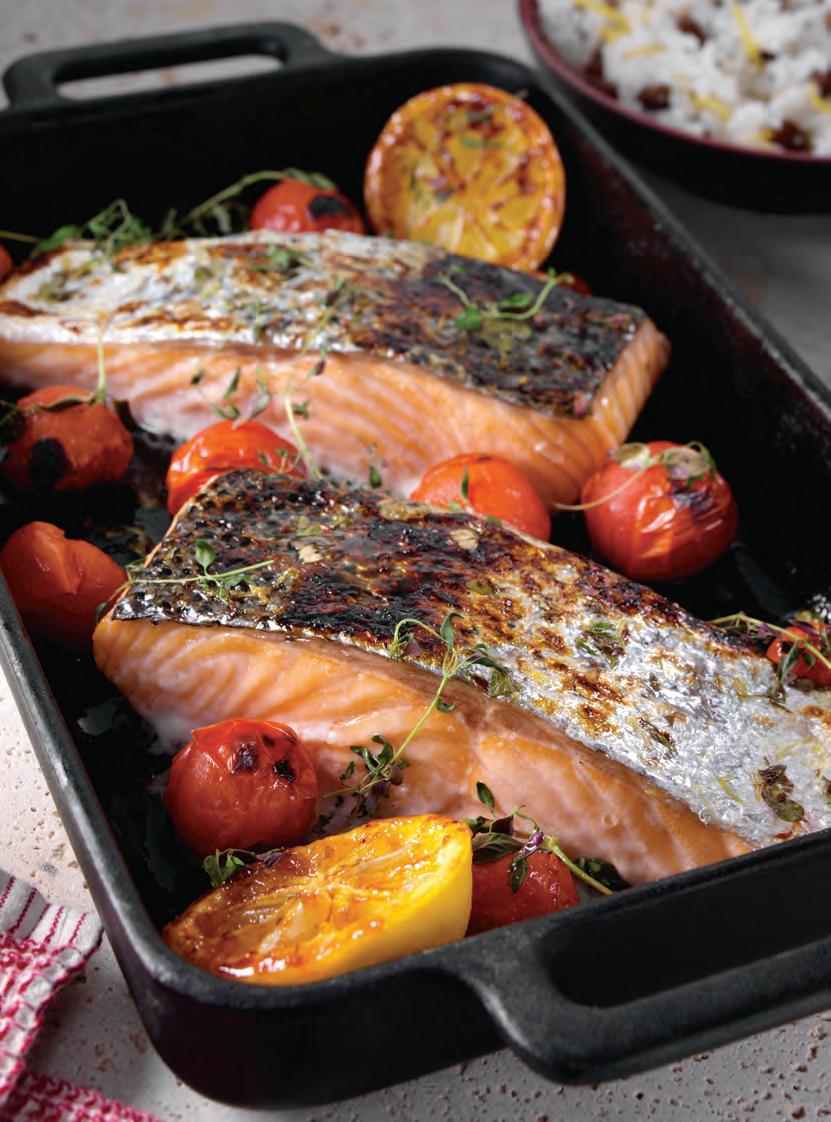
DOUBLE CHOCOLATE EATS & DRINKS WITH NIGEL BARDEN








Chocolate and co ee puddings are tricky to match wines with, but a dark, malty beer with a touch of sweetness is a fine culinary bedfellow. Interestingly, the only country whose brewers religiously include a “black beer” in their range is Japan. But some breweries in the UK even blend chocolate and co ee with dark malted barley—try Young’s Double Chocolate Stout and Meantime Brewing’s Chocolate and Co ee Porters. with a touch of sweetness is a fine culinary
PASS THE SALT
No cook should take umbrage if guests add salt to their food. Aside from health reasons, it’s always better to under-salt —we all have di erent palates, and it’s easier to add more at the table. When cooking with salt, stick to the cheaper o erings since, once diluted, their di erences are indistinguishable. On the table, where you can appreciate the flavour di erences and textures, be as flash as you like.
SWEAT YOUR ONIONS
Many recipes talk of cooking onions until they soften, but to really achieve the sweet, viscous, tender, caramelised base to a dish, onions need to be cooked on a low heat for a long time—45 minutes for 500g is about right. Otherwise you end up with rather bitter carbonised onions, which dictate the flavour rather than adding to it. To hasten the process in an acceptable fashion, chop them small before softening in the microwave prior to transferring them to the pan for the crucial caramelisation.

HEART OF GLASS
Many brewers love us to swig from the bottle as it’s a great way of marketing their product. But showing o the label (or “badge drinking”, as it’s known) doesn’t work for more interesting ales —they benefit from being poured, which opens up the drink by getting air into it, similar to decanting wine. Drinking from a glass also makes it more of an occasion, feels very di erent on the lips, and allows you to enjoy the aromas, which is crucial. So ask for a glass next time! ■




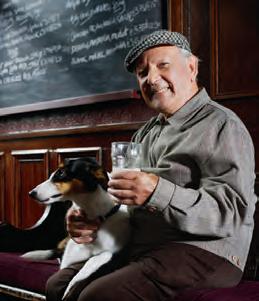
Nigel Barden is the food and drink presenter on Simon Mayo’s show on BBC Radio 2, and chairman of the Great Taste Awards
126 READERSDIGEST.CO.UK FEBRUARY 2013
+
RADIUS/GETTY
Whether you’re new to health insurance or paying a fortune into an existing scheme, Reader’s Digest Financial Services can put your mind at ease with a review designed to find you better cover at a lower price. NDI Healthcare are totally independent and will monitor the whole of the insurance market on your behalf so you feel more secure than ever.
• You’ll save money with cover from just £1.40 a day *
• You’ll enjoy better cover and better quality care for you and your family
• You’ll receive independent advice from an expert – not a salesperson Our independent, FREE review will help you make the best decision for you and your loved ones.

website:

Customer. Vivat Finance Ltd (trading as Reader’s Digest Financial Services, registered in England No.
whose registered office is at 157 Edgware Road, London W2 2HR is an Appointed Representative of NDI Insurance & Reinsurance Brokers Ltd .NDI Insurance & Reinsurance Brokers Ltd is a Company registered in England, Company No. 04347504. Registered office : Park House, 31 Cattle Market Street, Norwich, NR1 3DY, authorised and regulated by the Financial Services Authority. NDI Healthcare is a trading style of NDI Insurance & Reinsurance Brokers Ltd. To find
call: 0800 0094 256 Or visit our
www.readersdigest.co.uk/rdfs
–
to nd you
best health
best price
*Based on a 50 year old non-smoking
07205138)
out more
Yours FREE
independent, professional advice
the
insurance at the

going to seed
These crops offer endless varieties—even in a small space
QI don’t have much space, but I was told you can grow sprouting seed crops on windowsills. What are these, and how do you treat them?
AMany health stores offer some, and seed catalogues list even more. Sprouting crops are a very quick way of getting nutritious food. Some may be eaten raw, others are better cooked. Mustard and cress have long been grown on wet flannel, or tissue on a plate. Sprouted in the warm, moist and dark, the seeds make yellow shoots, which turn green when moved to the light.
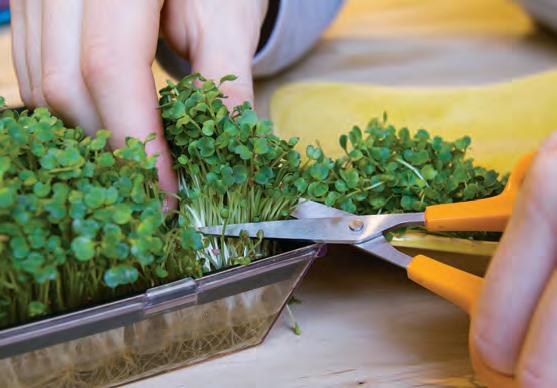
Cutting up rough: cress is cheap and quick to germinate
Almost every plant with an edible leaf makes much tastier smallleaf salads when treated similarly—no soil is needed, just moisture. Rocket, lettuce, endive, chicory, dill, chervil, beetroot, turnip, chard, onion, leeks and chives are all great, as are most herbs (but use only untreated seeds free from fungicide). Commercial
bean sprouts are mung beans, which are usually sold for this purpose. Soak in cold water, keep them permanently warm and dark, and wash them frequently. Use when a couple of inches long.

Q
Why can’t I use garden soil as potting compost for my tomatoes and other things? All the books say you shouldn’t, but everything grows in it when they’re in the ground.
A
Ordinary soil has many drawbacks for potting. It usually has too
128 readersdigest.co.uk february 2013
gardening WiTh bob floWerdeW
PHOTOS LAMONTAGNE/GPL/GETTY IMAGES GARY K. SMITH/ALAMY;
Potting compost trumps garden soil
poor a texture—either too close, which compacts down and drains badly; or too porous and prone to drying out. Soil also has low fertility, may carry pests or diseases, and is full of weed seeds.
You can make an acceptable potting compost from a stack of grass turfs each dusted with garden lime. After six months, when it’s decayed to a fibrous texture, chop and sieve coarsely—never make it too fine. The texture can be improved further by adding leaf mould and grit, and then enriched with pelleted manure or similar. But only fill pots three-quarters with this, then top with bought-in potting compost—this is free of weed seed.
QI have a small front garden, mostly taken up by a parking place—a hardcore base surrounded by narrow borders of poor soil and not much else. How can I brighten this up without doing much hard work? Please don’t say tubs and planters as they’d soon disappear!
AThis is a classic case for rough levelling (maybe laying a geotextile fabric if weeds are a problem) and then a gravel mulch. You might use coarse bark as long as a car no longer parks there (it’s a fire hazard). But to make the area more interesting I’d use sieved crushed concrete with concrete stepping stones for paths—this essentially resembles a limestone scree. Then I’d over-sow the “borders” with thyme seed, and maybe carefully set in some houseleeks in the sunniest spots.
Bob Flowerdew is an organic gardener and a regular on BBC Radio 4’s Gardeners’ Question Time. send your gardening questions to Bob at excerpts@readersdigest.co.uk
bob’S JobS: febrUarY


On bright days
finish any pruning: grapevines first, then berries, apples, currants, pears and finally roses.
If your soil isn’t waterlogged or frozen, you can carefully plant or move almost any hardy shrub, especially fruit trees and bushes.
But wait a few more weeks before planting roses and herbaceous plants. Try a row of extra-early new potatoes under cloches.
Indoors, on sunny windowsills, you could start off all sorts of plants, edibles and ornamentals.
READER’S TIP
Try placing fir cones on the soil surface of pots containing shrubs. They both reduce evaporation and discourage slugs. And they look attractive, too!
Submitted by Luke Jones, Clwyd, Wales ■

» Email your gardening tips and ideas— with photos, if possible—to excerpts@ readersdigest.co.uk. We’ll pay £70 if we use them on this page.
129 FEBRUARY 2013 READERSDIGEST.CO.UK
JONATHAN KITCHEN/DIGITAL VISION/GETTY IMAGES
WILDLIFE WITH MARTIN HUGHES-GAMES

whale of a time
These amazing mammals can crop up in unexpected places
The west coast of Ireland is, surprisingly, one of the best places to go whale watching. Here, along with numerous di erent types of dolphin, locals regularly see minke, fin and humpback—some of the biggest whales on earth.
Colin Barnes (whalewatch withcolinbarnes.com) was so fascinated that he switched from a fisherman to a fulltime whale watcher 12 years ago. Colin knows 20 “Irish” humpbacks individually, each recognisable by the unique blackand-white patterns on the underside of their tail (or “fluke”). Humpbacks are simply vast—around 50-foot long and weighing over 35 tons. But, despite their size, they sometimes “breach”, leaping high out of the water. The males can sing
the fluke of a fin whale breaks the surface off the irish coast
sTUCK oN PreY




for up to 20 minutes at a time, although no one really knows why.
At the end of this month, having fed on sprats and herring all summer, the humpbacks suddenly disappear. Where they go is a mystery, but they have to move to warmer waters to give birth, the Irish seas being far too chilly for a newborn, warm-blooded humpback baby.
On Springwatch, we sometimes get sent videos of sparrowhawks grappling with prey in spectacularly inappropriate places (such as shopping malls), refusing to fly o even when people move right up close. Birds of prey can su er from “sticky feet”, when they appear almost incapable of letting go of what they’ve just caught. This seems most prevalent in young birds—they get so fired up with adrenalin when hunting, the instinct to grasp prey overrides anything else. But then a really hungry adult bird just can’t let go of a meal that might stop them starving. As more garden birds visit feeders this month, they may attract a sparrowhawk. If it sits there with its kill, refusing to budge however close you get, it’s probably got sticky feet!
DUNCAN
USHER/MINDEN
PICTURES/FLPA; JOHN HAWKINS/FLPA; PAUL HOBSON/FLPA (WEASEL)
weasel words

Ever seen a weasel?
It’s a thrilling and rare occurrence, but it’s thought that these tiny hunters are Britain’s commonest carnivore. This month, female weasels start to come into season, and may produce two litters of five or six “kits” in the year. A weasel is considerably smaller than a stoat (which has a black tip to its tail), and its diminutive size lets it follow mice and voles right into their burrows. Once the prey is dispatched (by a fantastically accurate bite to the neck), the weasel often uses its victim’s burrow
as a den and its fur as a cosy bed, which I think is rather gruesome.
Weasels are utterly fearless. I was once chased across a field by one I’d accidentally caught in a live trap. The weasel had taken offence at this, and instead of running away when I let it out, it instantly launched an attack—much to my amazement!
An average weasel is only seven inches long, but will unhesitatingly attack prey many times bigger. They live fast and die young—hardly any survive beyond a year. Apparently they’re easily tamed and make wonderful pets. Yes, please! n
Martin Hughes-Games is a host of BBC2’s Springwatch and Autumnwatch
131


ONLINE WITH MARTHA LANE FOX Never too late
Logging on for the first time is easy—as many silver surfers have discovered
I’m 40 this month, and it’s got me thinking about ageing. Having used the web since the Cretaceous Period, I can’t believe that 10.8 million Brits still don’t—6.9 million of whom are over 65.
Personally, I find it really frustrating. It’s nonsense to think that you can ever be “too old”. I’ve seen thousands of whizzy folks over 90 avidly Skyping grandkids, catching old show tunes on YouTube, and even looking for love. Cheeringly, over-60s are the fastest-growing band of internet daters, and they’re also driving a boom in online giving—churches and the arts are major benefactors.


Only basic online skills are needed to get started
Five years ago, 84-year-old Margaret Rickson was the first to order a repeat prescription online, and half of socialnetwork users over 50 have used the net to reconnect with friends or family.
Getting older isn’t easy—by 2035, 23% of Brits will be 65-plus, but today a third feel lonely. Sadly, the TV is chief companion for around half, with 17% in contact with family, friends and neighbours less than once a week. But it’s not all doom and gloom. I’m not
mad enough to suggest that the web is a magic anti-ageing bullet, but it can ease isolation, keep people in their own homes longer, and studies in the US show it can reduce depression by 20%.
Health secretary Jeremy Hunt wants the UK to be a world leader on health technology, and tele-health plans could transform patient care. Moves to bring vital public services online also make it crucial that older people can use them.
Thankfully, gadgets are increasingly developed with inclusivity in mind, and only basic online skills are needed to get started. The challenge is making it
132 readersdigest.co.uk february 2013
WESTEND61/GETTY IMAGES
happen. One think tank has suggested an army of savvy silver surfers to share their knowhow, and heaps of fab folks and organisations are already making colossal strides to help anyone of any age enjoy the web. Check out ageuk.org.uk or digitalunite.com for starters.
Often, I think a wee nudge from friends or family can do the trick, and with thousands of sites, apps and ideas specifically aimed at older people, there really is something for everyone.
Martha lane Fox is the UK’s digital champion and chairs Go oN UK (go-on.co.uk)
try these
l Gransnet.com is a socialnetworking site for the UK’s four million grandparents— although you don’t need

grandkids to use it. Forums cover everything from politics and product reviews to relationships and tips on good grannying. There’s even a shed for granddads (although they don’t insist they stay in there), and new project Gransnet Local is bringing together a network of community sites to offer offline and
absolute beginner accessibility
online meeting opportunities, support services and events for 80 communities.
l NHS.uk is packed with health info, including exercise tips for older people. Smartphone apps can also monitor health on the go. For remembering medication, try Pill reminder Pro—enter the pill name, dosage, frequency and time of day, and it’ll send a reminder.
l Mylovelyparent.com was started by a chap whose mum wanted him to find her knight in shining armour. Kids create a profile and recommend potential matches. It’s just launched the Older Gent Academy to get dads back on the dating scene, with free membership for the first 1,000. l Silverhairs.com is stuffed with advice, discounts, features and forums for over-50s. It was started 12 years ago by Keith Paterson, 81, to spread the love of the web.
Give an hour of your time to help an internet beginner. Go to go-on.co.uk for more. or to find a taster session near you, call freephone 0800 77 1234
One 94-year-old, helped by Keith, has made new friends and even sold his car online.
Adapting or adjusting devices can make a huge difference if you have a disability. Visit bbc.co.uk/accessibility for lots of facts and how-to guides on optimising accessibility features, or abilitynet.org.uk/myway, which can help customise your computer. Got a smart-phone? Most have top-notch features. Try rnib.org.uk to help you get started. ■
133 february 2013 readersdigest.co.uk
MOTORING WITH CONOR McNICHOLAS

CHEAP AS CHIPS
How the new Sandero managed to slash prices but not quality
With our high streets seeing businesses boarded up or turned into pound shops, savings stagnating, and our pockets feeling rather lighter than before, value for money is everything. Against this background, the world has a new automotive hero—the Dacia Sandero.

The Dacia Sandero saves you about £1,000 on the UK’s previous cheapest car
Dacia is a Romanian car company that was actually originally set up by cult-of-personality communist leader Nicolae Ceauşescu in the 1960s. However, it’s always made rebadged versions of Renault’s most popular cars, and in 1999 it was bought out by Renault to be their new budget brand.
And budget it is. Dacia has already made an impact on these shores with the big SUV Duster (at just £8,995), but now we have the car we’ve really been waiting for. You need to recalibrate your mind to appreciate the Sandero, Britain’s lowest-priced new car—in its most basic form it’s just £5,995, and with a solid trade-in deposit, you could have one for something like £69 a month.

low price? Is it a wobbly bag of tin and plastic? Not at all. The Sandero is a tremendously well-put-together car, with all the solidity you’d expect and all the safety features you need on a modern car. The interior is almost VW-ish in its look and feel, the seats are extremely comfortable, and the driving feel is excellent for the money.

So what do you get for that incredibly
This is a car that’s all about getting what you pay for. Want the basics of A-to-B motoring? You can have that and no more. There are just steel wheels, white paint (no choice on that) and plastic bumpers on the basic Access version. Want a radio, alloy wheels and a choice of colours? Then you have to start paying more. But all cars come with a threeyear or 60,000-mile warranty.
134 READERSDIGEST.CO.UK FEBRUARY 2013
ONE TO BUY ONE TO SPOT
Hyundai Santa Fe (from £22,801)

I drove a lot of cars last year, but the one that’s left the best memory is this—the replacement for Hyundai’s long-standing and respected Santa Fe SUV. This car is brilliant, with dazzling quality, practicality and style. Hyundai should be very proud of this—it comes with a hearty recommendation.


BAD MANNERS
Who irritates you most on the road?
Fiat Panda 4x4 (£13,950)
Fiat’s refreshed little Panda has once again spawned a rugged cousin with a taste for the muddy stu . These cars are reasonably rare, but that’s only because people wanting o -road ability usually go bigger. The Panda 4x4, however, is an impressive package and can embarrass larger cars when the going gets tough.
ONE TO DREAM ABOUT


New Range Rover (from £71,295)
The Range Rover is a legend, and this new one is the latest and greatest in the lineage. There have been four versions of the car since it was first created in 1970, but all of them have been vehicles to make the nation proud. This fourth generation is even more of a luxury barge than ever, with lashings of aluminium, wood and leather, and a stylish new look.
I’m sure you have a list. Well, insurer Admiral have recently released the results of a national survey on the subject.
Fourth most complained about are van drivers, with 34% of those polled saying they find them irritating. Next are cyclists, who annoy 36%. In second place are taxi drivers at 37%. And the most complained about? Elderly motorists on 41%. Even 22% of the over-60s complain about fellow oldies.
As Admiral’s MD says, maybe it’s “because they tend to drive more carefully”. Indeed.
Conor McNicholas is the former editor of BBC Top Gear Magazine
135
TRAVEL WITH KATE PETTIFER

my great escape



of giant mushrooms, some with two or even three “caps”.
“Wow! Just look at that!” The reaction of my fellow travellers summed up the view that faced us. As an artist, I’d long wanted to visit the Fairy Chimneys of Cappadocia in eastern Turkey, and from the first view they proved to be magical.
The landscape is filled with cone-shaped rock formations, dubbed chimneys—up to 100 feet high, and each topped with a large boulder, giving the impression of a surreal world

these cones, forming

Since ancient times, men have tunnelled into these cones, forming homes, churches and even creating cities, both in the larger formations and underground. The area was once the home of a large Christian community. The vividly painted churches in the open-air museum at Göreme town are known by names that reflect their appearance, such as the Snake Church, the Blue Church, the Apple Church and the Buckle Church. Their original doorways are hidden high up the rock face, and can be reached only by rope ladder—this served as a protection first from Romans and then from invading Arabs.
I was overwhelmed by the scale of the exotic scenery: the landscape is so vast, people often take hot-air balloon tours
TURKISH DELIGHT
For group tours, try on the go (020 7371 1113; onthego tours.com) or exodus (0845 287 7588; exodus.co.uk), prices from £990–£1,350pp. exclusive escapes has self-catering holidays in the region (020 8605 3500; exclusiveescapes.co.uk).
136 readersdigest.co.uk february 2013
James Gray from Merseyside was captivated by Cappadocia in Turkey
the Fairy chimneys of cappadocia, as explored by James gray (inset)
to help them take it all in.
It was the most impressive sight on a whistle-stop overland tour that travelled the length of Turkey. There were about 20 of us—including many Australians and Kiwis wanting to see Gallipoli—on an itinerary that also covered Istanbul, Bodrum, Pergamon, Troy, Izmir, Ephesus and Kusadasi.
Art and travel are my passions, so I’m never without my sketchbook. I made some 200 sketches, but I doubt that 1,000 would do justice to Cappadocia.
send us a photo of your favourite holiday, tell us briefly what made it so special, and if we include it on this page we’ll pay you £70. see address on page 4.
travel website of the month

Twice a year, the morning sun pierces the inner temple at abu simbel in egypt and illuminates its sun-god statues. The key dates are February 22 and October 22. Sanctuary Retreats’ Sun Festival Experience will fly you out via Aswan on February 21: stay overnight for an early transfer to the temple; then return to Aswan for a threenight Nile cruise. From £999pp, including flights and cruise (sanctuaryretreats.com).

go now stay now book now

Norwich is hoping to revive the traditional celebration of Valentine’s Eve. In the 1800s, locals would leave anonymous love tokens on each other’s doorsteps on the night of February 13. But rather than encourage unattended packages, the tourist board is encouraging shops in the cathedral quarter and the lanes to install romantic window displays. The full story is at the revamped Bridewell Museum (visitnorwich.co.uk).
Alongside its summer service to Avignon from the UK, Eurostar is trialling direct trains to Lyon and aix-en-provence (left) this spring. So from London St Pancras, you can be in Aix in six-and-a-quarter hours, with return fares from £99 for Lyon and £109 for Avignon or Aix-en-Provence. Services running May 4–June 29 are now booking (eurostar.com)—the perfect excuse for an early-summer break!
smithandfamily.co.uk Boutique-hotels expert Mr & Mrs Smith has launched a sister website focusing on stylish family hotels. It’s still in its infancy, with a focus on UK and short-haul properties for now, but the info is detailed (highchairs, children’s menu, blackout blinds, etc), and all properties are parent-approved and pass the Smith style test. If the collection of gongs attached to mrandmrssmith.com is anything to go by, this is one to watch. ■
137 february 2013 readersdigest.co.uk
thi N gs to do this mo Nth NORFOLK COUNTY COUNCIL ( VALENTINE CAR d)
Experience more on a Travelsphere escorted holiday
Travelsphere escorted holidays offer you the chance to explore more of Europe, journey to far-flung worldwide destinations and cruise along some of the world’s most iconic rivers. Choose from a selection of over 100 holidays to destinations throughout the world including Europe, the USA, Asia, Africa and Australasia.
All flights, transfers and accommodation, many excursions and meals are included in the price along with the services of a knowledgeable Tour Manager.

ExclusivE offEr for rEadEr’s digEsT
cusTomErs save up to £160 per couple
when you book any worldwide holiday and save £80 per couple on any European holiday or river cruise.
For more information and to book call 0800 987 5189
Simply quote RDIGEST, along with your customer number, to receive your discount.
Offer ends 15 Feb 2013.
Calls from landlines to 0800 numbers are free, call charges from mobiles will vary. Prices correct at time of print. This offer cannot be used in conjunction with any other discount or promotion that Page & Moy Travel Group may be running during this period. This offer cannot be used in conjunction with any holiday purchased prior to this promotion. Offer is only applicable to new bookings and ends 15 February 2013. Exclusive savings message of up to £160 per couple is based upon two people travelling (up to £80 per person on worldwide, up to £40 per person on Europe & river cruises). Total protection - all our holidays are ATOL and ABTA protected. Travelsphere is part of the Page & Moy Travel Group.
To book or request a brochure 0800 987 5189 travelsphere.co.uk



£1099 EuroPE 7-DAY
NorTH amErica 8-DAY ESCORTED HOLIDAY FROM
ESCORTED HOLIDAY FROM £449 cHiNa & far EasT 8-DAY ESCORTED HOLIDAY FROM £1399


FEBRUARY FICTION REVIEWED BY A N WILSON EXTRACTS FROM OUR FAVOURITE NEW RELEASES UNDERSTANDING THE HUMAN BODY AND THE MEMOIRS OF A MAFIA PRINCESS BOOKS THAT CHANGED MY LIFE: ALAN RUSBRIDGER
edited by rd books editor JaMes WaLtoN

February fiction
Instructions for a Heatwave
by Maggie O’Farrell (Tinder Press, £18.99)
This superb family drama from the author of the award-winning The Hand That First Held Mine is one of the most impressive novels I’ve read in years. During the famously hot summer of 1976, Robert Riordan, a retired LondonIrish bank clerk, goes out one morning to fetch the newspaper. His wife Gretta (wonderfully well drawn)
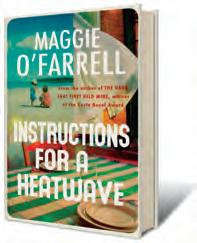
Heartbreak Hotel
by Deborah Moggach
(Chatto & Windus, £14.99)
If you enjoyed the film of Deborah Moggach’s The Best Exotic Marigold Hotel, her new book is in the same vein. Old Buffy, a retired actor with a string of ludicrously unsuccessful marriages, is growing sick of modern London, when out of the blue an old theatrical landlady leaves
classics corner: WUtHeRinG HeiGHts
A N Wilson on families, murderers and aliens
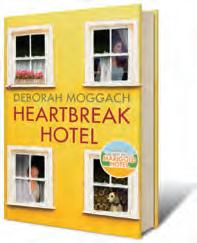
him her Welsh boardinghouse. It’s a cruddy place, but with the help of innumerable offspring and exes, Buffy turns it into a popular refuge for others on the run from London, marriage, life—or all three.
Moggach has been making me chuckle for a generation. But here, as ever, just when you think she’s descending into pure farce, there are genuinely touching moments. It’s this combination of pathos and laugh-out-loud comedy that remains her trademark.
Cathy and Heathcliff may sound over-familiar. But to return to the original
For the month of Valentine’s Day, it seems only right to pick a classic romance—and Emily Brontë’s only novel certainly fits that bill. Thanks to the many screen versions (right, for example)—and Kate Bush—the tale of Cathy and Heathcliff may sound over-familiar. But to return to the original is to be reminded what a wildly strange novel it is: one that has wielded huge influence over romantic fiction ever since, yet never been matched for an intensity that still feels both irresistible and slightly bonkers. expects him back any minute, but he doesn’t return. She alerts her three grown-up children, all of whom are carrying a lot of emotional baggage. Yet, could the people with the real secret be Robert and Gretta? O’Farrell’s plotting is flawless, and there are also many times when you roar with laughter. A joy of a novel.


142 readersdigest.co.uk february 2013
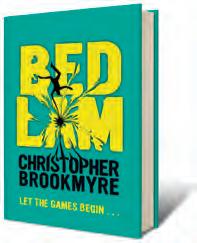
Bedlam
by Christopher Brookmyre (Orbit, £17.99)
You may know Christopher Brookmyre for his best-selling dark comic thrillers. With Bedlam he makes his science-fiction debut. Somewhere out there is the planet Graxis, which combines “advanced robotics with bio-scavenging”, and raids earth by various ingenious means. Ross, for example, works for a Scottish firm making brain-scanning equipment. After testing one scanner, he emerges from the claustrophobic chamber to find that he’s stepped into one of his



favourite video games. In fact, he’s being kidnapped by the Graxis lot…
And with that, Ross is off on a wild intellectual journey, asking the philosophical question, how do we know we aren’t ourselves a computer simulation? The result is totally gripping—by turns extremely frightening and very, very funny, with plenty of jokes about our current fads and a great final twist.
The Carrier
by Sophie Hannah (Hodder, £14.99)
Tim Breary is in prison for killing his wife Francine.
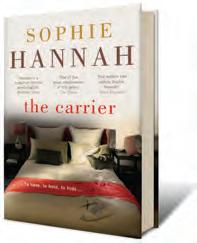
He’s confessed to the murder, but no one, least of all himself, can say why he did it. Meanwhile, Gaby, who’s long been in love with him, is at an airport where her flight is delayed and the passengers have to spend the night in a hotel. She then meets Lauren, a woman behaving hysterically, as if everything depended on her flight— and her luggage—being in order. The two share a room, but when Lauren blurts out something about an innocent man being jailed for the murder of Francine Breary, Gaby begins to suspect that her room-mate isn’t there by accident.
The scenes of stomachturning violence mean that this psychological thriller is not for those who like to curl up with Miss Marple and a packet of Rich Tea biscuits. But it is brilliantly constructed, and it had me, screaming, on the edge of my chair.
QUick QUiZ To mark this month’s paperback publication of Dominic Sandbrook’s Seasons in the Sun—the book behind the highly successful BBC2 series The Seventies—here’s a mixed bag of Seventies questions… Decimal currency was introduced to Britain in 1971. What was the equivalent in old money of 62½p?




BBC2 series 2


3 Which Albanian won the 1979 Nobel Peace Prize? (Clue: it’s someone you’ve heard of.) Answers on p146 ►
In which hit film of 1978 was the main female character Sandy Olsson?
143 february 2013 readersdigest.co.uk
A book that gets under the skin
The story of how we’ve come to understand our own biology is endlessly fascinating, often strange—and by no means over
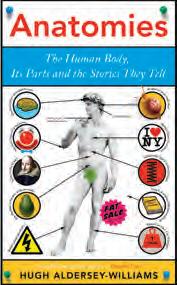
A couple of years ago, Hugh Aldersey-Williams scored a surprise best-seller with Periodic Tales, described by one reviewer as “a 400-page love letter to the chemical elements”. Now, he’s turned to biology—a subject he had to give up at school when he was 13, leaving him, as he puts it, “in charge of a complex biological organism about which I knew next to nothing”. Writing the book clearly changed all that, because Anatomies is bristling with fascinating details about the human body. But it’s a lot more than just an unusually well-written and entertaining biology textbook. With each chapter dedicated to a different body part, Aldersey-Williams traces the equally fascinating story of how the body has been understood—or misunderstood—through the ages. And, of course, that understanding goes much further than merely the scientific, which is why he also explores the various meanings of body parts in art, literature and everyday language. The heart, for example, was seen as the seat of love 3,000 years ago—and, as you’ll notice if you go into a card shop this month, it still is.
Coming bang up to date, the book ends by examining the claims of the “immortalists”, those scientists who believe that the extension of human life, which has been such a startling feature of the past century or so, is set to continue—in fact that the first person who’ll live for 1,000 years is already alive. (Spoiler alert: sadly or not, according to taste, Aldersey-Williams remains extremely sceptical about such claims.)
On the whole, the story he tells is one of progress. Yet there’s plenty we still don’t know—including why, when nature generally gives us exactly what we need, no more and no less, we have two kidneys, testicles and ovaries. Admittedly, the reason for having two hands is a lot less puzzling. But when you think

jack the ripper, and other killer facts from anatomies
One ancient idea that stayed around longer than you might think is that at the moment of death the eye retains the image of the last thing it saw. As late as 1888, the Metropolitan Police carefully photographed the eyes of Mary Jane Kelly, Jack the Ripper’s last victim, in the hope that they’d contain the image of her killer.
In 1905, Henri Languille was executed by guillotine in ►
144 readersdigest.co.uk february 2013
RD RECOMMENDED READ: 1

about it (and needless to say Aldersey-Williams does), there’s something rather strange about them, too…
The most pervasive and divisive conclusion we have drawn from our hands is that one is better than the other. Preferment of the right hand develops very early in life. There is evidence that at 15 weeks’ gestation most of us exhibit a preference for sucking our right thumb.
It clearly disturbs us on some deep level that we possess sets of limbs that appear to be entirely symmetric and yet are generally asymmetric in use. This imbalance is one of the oldest bases for discrimination: between left and right. The Bible repeatedly declares a bias in favour of God’s (and everybody else’s) right hand and against the left. A wide vocabulary exists to label or insult left-handers. English alone has ‘gauche’, ‘sinister’ and ‘cack-handed’, the last being a reference to the custom in predominantly right-handed societies of reserving the left for wiping away faeces or ‘caca’.
Left-handers are in a minority, but the size of the minority is uncertain. Recent studies suggest that up to a third of children would develop as natural left-handers in the absence of external influences. This matches the left- and right-handedness in
Alastair Cook in full-on left-handed action—but would he once have been forced to become a right-hander?
Anatomies: the Human Body, Its Parts and the Stories They Tell by Hugh Aldersey-Williams is published by Penguin Viking on February 7 at £18.99
145 february 2013 readersdigest.co.uk
‘‘ ► stu forster/getty images
Palaeolithic man inferred from the way they shaped their axes. But, in many environments, there is strong social pressure to be right-handed—even left-handers must shake hands with their right, for example—so the observed proportion of left-handers is often much less.
The systematic elimination of left-handedness is not what it used to be, though. Listening one day to the test match commentary, I was surprised to learn that the first time in test history when the first four batsmen were all left-handers was in 2000—since when it has happened 28 times. On the face of it, this is most odd, given that the statistical record goes back to 1877. It could be down to a chance occurrence of gifted left-handed batsmen, but it’s far more likely to be a reflection of the fact that we are now less apt to penalise left-handers in all walks of life.
More insidious pressures remain, however. Almost every one-handed activity, from zipping trousers to using a cash machine, has a cultural bias in favour of right-handers. A visit to Anything Left-Handed, the shop of the Left-Handers Club, hints at the extent of the iniquity. There are products where many people would never suspect a bias—rulers and tape measures (numbered from right to left), corkscrews (turning anti-clockwise for a better purchase), kitchen knives (serrated on the other side).
The discrimination designed into so many everyday objects may be rather more than an inconvenience. In 1989, the psychologist Stanley Coren found that a left-hander was almost twice as likely to have a car accident, and half again as likely to have an accident while using a tool. Coren attributed the cause not to innate clumsiness of southpaws, but to design that is biased to right-handers. He estimated that left-handers’ life expectancy was reduced by eight months in this way.

...AND THE QUICK QUIZ?
1 12s 6d
2 Grease (left)
3 Mother Teresa of Calcutta
Seasons in the Sun: the Battle for Britain, 1974-1979 by Dominic
Sandbrook is published by Penguin on February 28 at £10.99
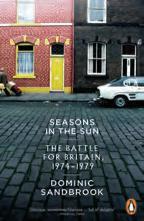
Orléans. A few seconds after his head fell, one Dr Gabriel Beaurieux called his name—and reported that Languille’s eyes “fixed themselves on mine and the pupils focused themselves…
I was dealing with undeniably living eyes which were looking at me”. This fits the current medical understanding that a severed head can remain aware and conscious for several seconds after death.
The average person has around two square metres of skin—about the area of a single bed sheet. Vincent van Gogh famously cut off his left ear. So why in his later selfportraits is it the right ear that’s bandaged? The simple answer is that he painted himself by looking in a mirror.
146 readersdigest.co.uk february 2013
◄ ◄ ’’
My dad the gangster

Did you think that life in the Mafia would be just like it is on TV? If so, it turns out you were right
Karen Gravano has not lived a life for the faint of heart. As the daughter of Sammy “the Bull” Gravano—hitman and underboss for John Gotti, the head of the Gambino crime family in New York—she grew up as a selfconfessed “Mafia princess”. But then in 1991, when she was 19, her dad (much to her disgust) became the highest-ranking mobster ever to testify against his former partners in crime. Karen now had to face the rather trickier business of being the daughter of a “rat”.
Karen writes about all of this—and the no less astonishing events that followed—with appealing, if often hair-raising, candour. In particular, fans of Mafia films and TV shows will hugely enjoy seeing how perfectly the reality seems to match the fiction. Here, for example, is just a flavour of the way her childhood combined the normal, the sinister and the almost comically stereotyped—starting at the local “social club” (ie, Mob hangout) where she’d go with her father at weekends.
The club looked like a big kitchen, with tables and chairs around the room and a few pictures, mostly of Italy, on the walls. Guys would be playing cards and drinking coffee. There were no women around, ever. An older man named ‘Toddo’ was always nicely dressed in slacks and a sweater, sporting a fancy watch and a pinky ring.
‘Go say hello to Uncle Toddo,’ my father would instruct, and I’d have to go over and hug and kiss him. ‘How you doing, kiddo?’ he’d ask, patting me on the head and sticking a 20-dollar bill in my pocket. Obviously, I didn’t know that Toddo was Salvatore ‘Toddo’ Aurello, a capo in the Gambino crime family. I just thought Dad respected him more because he was older. It wasn’t until I was 12 that I knew for certain that my father was a gangster...
I remember sitting around Aunt Fran’s dining table when Dad started telling everybody about this guy named Frank Fiala.

Karen Gravano now features in the American reality TV show Mob Wives. Her father is back in jail for drugs offences and not eligible for release until 2019, when he’ll be 74
147 february 2013 readersdigest.co.uk
RD RECOMMENDED READ: 2
‘‘ ►
He said the guy was ‘nuts’. I knew Frank wanted to buy The Plaza Suite, my father’s most successful nightclub. For a time, Dad was there practically every night, but with his construction business demanding more time, he was looking to unload the place.
Frank offered my father a million dollars. Dad had accepted, but I think he was starting to have second thoughts. A few days later, he didn’t show up for dinner. I’d been waiting for him so I could ask if my best friend, Toniann, could sleep over. Mom said I needed Dad’s permission.
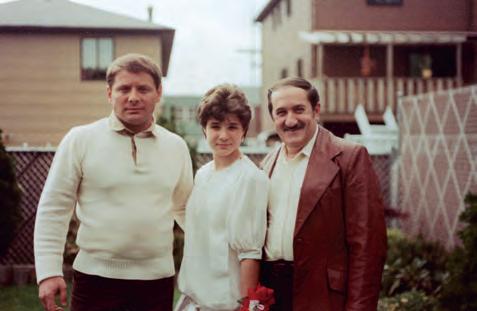
Keeping the faith: dad
We were playing in Toniann’s front yard when Uncle Eddie’s car screeched into our driveway. Dad jumped out and ran into our house, and I ran in after him. The bedroom door was shut. The moment I cracked it open, Dad quickly turned his back, but not before I saw him jam a revolver into the waistband of his jeans. After a long pause, I finally said, ‘I was just going to ask if I could have a sleepover with…’
Dad quickly turned his back, but not before I saw him jam a revolver into his jeans
He interrupted, ‘No, you can’t!’ He untucked his T-shirt and turned around. ‘Not tonight. You can have one over the weekend. And I can’t talk about this right now. I gotta go.’ He grabbed a pair of black leather gloves and brushed by me. I called after him, ‘Why do you need the gloves? It’s the middle of the summer.’
He slowly came back up the stairs, bent down, and kissed me on the forehead. ‘I promise you can have a sleepover before we leave for the farm next week.’ He kissed me again, and headed out the door.
The following morning, the headline in the newspaper on our kitchen table said: Murder Outside The Plaza Suite. Dad was in the kitchen acting normal. I didn’t have time to read it all, but I noticed the victim was Frank Fiala. I stopped reading the minute my father sat down. Neither of us said a word.
Sammy, Karen and her grandfather on the day of her Confirmation
Mob Daughter: the Mafia, Sammy “the Bull” Gravano and Me! by Karen Gravano with Lisa Pulitzer is published by Summersdale on February 4 at £8.99
148 readersdigest.co.uk february 2013
’’
◄
Debra g ravano

Books that Changed my Life
Maggie O’Farrell is an author from Northern Ireland whose novels include After You’d Gone and The Hand That First Held Mine, winner of the 2010 Costa Novel Award. Her latest book Instructions for a Heatwave* (£18.99) is out on February 28.

Jane Eyre by Charlotte Brontë
This is the most perfect book ever written. The plot is faultless and every sentence has been thought through in such a way that, even as writer prone to wondering what I might have done differently, there isn’t a single thing I’d change. When I first read it, aged 13, I was swept away by the incredible story. As an older teenager coming to it again, it was Jane’s indomitable spirit that appealed. Although feminism has come a long way, it’s not a bad thing for girls to realise they’re going to need real pluck to fight their battles. And when I studied the book in detail at university, I came to appreciate Charlotte Brontë’s technical brilliance, too. Jane Eyre is a heroine for every age.
The Yellow Wallpaper
by Charlotte Perkins Gilman
Locked away in a room by her doctor husband, the narrator, with her “temporary nervous depression”, is forbidden to work and urged to rest. Aged 17, this struck me as a horrendous state—I’d always
As told to Caroline Hutton
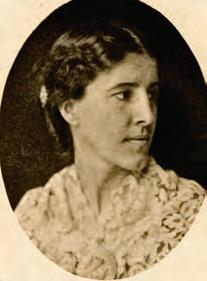
Earthly Powers
by Anthony Burgess
My friend Will gave this to me and said, “It’s my favourite book, and I think you’ll love it too.” From the unbelievably good first line— “It was the afternoon of my 81st birthday, and I was in bed

with my catamite when Ali announced that the archbishop had come to see me”—onwards, I was gripped. I rang Will in the middle of the night from my holiday in Spain to tell him that he was absolutely right. It was during that conversation that I realised, in an eureka moment, that he was the person I was supposed to be with. Now we’re married with three young children.
had the urge to write, and couldn’t imagine a way this could be taken from me. The power of this terrifying story in urgent, clean prose at only 6,000 words long, is incredible. I remember being amazed at being back in my own life when I’d finished it. ■
149
*See A N Wilson’s review on page 142




















152 readersdigest.co.uk february 2013 ACROSS 1 Literary composition (5) 4 Hostile to (7) 11 Place of refuge from pursuers (4,5) 12 Large city on the Nile (5) 13 Consumes (4) 14 Flock of wild geese (5) 15 Man-made god (4) 1 8 Ugly sight (7) 19 Complained (6) 22 Book published once a year (6) 24 Abate, die down (7) 2 8 Wisdom, knowledge (4) 2 9 As sociation of tradesmen (5) 30 Floating bed (4) 33 Softly, in music (5) 3 4 Name given to the region on the opposite side of the world (9) 35 Cut off from (7) 36 Accomplished (5) DOWN 2 Plaything made of fabric (4,3)
Across: 1 Essay 4 Against 11 Safe house 12 Cairo 13 Eats 14 Skein 15 Idol 18 Eyesore 19 Whined 22 Annual 24 Subside 28 Lore 29 Guild 30 Lilo 33 Piano 34 Antipodes 35 Isolate 36 Adept Down: 2 Soft toy 3 Ache 5 Gaelic 6 Itch 7 Swindon 8 Essex 9 Quakers 10 Collide 16 Asian 17 Whisk 20 Gallops 21 Quality 23 Normans 25 Dried up 26 Au fait 27 Goose 31 Jowl 32 Sped 3 Prolonged pain (4) 5 Celtic language spoken in Ireland and Scotland (6) 6 Irritation of the skin (4) 7 Wiltshire town, important railway centre (7) 8 Colchester’s county (5) 9 Society of Friends members (7) 1 0 Me et head on (7) 1 6 From an eastern continent (5) 17 Beat (eggs) (5) 20 Rides fast on a horse (7) 21 Trait, characteristic (7) 2 3 French-speaking medieval conquerors (7) 25 Forgot your lines (5,2) 26 Well acquainted (with) (2,4) 27 Female gander (5) 3 1 Flabby cheek (4) 32 Went quickly (4)
Test-Your-Knowledge Crossword
* Entry is open only to residents of the UK, Channel Islands, Isle of Man and Republic of Ireland aged 18 or over. It is not open to employees of Vivat Direct Limited (t/a Reader’s Digest), its subsidiary companies and all other persons associated with the competition.


1. Noughts and crosses
Put a nought (O) or a cross (X) in each cell so that there are no lines of three (OOOs or XXXs) in any direction.
3. Pathfinder
Beginning with the highlighted letter, follow a continuous path to find 14 types of soup. The trail passes through each and every letter once and may twist up, down or sideways but never diagonally.

Teatime Puzzles
2. Suko Place the numbers 1 to 9 in the spaces, so that the number in each circle is equal to the sum of the four surrounding spaces, and each colour total is correct.




£50 prize question (answer will be published in the March issue)
Wordladder Change one letter at a time (but not the position of any letter) to make a new word—and move from the word at the top of the ladder to the word at the bottom using the exact number of rungs provided.

The first correct answer we pick on January 31 wins £50!* Email excerpts@ readersdigest.co.uk
Answer to January’s prize question:
One solution is: Dent, bent, beat, belt, bolt, holt, hole
And the £50 goes to… Joyce Shotter from Southampton
153 FEBRUARY 2013 READERSDIGEST.CO.UK
1 2 3 THIs MonTH’s AnswErs
Laugh!

WIN £70 FOR EVERY READER’S JOKE WE PUBLISH. EMAIL EXCERPTS@ READERSDIGEST.CO.UK OR GO TO FACEBOOK.COM/READERSDIGESTUK




¶ While attending a marriage seminar dealing with communication, Colin and his wife Rita listened to the instructor.
“It’s essential that husbands and wives know the things that are important to each other,” he said. Then the instructor addressed the men, saying, “For example, can you name your wife’s favourite flower?”
Colin, smiling and looking a little nervous, leaned over, touched his wife’s arm gently and whispered, “It’s self-raising, isn’t it, dear?”
Grahame Jones, London
¶ I was reading a book to my son. “What colour is this?” I asked, holding the page aloft and pointing.
“Red,” he replied.
“What colour is this?” I asked.
“Blue,” he replied.
“And what colour is this?” I asked.
He said, “Look, dad, I haven’t got time for this. Learn the colours of the rainbow yourself!” Seen on the internet


“I have the feeling they may be cowboys…”

¶ NASA DECIDED TO SEND A SHUTTLE INTO SPACE
with two monkeys and an astronaut on board. After months of training, they placed all three in the shuttle and prepared for launch.
nasa’s HQ announced, “This is Mission Control to Monkey One. Do your stuff.” The first monkey began frantically typing and the shuttle took off.
Two hours later came the message, “This is Mission Control to Monkey Two. Do your stuff.”
The second monkey started typing like mad and the shuttle separated from the empty fuel tanks.
Another two hours later, nasa announced, “This is Mission Control to astronaut...”
At this, the astronaut shouted, “I know, I know—feed the monkeys and don’t touch anything.”
Seen at jokes.com
154 READERSDIGEST.CO.UK FEBRUARY 2013
¶ I went to a shop that said “Celery sticks”. I tried it though, and it didn’t.
Terence Houghton, Nottingham
¶ A woman walked with her young child to school. When she got there, she heard the teacher whisper to another, “That child looks like a dog!”
Angry, the woman told the teacher they were going to
By learning history, we learn that we never learn from history
Seen on the internet
report her to the headmaster. As the woman and her child entered his office, he said, “Sorry, madam. Did you not notice the sign outside saying ‘no pets allowed?’ ”
Iona Tian, Kingston
¶ I just walked by an old man saying, “One, three, five, seven, nine...one, three, five, seven, nine...” I thought, How odd.
Rick Hendon, Denbighshire
All cats are left-handed. That’s why you never see them using scissors
Seen on the internet
the trouble With February

Award-winning comedian Josh Widdicombe is five foot 6.5 inches tall, and his favourite TV show is The Simpsons. Each month, he’ll be letting us know just what exactly his problem is.
Let’s start with some positivity: Valentine’s Day gets a bad rap these days. If you’ve forgotten to book a table and you’re building up to telling your partner that they’re spending the evening at Pizza Hut, that isn’t my fault.
No, the real disappointment of February is the other big mark in the calendar—Pancake Day. Pick your team: love or pancakes?
The coming together of two people in adoration...or the coming together of eggs and flour in a pan? The pancake—a food I’ll reject as a breakfast for the rest of the year, yet that I am now expected to choose for dinner? I munch through, wondering why the early Christians didn’t choose to fill up before 40 days of fasting with something more exciting, like a burrito.
And, of course, the highlight of any Pancake Day: the toss.
Though I would point out that if the highlight of eating your meal is the moment it almost falls on the floor, perhaps it isn’t the culinary treat people claim.
“How’s your pizza?”
“The best bit was when it nearly landed under my chair.”
by Josh WiddiCombe

Not a conversation you hear very often. Unless you’ve forgotten to book a table on Valentine’s Day.
155 FEBRUARY 2013 READERSDIGEST.CO.UK ANDY HOLLINGWORTH
►
mixed metaphors seen on the internet
How is it that grannies are always able to dispense wisdom in the form of perfect aphorisms, but the rest of us muck it up? Check out these clangers, seen at therussler.com
Let’s rattle some feathers
▪ He’s not the brightest tool in the box
This is the problem we’ve been wringing our hair over
▪ There’s light at the end of this rainbow
When you boil it down to its nuts and bolts...
▪ As much fun as shooting monkeys in a barrel
Button your seat belts!
▪ Do you follow where I’m coming from?
My mind is an open slate
▪ There’s no use beating him over the head with a dead horse
Take the bull by the horns and run with it
▪ We’ll burn that bridge when we come to it
What a dirty trap!
▪ Without fear of hesitation You could have blown me over with a feather
▪ I’m just talking out loud
She attacked it with open arms

strange beasts


Are these animals imitating people, or the other way around? Seen at buzzfeed.com
▪ There wasn’t enough room to skin a cat
The beer flowed like wine
▪ You can lead a horse to water, but you can’t teach it old tricks
A penny saved is worth two in the bush
Dropped any clangers recently? Or perhaps you’ve heard one?
Let us know! Tweet
@rdigest or send an email to excerpts@ readersdigest.co.uk


156 readersdigest.co.uk february 2013
¶ Life isn’t short. It’s the longest thing you do! Seen on 9gag.com
¶ Q: What postcode does Bond live in?
A: W7.
Comedian Bec Hill
¶ I went up to the airport information desk. I said, “How many airports are there in the world?”
Comedian Jimmy Carr
¶ “Don’t sweat the small stuff.” What, like water and salt molecules? That’s exactly what you should be sweating. Sweating big stuff is bad.
Comedian Matt Rudge
¶ Apparently, my ex has been making fun of me for living at home. But I swear that’s where everyone lives.
Comedian Adam Hess
¶ In the future, Who Do You Think You Are? will just be some bloke Facebook-stalking for 20 minutes then crying in a hovercraft bathroom.
Comedian Joe Lycett ST
60-Second Stand-Up
Ladies and gentlemen, please welcome Kerry Godliman
Favourite one-liner?
Steve Wright: “Everywhere is walking distance if you have the time”
best bit oF your oWn material? I have a piece at the moment about planned engineering works that I really like. It’s a play on words and includes two engineers having a conversation about whether they should do some spontaneous engineering works.

Kerry stars with Ricky Gervais in Derek, on Channel 4 this month
Funniest thing that’s happened to you? At my first professional audition, not long after I’d left college, I was very nervous and excited. When I left, I didn’t know quite what the etiquette was. Do you shake hands? Do you take the script with you? I was completely out of my comfort zone. And then I said, “Thank you so much,” and walked into a cupboard. I had to come out and say, “Sorry, wrong door! Bye!”
Favourite tv shoW? I love [BBC Two sitcom] The Trip. It’s that lovely, weird haze of truth and fiction [Rob Brydon and Steve Coogan go on a journey to review six restaurants]. It features the real staff who work in the restaurants. The wit and dialogue is so sharp and the cinematography is amazing.

best heCkle you’ve ever reCeived?
Years ago at the edinburgh Festival, a man lifted his kilt. That was a visual heckle I couldn’t recover from.
Finally, Who’s your Comedy inspiration? Woody Allen. His work ethic is astounding and he’s so consistently focused. n
157 february 2013 readersdigest.co.uk
eve u LLATHOR ne
Beat the Cartoonist!
WIN £100 AND A SIGNED ILLUSTRATION
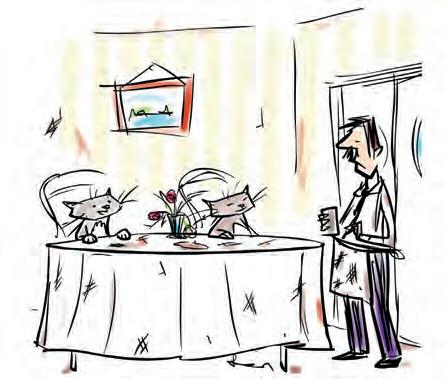
Think of a witty caption for this picture and you could beat the experts at their own game. The three best suggestions will be posted on our website in mid-February alongside an anonymous caption from our professional cartoonist. Visitors can choose their favourite—and if your entry gets the most votes, you’ll receive £100 and a framed copy of the drawing. Submit to captions@readersdigest.co.uk or the address on page 4 by February 8. Enter and vote online at readersdigest.co.uk/caption. We’ll announce the winner in our April issue. ■
IN NEXT MONTH’S ISSUE…
Alfie Boe shares his favourite memories
DECEMBER’S WINNER



The tussle between the cartoonists and our readers continues apace, with Sandra Flett gaining the upper hand this month—her caption, “This minimalist living is getting beyond a joke now!”, was comfortably favoured over cartoonist Peter King’s, “When you said, ‘Let’s sell up and move to the country’...” The battle rages on.
SCOREBOARD READERS 7 CARTOONISTS 5


• Inside the mind of a killer
• Health: ten weird symptoms you’ve never even heard of (until now)
• What Your MP won’t tell you
PLUS It’s our birthday! We’ll be 75 next month— and we’re still going strong
158 Follow us at twitter.com/rdigest. Like us at facebook com/readersdigestuk
PAUL MITCHELL
EQUITY RELEASE WHY IT WAS RIGHT FOR ME
John Mitchell, a Reader’s Digest member and LGV driver from Essex, had been considering equity release for a while. He saw an advert from our expert equity release partners, Equity Release Assured, in one of our magazines last year. He decided to give them a call to see if they could help him.
At 65 I’m still working full time and the hours are not your standard 9-5. ERA did everything over the phone which was perfect for me. If I ever had any questions I could ring my adviser directly, so I never had any worries. The process was smooth from start to finish and I was updated all the way through by my adviser. I never felt pushed into making a decision; I was just given the facts and left to make my own choice.
Peace of mind
I released £25,000 to spend on strengthening the foundations of the porch to my house. It’s built on clay and had started to subside. It’s been a great weight off my mind and thanks to equity release, I feel safe in my home again. ERA was the perfect choice for me.
JOHN MITCHELL, ESSEX



If, like John, you are aged over 55, a homeowner, and are interested in finding out more about equity release and how it could help you this year. Then call our partners at Equity Release Assured today to arrange your FREE consultation, or to request your FREE informative guide in the post on:
0808
252
9092
Their expert advisers will also explain to you how equity release may affect your entitlement to state benefits.
Lines are open Mon-Fri 9am-5.30pm.
This is an equity release plan. To understand the features and risks, ask for a personalised illustration. Equity Release Assured’s typical fee is 1.5% of the amount released, payable on completion of a plan.

in partnership with

‘‘ ‘‘




























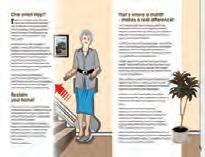












































































































































































































































































































































































 Young girl in Lisu headdress; (below left) New Year celebrations; and climbing the knife ladder
Young girl in Lisu headdress; (below left) New Year celebrations; and climbing the knife ladder


 Natural wonder of the world: the Iguazú Falls on the Argentina–Brazil border
Natural wonder of the world: the Iguazú Falls on the Argentina–Brazil border
















































































































































































































































